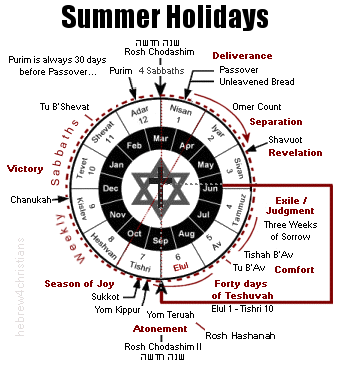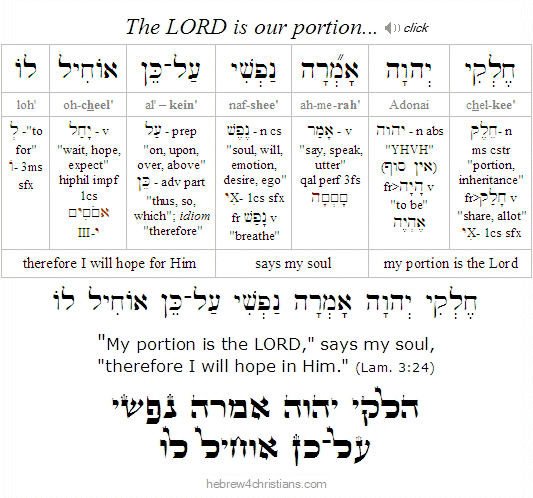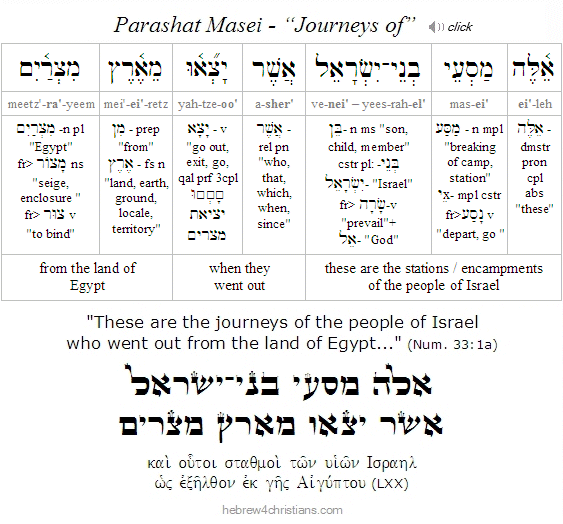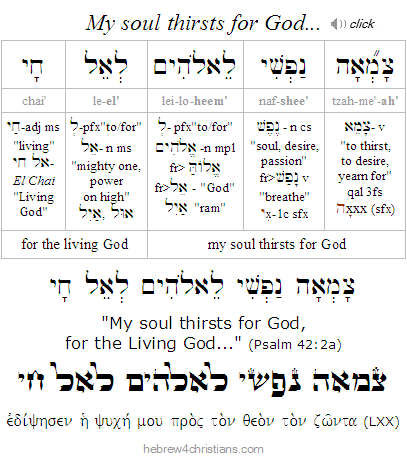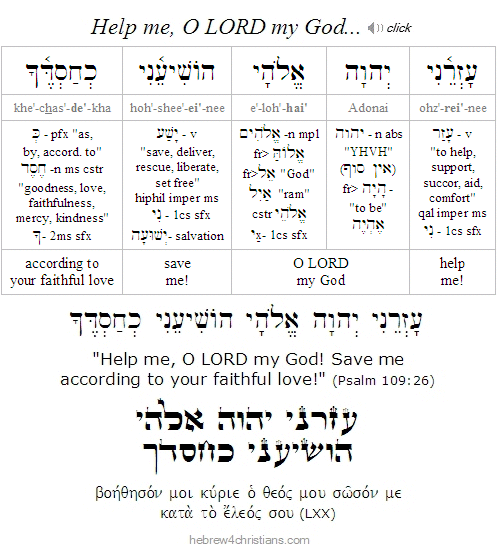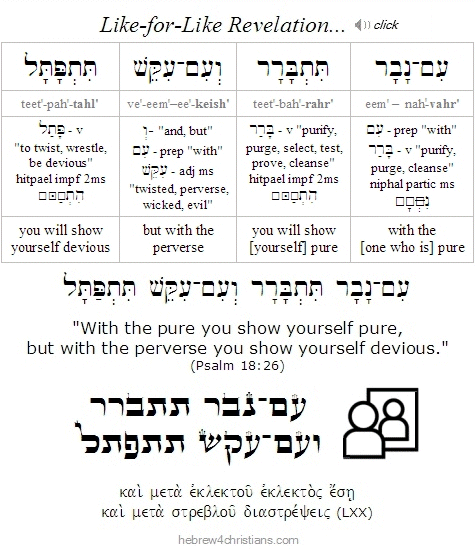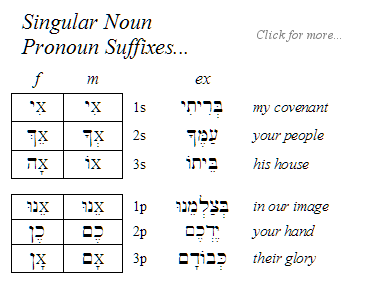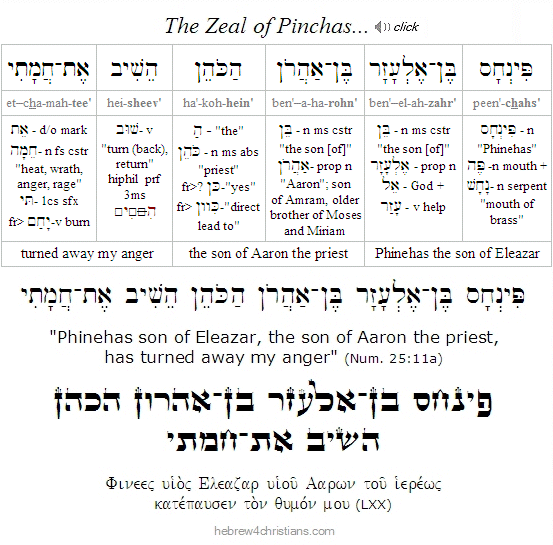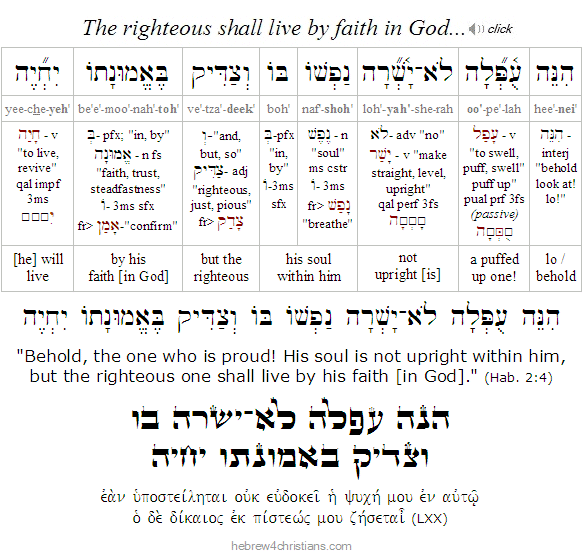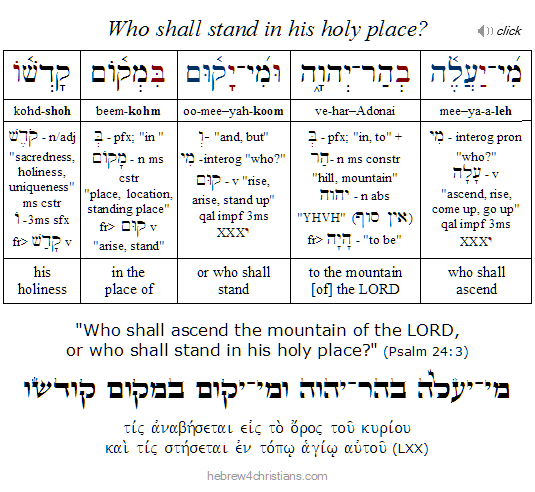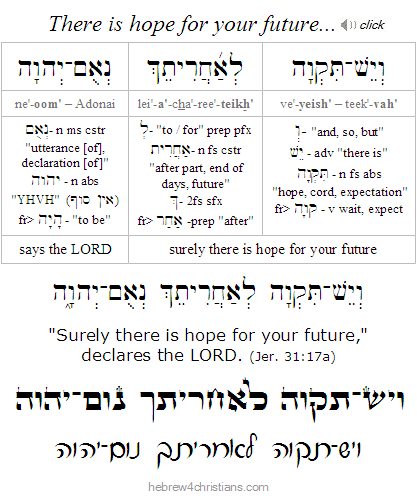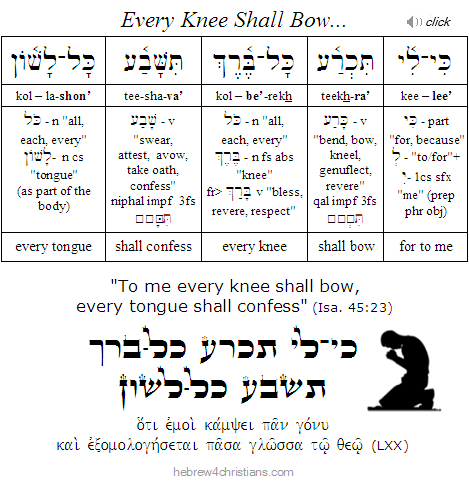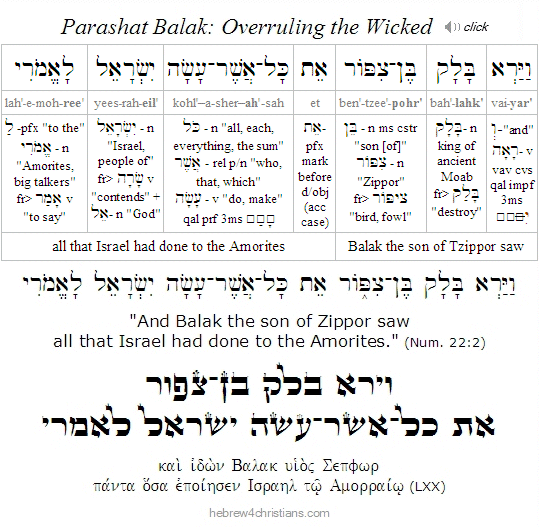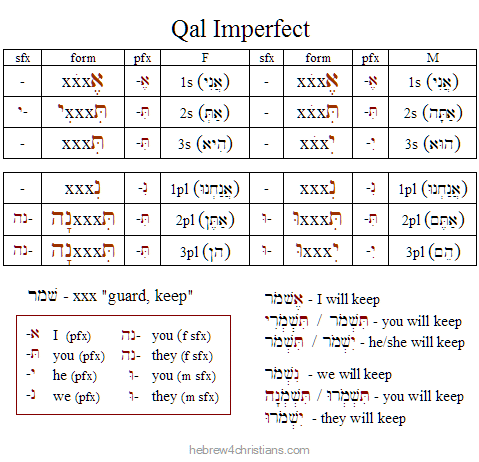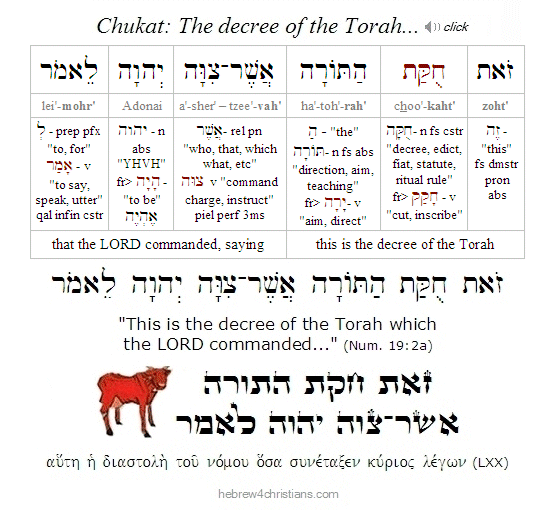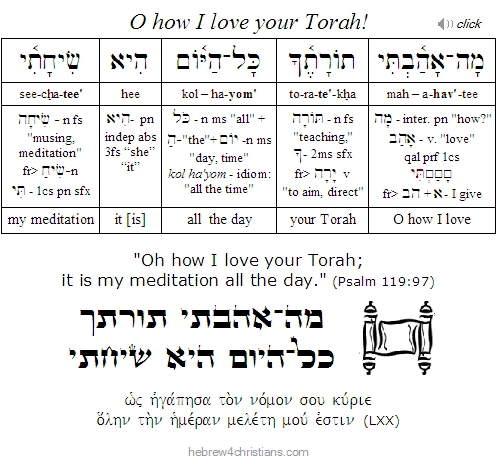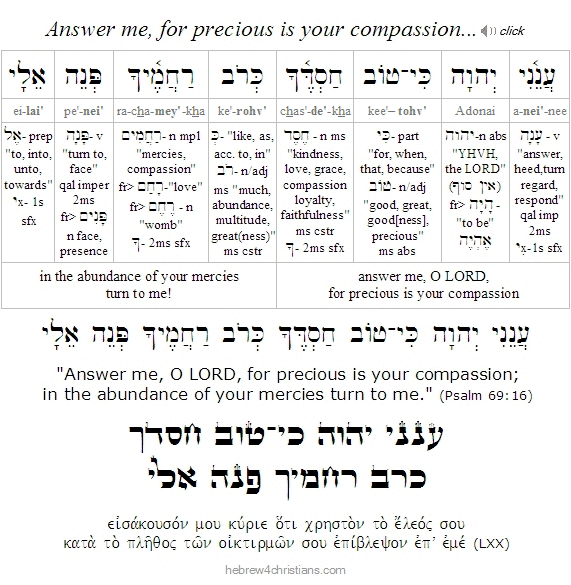|
Jewish Holiday Calendar
For July 2019 site updates, please scroll past this entry....
In the summer there occurs a three week period of mourning that begins with the Fast of Tammuz and ends with Tishah B'Av. The last nine days of this three week period (i.e., from Av 1 until Av 9th) are days of increased mourning. However, after this somber time, the romantic holiday of Tu B'Av, the 15th of Av occurs. Summer ends with the 30 days of the month of Elul, a yearly season of teshuvah (repentance) that anticipates Rosh Hashanah and the fall holidays. The 30 days of Elul are combined with the first 10 days of the month of Tishri to create the "Forty Days of Teshuvah" that culminate with Yom Kippur.
Because they occur between the spring and fall holidays, the summer holidays help us prepare for the second coming of the Messiah:
The Summer Holidays:

Note that in accordance with tradition, holiday dates begin at sundown. Moreover, some holidays may be postponed one day if they happen to fall on the weekly Sabbath:
- Month of Tammuz (Tues. July 2nd [eve] - Thurs. Aug. 1st [day])
- Month of Av (Thurs. Aug. 1st [eve] - Fri. Aug. 30th [day])
- Month of Elul (Fri. Aug. 30th [eve] - Sun. Sept. 29th [day])
- Month of Tishri (Sun. Sept. 29th [eve] - Mon. Oct. 28th [day]) - Fall holidays begin!
Note: For more about the dates of these holidays see the Calendar pages....
July 2019 Updates
The Journey of journeys...
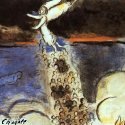
[ The following is related to our Torah portion for this week, parashat Masei... ]
07.31.19 (Tammuz 28, 5779) From our Torah portion this week (i.e., Masei) we read: "These are the journeys of the people of Israel (מַסְעֵי בְנֵי־יִשְׂרָאֵל) who went out of the land of Egypt..." (Num. 33:1). The sages ask why the word "journeys" (plural) was used here, since only the first journey – from Rameses to Sukkot – literally marked "yetziat mitzrayim," the going out of Egypt – and the other journeys were outside of Egypt, in the desert. They answer that the journey out of Egypt goes beyond the physical land into the spiritual realm - an exodus from captivity to the secular world itself. As has been said, it took the LORD 40 days to get Israel out of Egypt, but it took 40 years to get Egypt out of Israel... The "journey out of Egypt" is therefore a journey of smaller journeys that leads to deliverance....
Along the way we are repeatedly tested. The "desert experience" reveals what is hidden in our hearts... The murmuring and rebellion of the Israelites in the desert is our own, and our challenge is to find healing from our fears. Anger, doubt, boredom, cravings, and outright rebellion are symptoms of a deeper problem, and to change we must first confess our inner poverty, neediness, and emptiness (James 5:16). When we stop making excuses we can learn to trust in God's provision for our lives; we will taste of the heavenly manna and be satisfied; we will be delivered from our fears by be filled with God's love. The impulses that sought to lead us away from God will no longer be able to pretend to be the truth, since God's peace and love will direct the heart. We will begin to take hold of the promise...
Be encouraged my fellow sojourners walking by faith through the desert of this present world. The Torah uses a repetitious expression, "Sanctify yourselves and you shall be holy" (הִתְקַדִּשְׁתֶּם וִהְיִיתֶם קְדשִׁים) (Lev. 11:44) because when we make an effort -- no matter how feeble at times -- to draw near to the LORD, He will draw near to us... Indeed the walk of faith is one of ascent and descent and ascent again: It's often "two steps forward, one step back..." It is a long road, a process, as we learn to obey and seek to grow closer to God. Authentic repentance doesn't imply that we will never sin or make any mistakes, of course, but rather means that the oscillating pattern of "up, then down, then up" is the basic way we walk. Our direction has changed for good; we have turned to God for life and hope. We now understand our sins in light of a greater love that bears them for us even as we draw ever closer to the One who calls us home...
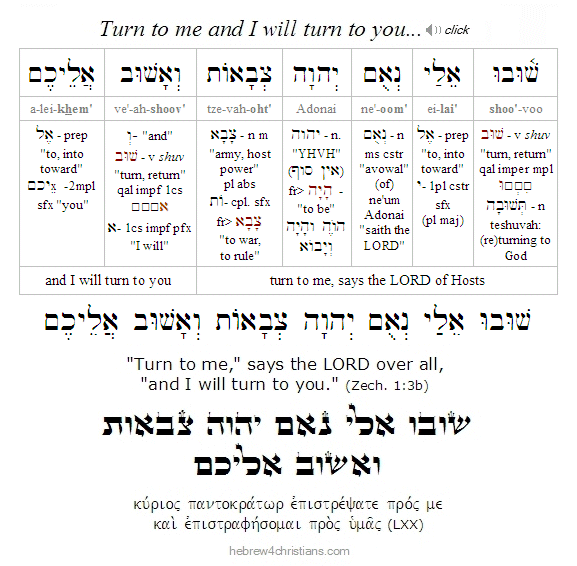 |
 |
Relying on God Alone...
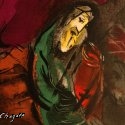
07.31.19 (Tammuz 28, 5779) "We we were so utterly burdened beyond our strength that we despaired of life itself, yes, we felt that we had received the sentence of death; but that was to make us rely not on ourselves, but on God who raises the dead" (2 Cor 1:8-9). This marks the end of carnal hope, when we realize we are but "dead men walking," and from this extremity of inner desperation and clarity we learn to rely solely on God for what we need. Here we abandon ourselves to God's care, despite the despair, darkness, and fear. We rely on "God who raises the dead," because all other remedies have been vanquished. It is a great gift to be so afflicted, for these "troubles of love" teach us to trust God alone for all we need. The only way out is through. We don't seek an easy way of life, but only that the LORD our God be with us throughout our troubles.
Ahavat Olam - Everlasting Love

07.31.19 (Tammuz 28, 5779) Salvation is "of the LORD" (לַיהוָה הַיְשׁוּעָה); we are not saved "by works of righteousness (מַעֲשֵׂי הַצְּדָקָה) that we have done, but solely on account of the mercy given to us in God our Savior (אֱלהִים מוֹשִׁיעֵנוּ; Titus 3:4-5). Grace excludes all boasting (Eph. 2:9; Rom. 4:4). We believe that God justifies the ungodly by trusting in his heart of compassion (Rom. 4:1-8). God loves us with "an everlasting love" (i.e., ahavat olam: אַהֲבַת עוֹלָם) and draws us in chesed (חֶסֶד, i.e., His faithful love and kindness). As it is written: "I love you with an everlasting love; therefore in chesed I draw you to me" (Jer. 31:3). Note that the word translated "I draw you" comes from the Hebrew word mashakh (מָשַׁךְ), meaning to "seize" or "drag away" (the ancient Greek translation used the verb helko (ἕλκω) to express the same idea). As Yeshua said, "No one is able to come to me unless he is "dragged away" (ἑλκύσῃ) by the Father (John 6:44). God's chesed seizes us, scandalizes us, takes us captive, and leads us to the Savior... Spiritual rebirth is a divine act, "not of blood nor of the will of the flesh nor of the will of man, but of God" (John 1:13). In everything - including human reason itself - the LORD God Almighty is preeminent.
וְאַהֲבַת עוֹלָם אֲהַבְתִּיךְ
עַל־כֵּן מְשַׁכְתִּיךְ חָסֶד
ve·a·ha·vat · oh·lahm · a·hav·teekh
al-kein · me·shakh·teekh · chah·sed

"I have loved you with an everlasting love;
therefore with lovingkindness I havedrawn you."
(Jer. 31:3)

Hebrew Study Card
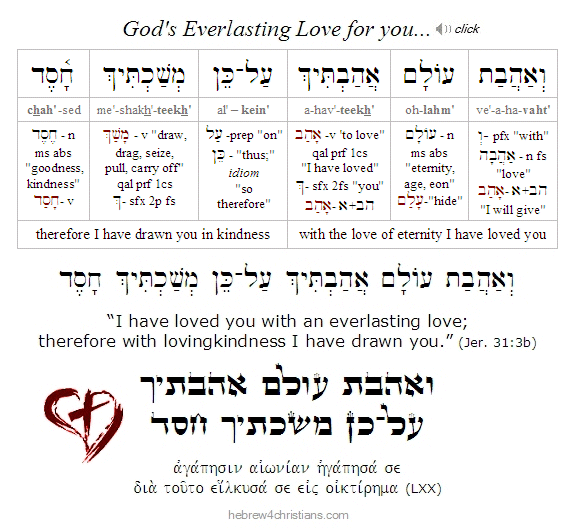
There is only One who offers you life, peace, and eternal healing, but it is offered on his terms, not your own. He "makes you lay down in pastures of tender grass, he leads you beside the place of quiet waters" (עַל־מֵי מְנֻחוֹת). He calls to your heart: "Come unto me, all you that labor and are heavy laden, and I will give you rest. Take my yoke upon you, and learn of me; for I am gentle and humble in heart: and you shall find rest for your souls. For my yoke is easy, and my burden is light" (כִּי עֻלִּי רַךְ וּמַשָּׂאִי קָל) [Matt. 11:28-30]. Thank God for the gracious love of our Savior Yeshua!
Healing and Tishah B'Av...

07.31.19 (Tammuz 28, 5779) The Second Temple was destroyed by the Romans in 70 A.D. (as Yeshua had foretold, see Matt. 24:2; Luke 19:44), yet despite the miraculous return to their promised homeland over the past century (Deut 30:1-3; Jer. 32:27; Ezek. 34:13), the Jewish people still are in a state of spiritual exile, or golah (גּוֹלָה) to this day, awaiting their final redemption, called the ge'ulah (גְּאוּלָה). In this connection the sages note the difference between the two words "golah" and "ge'ulah" is expressed by the presence of the letter Aleph (א) signifying God, the overmastering Champion (i.e., aluf: אלוּף) of the universe. This indicates that the golah will last only until the LORD's revelation of Messiah as the overcoming Go'el (גּוֹאֵל) of the Jewish people, at which time all Israel will be redeemed and the promises of Zion will finally be fulfilled (see Matt. 23:39; Rom. 11:26; Isa. 59:20). At that coming time Tishah B'Av and the other fast days of the year shall become "occasions for joy and gladness, happy festivals for the House of Judah" (see Zech. 8:19). Amen. Shuvah Yisrael ad Adonai Elohekha (שׁוּבָה יִשְׂרָאֵל עַד יְהוָה אֱלהֶיךָ), "Return O Israel to the LORD your God" (Hos. 14:1).
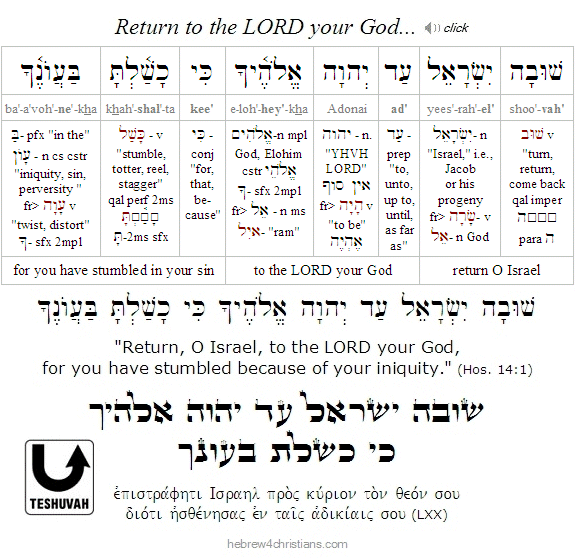 |
 |
Integrity of our Words...

[ Our Torah this week (Mattot) discusses various laws regarding vows and oaths... ]
07.30.19 (Tammuz 27, 5779) "If a person vows a vow (i.e., neder: נֶדֶר) to the LORD, or swears an oath (i.e., shevuah: שְׁבוּעָה) to bind himself by a pledge, he shall not break his word. He shall do according to all that proceeds out of his mouth" (Num. 30:2). The Hebrew expression "break his word" literally means "profane his word" (יַחֵל דְּבָרוֹ), that is, to defile the soul by causing it to be inwardly divided, irresolute, and cowardly. After all, breaking your word means violating the integrity of who you are, showing that what you say and what you do are not unified, and this leads to feelings of shame. Your words confess your reality and bring it to life... If you cannot keep your word, your word becomes profane, empty, lost -- you become a "stranger to yourself," unsure of what you intend. "Let your "yes" be yes and your "no" be no; learn to say what you mean and mean what you say (Matt. 5:37).
"I accept upon myself - without a vow (bli neder) - not to excuse any of my actions with a falsehood. Even if this resolution will cause me great shame, I will will accept that shame and will admit to the truth." - Ahavat Meshorim
Note: A "vow" (neder) is a promise to do something (or to refrain from doing something), whereas an "oath" ( sheva') is a sworn testimony that something is true (or false). See the summary page for Parashat Mattot for more information.
Love's Long Passion...

07.30.19 (Tammuz 27, 5779) Newness of life is a miracle, since it is a gift from heaven (John 3:3-8; Eph. 2:8-9). Only God can give to us the love for Him that he fully knows we so desperately need; only God can deliver us from our "disordered loves" to take hold of what is truly essential. All we can do is ask, and to keep on asking - even as we struggle on, despite ourselves - until we begin to understand what we really need. It's as if we are constantly being questioned, "Is this what you want?" and our choices confess the truth of what we believe... Only God does the miracle of real change within the human heart - only God can give life from the dead. Create for me a pure heart, O God, make new within me a spirit that says 'Yes!'" (Psalm 51:10). Amen. Meanwhile, and "until our change comes" (Job 14:14), let us persevere in hope... Where it is written, love "suffers long..." (1 Cor. 13:4), the Greek word μακροθύμως (long-suffering) is derived from μακρός (long, great) + θυμός (passion), which indicates that love is a "long passion," that is, a passion that stays true despite the challenges it may encounter. May God grant us His comfort, friends...
 |
The Hebrew Month of Av (חודש אב)
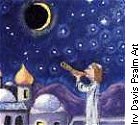
07.28.19 (Tammuz 25, 5779) The Hebrew month of Av is traditionally regarded as the most tragic in the Jewish calendar. On the first day of this month, Aaron (the first High Priest of Israel) died (Num. 33:38), which was regarded as a prophetic omen of the future destruction of both of the Temples on the Ninth of Av, which was the date when the people tragically believed the evil report of the spies and were sent into exile (this year the Fast of Av begins Saturday, August 10st at sundown (postponed one day because of the Sabbath).
Since Rosh Chodesh Av marks the time of mourning for Zion, we humbly ask the LORD to help us prepare for the coming time of teshuvah:
יְהִי רָצוֹן מִלְּפָנֵיךָ יהוה אֱלהֵינוּ
וֵאלהֵי אֲבוֹתֵינוּ שֶׁתְּחַדֵּשׁ עָלֵינוּ חדֶשׁ טוֹב
בַּאֲדנֵינוּ יֵשׁוּעַ הַמָּשִׁיחַ אָמֵן
ye·hee · rah·tzohn · meel·fah·ney·kha · Adonai · E·lo·hey·noo
vei·loh·hey · a·voh·tey·noo · she·te·kha·deish · ah·ley·noo · khoh·desh· tohv
ba'a·doh·ney·noo · Ye·shoo·a' · ha·mah·shee·akh · a·mein

"May it be Your will, LORD our God and God of our fathers,
that you renew for us a good month in our Lord Yeshua the Messiah. Amen."

Download Study Card
Parashat Mattot-Masei (פרשת מטות-מעסי)
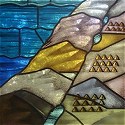
07.28.19 (Tammuz 25, 5779) Shavuah Tov, chaverim! This week we read a "double portion" of Torah that will conclude Sefer Bamidbar, or "the Book of Numbers." Our first Torah portion, called parashat Mattot (מַטּוֹת, "tribes"), begins with the LORD giving laws and prohibitions regarding the making of vows (nedarim). After this, the Israelites were commanded to wage war against the Midianites for seducing the people to sin at the incident of "Baal Peor." During the ensuing battle, the wicked sorcerer Balaam was killed, as well as five tribal kings of the land of Midian. Our second Torah portion, called parashat Masei (מַסְעֵי, "journeys"), provides the boundaries of the land of Canaan that were to be initially occupied by the Israelites. Note that these borders are not the same as those described earlier to Abraham (see Gen. 15:18-21), since that area will be given to Israel only after our Messiah Yeshua returns to establish Zion during the Millennial Kingdom (see Ezek. 47:15-48:35). During that coming time, Jerusalem (i.e., Zion) will be the center of the earth and renamed as "Adonai Shammah" (יְהוָה שָׁמָּה), "the LORD is there."
You can download the "Table Talk" for each of these portions here:
Now since the Book of Deuteronomy is called "mishneh Torah" (מִשְׁנֶה תוֹרָה) -- a sermon "retelling the Torah" -- it may be said that the Torah of Moses ends with these final portions from the Book of Numbers, and by extension, with the ongoing yearning for Zion... Therefore let us recite the three special words of encouragement: Chazak, chazak, ve'nitchazek, meaning "be strong, be strong, and we will get stronger." Amen!
Mattot-Masei Audio Broadcast...
In addition to providing an overview of the Torah readings, the audio podcast for Mattot-Masei discusses a number of themes related to taking vows and the virtue of shemirat lashon, or the "guarding of the tongue." The significance of the month of Av and the "Three Weeks of Mourning" leading up to Tishah B'Av are discussed as well. Shavuah tov chaverim.
The Mystery of Spirit...

07.26.19 (Tammuz 23, 5779) The word "spirit" (i.e., ruach: רוּחַ) points to wonder, to something extraordinary and beyond our expectation, that is, to the mysterious Divine Presence that pervades all things yet rises above all things. Yeshua likened the ruach with the inscrutable motions of the wind. He said, "The wind blows where it wishes, and you hear its sound, but you do not know where it comes from or where it goes. So it is with everyone who is born of the Spirit" (John 3:8). We see the effects of the wind, but not the wind itself, which illustrates that the wind surrounds us yet is ultimately beyond our grasp and control. To be "born of the Spirit" is therefore a mysterious intervention from heaven (John 1:13), just as being "led by the Spirit" implies seeing differently, that is, apprehending the Divine Presence in the mysterious motions of life.
אָנָה אֵלֵךְ מֵרוּחֶךָ
וְאָנָה מִפָּנֶיךָ אֶבְרָח
a·nah · ei·leikh · mei·roo·che'·kha
ve·a'·nah · mee·pa·ney'·kha · ev·rach

"Where shall I go from your spirit?
Or where shall I flee from your presence?"
(Psalm 139:7)

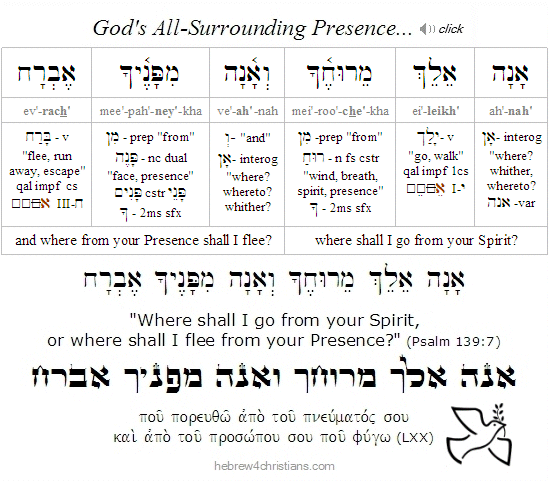
"The wind blows where it will; you are aware of its soughing, but no one knows whence it comes or whither it goes. So also with longing, the longing for God and the eternal, the longing for our Savior and Redeemer. Comprehend it you cannot, nor should you; indeed, you dare not even want to attempt - but you are to use the longing. Would the merchant be responsible if he does not use the opportune moment; would the sailor be responsible if he does not use the favorable winds - how much more, then, is the one who does not use the occasion of longing when it is offered" (Kierkegaard: Discourses). Amen, may the hunger and yearning for the Lord be within you. Amen.
Shabbat shalom, friends!
Thirsting for Life...
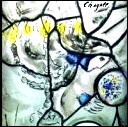
07.26.19 (Tammuz 23, 5779) "Love not the world, neither the things that are in the world. If any man love the world, the love of the Father is not in him" (1 John 2:15). The way of faith always represents collision with the world (κόσμος) and its philosophy of the "good life." Happy are those who "hunger and thirst" for righteousness, who refrain from this world and make themselves its exiles because of their inner heartache. For them no amount of the world's pleasures can obscure the difference between what is and what ought to be... This world is at best a corridor to the world to come, a "valley of decision" about what we ultimately choose to believe and to love... The heart of faith looks forward to "the city that has foundations, whose designer and builder is God" (Heb. 11:10).
צָמְאָה נַפְשִׁי לֵאלהִים לְאֵל חָי
מָתַי אָבוֹא וְאֵרָאֶה פְּנֵי אֱלהִים
tza·me·ah · naf·shee · le·lo·heem · le·el · chai
mah·tai · a·voh · ve·ei·ra·eh · pe·nei · e·lo·heem?

"My soul thirsts for God, for the living God.
When shall I come and appear before God?"
(Psalm 42:2)

There is a great danger to become so assimilated into this world that there is no longer any collision, no longer any protest, but merely the whimper of the soul that begs to be left alone from the general toil and troubles of this age... Conscience is seared; natural affections have been abandoned; and the "life" of the soul becomes a mere cipher, a phantom, a ghost... This is the scheme of the worldly dialectic that traps the human soul into living and dying for the sake of sheer vanity. May God help us not to so waste our days... The core prayer of the godly soul is always, "Help me, O LORD my God! Save me according to your faithful love" (Psalm 109:26). Empty our hearts from vanity, O LORD, and afflict us with hunger and thirst for You, for you alone are what we really need....
Olam Katan - Small World...

07.25.19 (Tammuz 22, 5779) It is written in our Torah portion for this week (i.e., Pinchas), "My offering, my food for my food offerings, my pleasing aroma, you shall be careful to offer to me at its appointed time" (Num. 28:2). Wait. Food for God? What need has the LORD for food? But by this is meant "as you have done it to least of these my brethren, you have done it unto Me" (Matt. 25:40). The offerings you make to tzedakah (giving charity, your time, your kindness, etc.) constitute food presented before the secret place of God's altar...
God created Adam alone, as a solitary being, made in the divine image, to teach us that to destroy a single life is to destroy an entire world, and to sustain a single life is to sustain an entire world. Therefore everyone should say: 'For my sake the world was created' (Talmud). Each of us is olam katan (עולם קטן), a small world that represents the large world. Indeed, one righteous human being can sustain the entire world, as it is written (Prov. 10:25), "the righteous is the foundation of the world" (וְצַדִּיק יְסוֹד עוֹלָם). On the other hand, balance is of course required here. Each of us is olam katan, a small world, though, as Rabbi Noah of Lekhivitz once wisely said, "if we are small in our own eyes, we are indeed 'a world,' but if we are a 'world' in our own eyes, we are thereby made small." There is a paradoxical balance here, as Yeshua (quoting Proverbs 29:23) also taught: "Whoever exalts himself will be humbled, and whoever humbles himself will be exalted" (Matt. 23:12).
גַּאֲוַת אָדָם תַּשְׁפִּילֶנּוּ
וּשְׁפַל־רוּחַ יִתְמךְ כָּבוֹד
ga·a·vat · ah·dahm · tash·pee·le·noo
oo·she·fahl · roo·ach · yeet·mokh · kah·vod

"The proud will be humbled,
but the humble will be honored."
(Prov. 29:23)

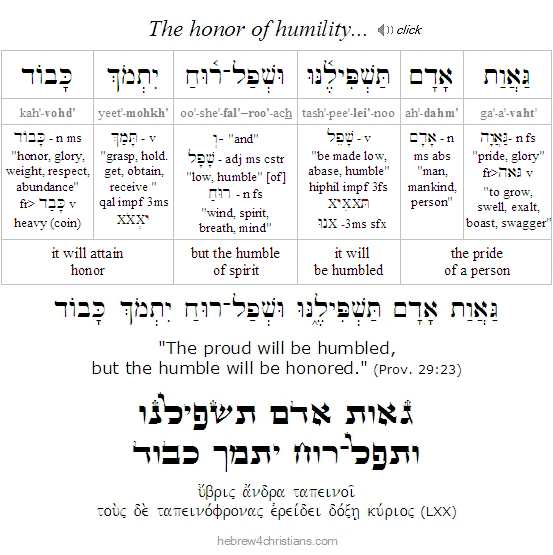
There are assumptions we bring to the reading of Torah that affect how we read and what we will hear... The sages generally agreed that the greatest principle of Torah is to love your neighbor as yourself (Lev. 19:18), though Ben Azzai further said that even greater is the principle that God created man in His likeness (i.e., bidmoot Elohim, בִּדְמוּת אֱלֹהִים, in "outline" or "silhouette") since then one cannot say, 'Since I despise myself I can despise another as well; since I curse myself, let the other be accursed as well.' Being made in God's likeness means how we regard ourselves will be the measure we regard even God Himself (1 John 4:20). Therefore the first commandment is always, "I am the LORD your God..." (Exod. 20:2), since apart from trust in God, there is no Torah of any kind.
First Principle of Knowledge...

[ The following entry provides a brief reflection on Proverbs 1:7, "The fear of the LORD is the first principle of knowledge..." ]
07.25.19 (Tammuz 22, 5779) "The fear of the LORD is the first principle of knowledge, but fools despise wisdom and correction" (Prov. 1:7). Reverence or respect is axiomatic for a good life, that is, for a life of wisdom and moral discipline. Fearing God expresses the confidence that life is a sacred trust and that each soul is answerable to the Creator. Such godly reverence infers that nothing is trivial or inconsequential, and that all things will be accounted before the judgment of divine truth (Eccl. 12:14; Job 31:4; Psalm 44:21, Prov. 5:21; Heb. 4:13). Note that the fear of the LORD, or "yirat Adonai" (יִרְאַת יְהוָה), should not founded upon the fear of divine retribution but rather the awe of God's love and intimate concern for your life... It is "techillat chokhah" (תְּחִלַּת חָכְמָה), "the start of wisdom," imparting awareness of the sacred gift of your life, your destiny, and your true end before heaven... If there is a negative aspect to the "fear of the LORD," it may be regarded as the fear of damage to your heart and eternal soul – that is, the loss of taking hold of the truth of God's love for you...
The fool, on the other hand, carelessly (yet wittingly) chooses to regard life as a random or "chance" encounter, suppressing the intuitive awareness of God's existence and the duty to live in accordance with his revealed will (Psalm 14:1). The fool "absolutizes" the moment and his idolatry inevitably leads him to dissipation and licentiousness. Such disregard of wisdom enables the fool to justify his selfishness and egotism as the "supreme good." By suppressing the truth that he needs deliverance and healing, the fool distances himself further from God, which leads to hardness of heart (Rom. 1:19-25).
The sages comment that if you intensely desire something you will esteem it as precious when you possess it. The fool, however, does not desire knowledge since he does not really esteem its worth and value. Genuine knowledge (i.e., da'at: דַּעַת) leads to wisdom and ethical integrity, but those who reject either one or both spurn the truth of God. The fear of God and the fear of sin are coextensive and complementary attitudes. Those who do not examine their lives and seek deliverance from sin do not yet fear God as they should. As I've mentioned before, the Hebrew word for "seeing" (ra'ah) is related to the word for "fear" (yirah), suggesting that when we really see life as it is, we will be filled with wonder and awe over the glory of it all. Every bush will be aflame with the Presence of God and the ground we walk upon shall suddenly be perceived as holy (Exod. 3:2-5). Nothing will seem small, trivial, or insignificant. It is in this sense that we are to serve the LORD with "fear and trembling" (φόβοv καὶ τρόμοv), that is, with an inner awareness of the sanctity and sacredness of life itself (Phil. 2:12-13). Da lifnei mi atah omed: "Know before whom you stand." Sin puts us to sleep, numbs our minds and hearts, and blinds us to the radiance of divine revelation. When we see life as it is, with the "eyes of the heart" (Eph. 1:18), we will be filled with awe over the glory of it all. "Fearing" (יִרְאָה) and "seeing" (רָאָה) will be unified within our hearts...
The opposite of the fear of the LORD is apathetic double-mindedness - a "two-souled" condition (δίψυχος) where inner vision is doubled and focus is lost. Remedy is found in a purity of heart that wills one thing: "If your eye be single (i.e., haplous: ἁπλοῦς), your whole being will be filled with light" (Matt. 6:22). We must beseech God as David did: "Teach me your way, O LORD, that I may walk in your truth; unify my heart to fear your name" (Psalm 86:11). David understood that walking in the truth required "uniting his heart," or "repairing the breach" within his inner affections so that he could confidently trust in God's Presence... He needed healing from the inner conflict that split him off from reality. In effect, David prayed: "After You have healed my ambivalent heart, I will thank You with all my heart and I will glorify Your Name forever. My healing comes from Your great love (chesed) toward me, and through your love I am delivered free from the depths of hell" (Psalm 86:12-13).
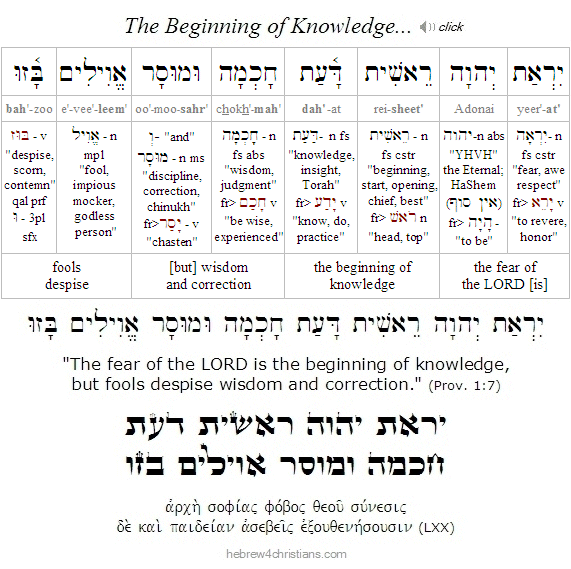 |
Some Key Terms in Hebrew
Since I have been sharing a lot from the Book of Psalms and Proverbs recently, I thought it might be helpful to put together a short list of key words commonly used in many of the verses of Scripture I share. Please note this is merely an overview of some the basic terms.
- Chokhmah (חָכְמָה) - "Wisdom." This refers to knowing the way of the righteous: doing truth, being merciful and loving justice (Gen. 18:19). Wisdom is grounded in revelation - first, the intuitive revelation realized through reason of being created by God, and secondly, by means of studying Torah and the Scriptures. The Malbim taught that wisdom means choosing the better of two opposing courses of action, such as the way of pride or the way of humility. In general, humility is wise and arrogance is foolish, but there are some exceptions (e.g., cp Prov. 26:4 with Prov. 26:5). Wisdom knows how to discern the difference and to apply each in its proper context. "So teach us to number our days, that we may get a heart of wisdom" (לְבַב חָכְמָה).
- Binah (בִּינָה) - "Understanding." This word refers to the ability to distinguish between (בּין) one thing and another, and particularly the ability to discern between good and evil, righteousness and iniquity, truth and falsity, and so on. A navon (נָבוֹן) is a discerning person. "The knowledge of the holy is understanding - דַעַת קְדֹשִׁים בִּינָה- (Prov. 9:10). The Hebrew word tevunah (תְּבוּנָה) comes from the same root and means insight, skill, etc.
- Da'at (דַּעַת) - "Knowledge." The word is "polysemous" and can refer to perception, understanding, and cognition. The knowledge of the holy (דַעַת קְדֹשִׁים) is the central aspect of understanding, that is, distinguishing between good and evil and separating from evil influences and practices in reverence before God. The root of the word is yada (יָדַע) meaning to know (again used in a variety of ways in Scripture).
- Mussar (מוּסָר) - "Correction," understood in terms of discipline, ethical instruction, reproof, chastening, and (in some cases) affliction. "My son, hear the instruction of your father (שְׁמַע בְּנִי מוּסַר אָבִיךָ) and forsake not the Torah of your mother" (Prov. 1:8). Mussar is the effort or the practice of developing good character traits (middot halev) in the life of a believer in the LORD.
Some of the basic middot ha'lev (מידות הלב) include the following:
- Gratitude (הַכָּרַת טוֹבָה) – hakarat tovah; also hakarat todah (הכרת תודה)
- Humility (עֲנָוָה)– anavah
- Modesty (צְנִיעוּת) - zeniyut
- Mutual Respect - (ואָהַבְתָּ לְרֵעֲךָ כָּמוֹךָ) - ve'ahavta le'reakha kamokha
- Patience (סַבְלָנוּת) – savlanut, also erekh apayim (אֶרֶךְ אַפַּיִם)
- Generosity (נְדִיבוּת) – nedivut
- Courage (אֹמֶץ לֵב) - ometz lev
- Happiness (אֹשֶׁר) - osher; also simchah (שִׂמְחָה)
- Honesty (יַשׁרוּת) – yashrut, also aminut (אֲמִתוּת)
- Decency, Civility - (דרך ארץ) - derech eretz
- Hospitality (הַכנָסַת אוֹרְחִים) - hakhnasat orechim
- Reverence (יִראַת כָּבוֹד), yirat kavod; also simply kavod
- Truth Telling (דברי אמת) - dibbur emet
- Compassion (רַחֲמָנוּת) – rachamimut
- Charity (גְּמִילוּת חֲסָדִים) - gemilut chasidim; also tzedakah
- Caring for others (ביקור חולים) - bikur cholim
- Trusting (ביטחון) – bittachon
- Faith (אֱמוּנָה) - emunah
- Forgiveness (סַלחָנוּת) - salchanut
- Lovingkindness (חֶסֶד)– chesed
- Loyalty (נֶאֱמָנוּת) - ne'emanut
- Wisdom (חָכמָה) - chochmah
- Knowledge (דַעַת) - da'at
- Torah Study (תלמוד תורה) - Talmud Torah;
- Education (חִנוּך) - chinukh; "study and do" (ללמוד ולעשות)
- Understanding (בִּינָה) - binah
- Reputation (שם טוב) - shem tov
- Peace (שָׁלוֹם)- shalom
- Justice, righteousness (צְדָקָה) - tzedekah
- Responsibility (אַחֲרָיוּת) - acharayut; כָּל יִשְׂרָאֵל עָרֵבִים זֶה בַּזֶה
- Moderation (מְתִינוּת) - metinut; also shevil ha'zahov "the golden mean"
- Showing Honor (לְכַבֵּד) – le'kavod
- Piety (חֲסִידוּת) - chasidut; also adikut (אֲדִיקוּת), tzadkanut (צַדקָנוּת)
- Spirituality (רוּחָנִיוּת) - ruchaniyut
- Repentance (תשובה) - teshuvah
- Fearing God (יראת יהוה) - yirat Adonai
- Devotion to God (דְבֵקוּת) - devakut; also (אַהֲבַת יהוה) - ahavat Adonai
- Willingness (נְכוֹנוּת) - nekhonut
- Silence (שֶׁקֶט) - sheket, also shetikah
- Repairing the world (תיקון עולם) - tikun olam
Mussar is inextricably connected with wisdom as its practical expression. The sages says that wisdom without mussar is repulsive, "like a tent without ropes," lacking stability. Some of the sages rightly link mussar with affliction (see Prov. 3:11-12; Heb. 12:5-6) since the root yasar (afflict) and asar (bind) suggest that the lower nature must be "bound and pummeled" to attain wisdom (see 1 Cor. 9:27).
- Mashal (מָשָׁל) - "Proverb, parable, allegory, aphorism." The Book of Proverbs is called Sefer Mishlei (סֶפֵר מִשְׁלֵי) from the first verse of the scroll: "The proverbs of Solomon, son of David, king of Israel: (מִשְׁלֵי שְׁלֹמֹה בֶן־דָּוִ֑ד מֶלֶךְ יִשְׂרָאֵל).
- Peti (פֶּתִי) - "Simpleton." A "simple" person. One easily swayed or fooled to do evil; a weak-minded soul without proven conviction; a gullible person easily duped: "The simple believes everything (פֶּתִי יַאֲמִין לְכָל־דָּבָ֑ר), but the prudent gives thought to his steps" (Prov. 14:15).
- Leitz (לֵץ) - "Scoffer" or "scorner." This word refers to those who mock wisdom and who have no fear of God. The scorner is arrogant, skeptical and haughty: "An arrogant and haughty person whose name is scoffer" (זֵד יָהִיר לֵץ שְׁמ֑וֹ; Prov. 21:24).
- Kesil (כְּסִיל) - "Fool." A lazy person who is unwilling to seek wisdom or the truth of God with the ulterior motive of indulging his carnal desires. A dullard or senseless person. A kesil is often shameless and narcissistic. "A fool takes no pleasure in understanding (לא־יַחְפּץ כְּסִיל בִּתְבוּנָה), but only in expressing his opinion" (Prov. 18:2).
- Naval (נָבָל) - "Fool." A pompous and lazy person who "withers" (נָבֵל) because of his self-absorption and indulgent egotism. A immoral person who regards himself as superior to others. A scoundrel, villain, or worthless person (בֶּן בְּלִיַעַל; Deut. 13:13; from בְּלִי, "without" and יָעַל, "profit").
- Eveel (אֱוִיל) - "Fool, mocker, skeptic." The sages note the morphological similarity between אֱוִיל ("fool") and אולו ("perhaps, maybe") suggesting doubt and cynicism. "A fool despises his father's instruction (אֱוִיל יִנְאַץ מוּסַר אָבִיו), but whoever heeds reproof is prudent" (Prov. 15:5). "If a wise man has an argument with a fool (אִישׁ־חָכָם נִשְׁפָּט אֶת־אִישׁ אֱוִיל), the fool only rages and laughs, and there is no quiet" (Prov. 29:9). Fools (אֱוִילִים) despise wisdom and instruction (Prov. 1:7).
- Rasha (רָשָׁע) - "Wicked person." A general term referring to a criminal or lawless person. An evildoer. From the adjective ra' (רַע) meaning bad, malignant, etc.
- Tochechah (תּוֹכֵחָה) - "Reproof, rebuke, correction." This word is used to describe the great prophesies of rebuke given to Israel in both Leviticus 26 and in Deuteronomy 28. The word comes from a verb (יָכַח) that means to prove, convict or chide. "This day is a day of trouble, and of rebuke, and blasphemy" (יוֹם־צָרָה וְתוֹכֵחָה וּנְאָצָה הַיּוֹם הַזֶּה), for children have come to the point of birth, and there is no strength to bring them forth" (2 Kings 19:3).
- Sekel (שֶׂכֶּל) - "Prudence, Insight, understanding, savvy." This word comes from a root (שָׂכַל) that means to be circumspect, to consider, and to ponder. Sekel tov (שֶׂכֶּל טוּב) means "good success." "The fear of the LORD is the beginning of wisdom (רֵאשִׁית חָכְמָה יִרְאַת יְהוָה); all those who practice it have a good understanding (שֵׂכֶל טוֹב לְכָל־עֹשֵׂיהֶם). All that the godly do shall prosper (כּל אֲשֶׁר־יַעֲשֶׂה יַצְלִיחַ).
- Yarei (יָרֵא) - "to fear." The word has a large range of meanings depending on context, from being terrified, full of dread, alarmed, worried, and anxious, to being filled with awe, wonder, reverence, respect, veneration, and worship.
- Yirat Adonai (ירְאַת יְהוָה) - "The fear of the LORD." There are two basic kinds of fear regarding God - fear of his punishment or judgment, and fear over the glory and majesty and awe of his character and love. The fear of the LORD means realizing that all of life is a sacred gift for which you are responsible before God. It is the knowledge that God is your Creator who knows and is intimately concerned with your choices, and that he rewards the righteous but punishes the wicked. In general to fear the Lord is to obey him by observing the Torah and the mitzvot of the holy Scriptures (including those of the New Testament). You can learn to fear/love God as it says in Deut. 31:12: " Assemble the people, men, women, and little ones, and the sojourner within your towns, that they may hear and learn to fear the LORD your God (לְמַעַן יִלְמְדוּ וְיָרְאוּ אֶת־יְהוָה אֱלֹהֵיכֶם), and be careful to do all the words of this Torah." " Come, O children, listen to me; I will teach you (אֲלַמֶּדְכֶם) the fear of the LORD" (Psalm 34:11).
- Neshamah (נְשָׁמָה) - "Breath, soul, highest aspect of the soul." The word comes from a root (נָשַׁם) that means to breathe or pant. Spiritually neshamah refers to the spirit within us that seeks God for life, healing, and love.
- Ruach (רוּחַ) - "Wind, spirit, breath." The animating principle of the body. Ruach chayim (רוּחַ חַיִּים) is the "breath of life," referring to the source of animation and vigor. "God is spirit, and those who worship him must worship in spirit and truth" (John 4:24).
- Nefesh (נֶפֶשׁ) - "Soul, emotion, appetite, desire." The word refers to the ego and its passions, conflicts, and emotions.
 |
Strength of Gentleness...
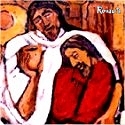
07.24.19 (Tammuz 21, 5779) It is written in our Scriptures: "A gentle reply will turn away wrath, but a harsh word will arouse anger" (Prov. 15:1). The sages connect this mashal (proverb) with intercession regarding our sins. If we acknowledge our sins by appealing to God's favor and love, using gentle words, expressing remorse (i.e., devar etzev: דְּבַר־עֶצֶב, "a word of grief"), his compassion is evoked, but if we speak harshly - perhaps blaming others for our troubles or indulging in outrage, God's judgment is evoked. In the former case we appeal to God as YHVH (יהוה), the compassionate Savior; in the latter case we appeal to God as Elohim (אלהים), the Righteous Judge; however, in either case our heart attitude is reflected back to us (see Matt. 6:14-15; Psalm 18:25-26).
Regarding our interactions with others our tradition teaches that we should pursue peace (i.e., redifat shalom: רְדִיפַת שָׁלוֹם) and (if possible) quell hostile feelings when they arise (Heb. 12:14). If another person is angry about something we did, we should be quick to take responsibility and calm the other by reassuring him or her that we meant no harm and that we are sorry for any distress we may have caused. A soft-spoken person reacts calmly and turns away wrath, though defensiveness and counter-accusations will incite more anger... Showing calmness and civility -- even when someone might unjustly provoke you -- is a matter of self-control and godly strength. "Keeping your cool" is a matter of shemirat ha'lashon (שְׁמִירַת הַלָּשׁוֹן) or "guarding the tongue" by refusing to use words in an abusive or harmful way. As it says in the following verse, לְשׁוֹן חֲכָמִים תֵּיטִיב דָּעַת - "the tongue of the wise uses knowledge rightly" (Prov. 15:2), which means the wise person seeks to upbuild others in their way... Doing so shines the light of God's blessing to others (Matt. 5:44).
Each soul is created betzelem Elohim (בְּצֶלֶם אֱלהִים), in the "image of God," which the sages connect with our ability to use logic and language. Where is says "man became a living soul" (Gen. 2:7), the Targum translates, "man became a living word" (or a "speaking spirit"). Our words are meant to sanctify and express love to others, not to bring them pain and harm (James 3:10). And since our words represent thoughts, our use of the tongue has to do with how we choose to think... "Think on these things..." (Phil. 4:8). We are instructed to "take every thought captive" (αἰχμαλωτίζω, i.e., lead away as a prisoner) to the truth of Messiah (2 Cor. 10:5). One of the "fruits of the Spirit" that is often translated as "temperance" or "self control" (in Gal. 5:23) might better be understood as "inner strength" (i.e., ἐγκρατής, inwardly [ἐν] strong [κράτος]). In other words, the fruitfulness comes from the power of the Spirit working within us, helping us grow to maturity, "from strength to strength..."
"Deliver me, O LORD, from lying lips, from a deceitful tongue" (Psalm 120:2). It is wise to restrain our speech, because, after all, we often have no idea what we are talking about, and therefore our words can become unruly and even dangerous (James 3:6). Remember, friend, that whenever we open our mouth to speak heaven is listening (see Matt. 12:36-37).
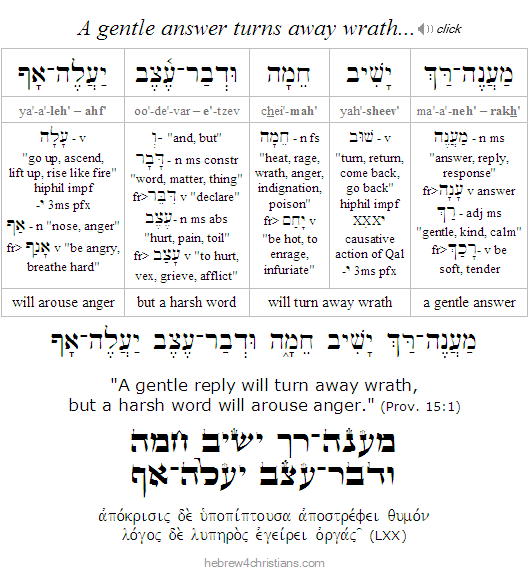 |
"Everything is in the hands of Heaven, except for fear of Heaven" (Berakhot 33b). This idea may be summed up as, "respect precedes Torah" (דרך ארץ קדמה לתורה), since without a basic sense of reverence for life, all that is left to us are painful words of despair... As Abraham Heschel said, "In a controversy, the instant we feel anger, we have already ceased striving for truth and have begun striving for ourselves." The truth needs no defense. If we find ourselves getting defensive or hostile, we need to take a step back and ask ourselves what we really believe... If we seek to use truth as a weapon, or as a means to rationalize our self-will, then we are not "in the truth," even if our facts in the matter may be correct. We must be careful not to find ourselves using the truth for our own agenda. Yeshua's words haunt the heart: "Without me you can do nothing" (John 15:5).
Danger of Losing Heart...

07.24.19 (Tammuz 21, 5779) Some people are afraid that God will punish them for their sins, but the true fear of God, yirat Adonai (יִרְאַת יְהוָה), is rather the fear of losing our closeness to Him... The sages say that where it is written, "What does the LORD ask of you except to fear the LORD" (Deut. 10:12), we should read instead, "fear with the LORD" (לְיִרְאָה אֶת־יְהוָה), that is, we share his concern that we could forfeit the sanctity of a heart-relationship with Him due to carelessness and sin... Indeed is not sin rooted in such carelessness and indifference to the truth of God? Rather ought we fear our sin because it blinds us from awareness of God's care and love. The fear of God can therefore be understood as God's fear that we will miss the blessing of intimately knowing him. Therefore we are admonished: "Only fear the LORD and serve him faithfully with all your heart -- כִּי רְאוּ אֵת אֲשֶׁר־הִגְדִּל עִמָּכֶם -- for consider what great things he has done for you! (1 Sam. 12:24).
The LORD has promised to never leave nor forsake us (i.e., לֹא אַרְפְּךָ וְלֹא אֶעֶזְבֶךָּ, see Deut. 31:6; Josh. 1:5, Heb. 13:5, Matt. 28:20), though we can choose to turn away from his love and care for our lives...We are not permitted to fear other than that we have no fear of God, for that indeed is a fearful state of soul. May it please God to help each us never to leave nor forsake ourselves by getting lost, by forgetting what is real, and by abandoning hope in the miracle for our lives... May the LORD help us not be grieved, not to hurt ourselves, and never to abandon our hearts to the despair of shame.... May God help us to esteem our relationship with him as our ultimate concern and our greatest treasure.
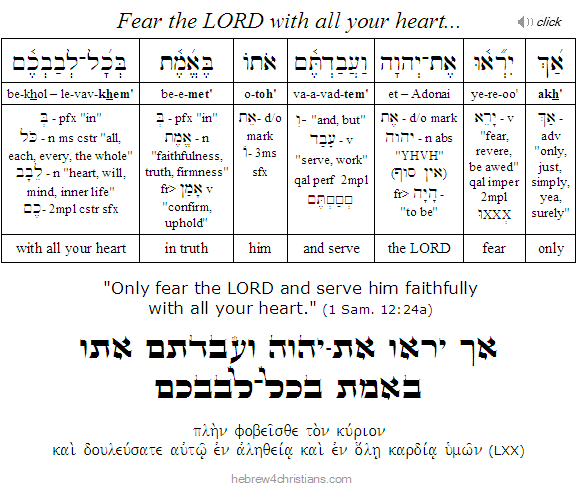 |
 |
Our Wounded Shepherd...
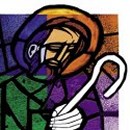
07.23.19 (Tammuz 20, 5779) From our Torah this week (i.e., parashat Pinchas) we read how Moses appealed to heaven for his successor: "Let the LORD, the God of the spirits of all flesh (אלהֵי הָרוּחת לְכָל־בָּשָׂר), appoint a man over the congregation who shall go out before them and come in before them, who shall lead them out and bring them in, that the congregation of the LORD may not be as sheep that have no shepherd" (Num. 27:16-17). The Koznitzer rebbe commented here that Moses asked God to appoint a leader "for all flesh," lekhol basar (לְכָל־בָּשָׂר). Rearranging the letters of basar (בָּשָׂר), he formed the word shavar (שָׁבָר), which means "to break in pieces," and concluded that a true leader should be one with a broken heart (i.e., lev shavur: לֵב שָׁבוּר), that is, one who can sympathize and have pity on his people (Heb. 2:8; 4:15; 5:1-ff). He should not be proud or aristocratic, but like a shepherd, a plain and simple person, who guides his people to observe the ways of the LORD. Therefore our beloved good shepherd Yeshua is called ish makhovot vidu'a choli (אִישׁ מַכְאבוֹת וִידוּעַ חלִי) - a "man of sorrows who knows grief" (Isa. 53:3).
"The experiences of men who walked with God in olden times agree to teach that the Lord cannot fully bless the a man until He has first conquered him. The degree of blessing enjoyed by any man will correspond exactly with the completeness of God's victory over him. Beware of any Christian leader who does not walk with a limp."- Tozer
True and False Zeal...

[ The following entry concerns our Torah reading for this week, parashat Pinchas... ]
07.23.19 (Tammuz 20, 5779) You may be entirely sincere in your convictions, but you may be sincerely wrong... In the time of the Second Temple, for instance, the Zealots despised the rule of Rome. Their political hatred caused them to blindly regard anyone who didn't share their passion as a personal enemy. In one of the great tragedies of Jewish history, these Jewish zealots actually killed more Jews than did the Romans themselves! And how many Christians these days "kill" relationships with other believers because of their particular zeal regarding some doctrinal question? I am not suggesting that doctrine is unimportant, of course, but before you pick up that sword to do the business of Pinchas, you might do well to consider your heart's attitude...
"In this respect fundamentalism has demonic traits. It destroys the humble honesty of the search for truth, it splits the conscience of its thoughtful adherents, and it makes them fanatical because they are forced to suppress elements of truth of which they are dimly aware." - Paul Tillich
We need to be careful with our passions. There is a "false zeal" that leads to estrangement and confusion. Withholding love from others is ultimately grounded in an appeal to God as the administrator of Justice. It is an appeal to God as Elohim (אֱלהִים), not as YHVH (יהוה), the Compassionate Source of Life. If we insist on our rights, we appeal to principles of justice, i.e., to God as the Lawgiver. But if we intend to have God be the Judge of others, we must appeal to Him to be our own Judge as well. If we have an unforgiving spirit toward others, we will not receive our own forgiveness (Matt. 6:15); if we are judgmental toward them, we ourselves will be put on trial; if we are cruel and ungiving toward them, we will experience life as hellish, miserable and mean. This reciprocal principle of Kingdom life appears throughout Yeshua's teaching. According to your faith, be it done unto you (Matt. 9:29).
Note: For more on this important topic, see "Parashat Pinchas: God's Greater Zeal."
Escaping the Legalism Trap...

[ The following entry concerns this week's Torah reading, parashat Pinchas... ]
07.23.19 (Tammuz 20, 5779) The world is full of cocksure zealots. By default, everyone believes they are justified in their reasoning and in their passions. We must be careful: "Before a crash comes arrogance; and before stumbling -- a haughty spirit" (Prov. 16:18). The "natural man" instinctively "lives" by this simple creed: I have a right to think or feel whatever I want. Morality is a matter of my individual, subjective, and personal preference. There are no "objective standards" of moral truth in the universe: values are relative to time and place, and often they are used to censor the creative instincts of "the great." I alone decide what is good and what is evil, and if something is good for me, that's all that suffices. And so on... In this way, the natural man assumes the posture of a self-styled "free agent" that is answerable only to himself. Like Pharaoh of old, the zeal of the "natural man" says, "I am the master of my fate; I am the captain of my soul" (Henley: Invictus).
Notice that the only abiding "offense" to the "natural man" is that there might be a moral law that pervades the universe, and that therefore he is morally accountable to the Lawgiver for the choices and manner of his life. This terrifies his soul and fills him with unreasoning dread. The idea that our actions are "under divine examination" is regarded as threatening to the fictitious liberty of the natural man, who will gladly tolerate all manner of sin and willful ignorance but dogmatically refuses to tolerate any anger against sin... The natural man hates the very idea of the moral law of God and all that it implies. It's no wonder that the true prophets of God were often murdered for speaking the truth.
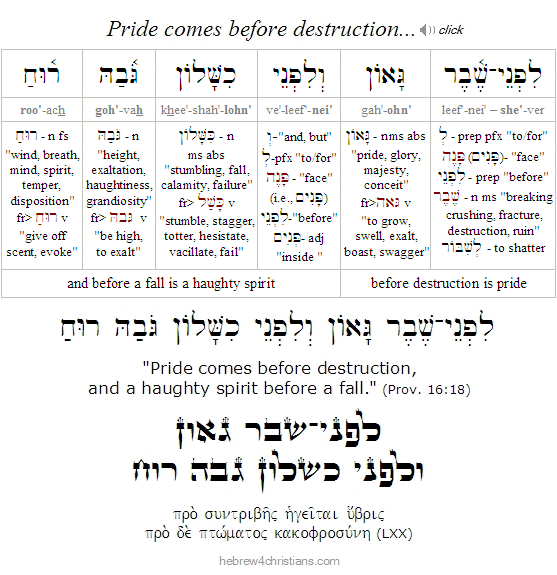 |
The encounter (or collision) with moral reality (i.e., conscience) leads the natural man to become impassioned and even zealous, though usually this is expressed in some form of self-justification. The world's religions are filled with untold millions of people who seek to assuage their consciences by practicing various rituals or pledging allegiance to some creedal formula. What's common in most of these religions is the centrality of the ego, or the need to "save face" by making excuses of some sort. The ego is either advised to become "elevated" through religious practices or rituals (i.e., legalism, including the justification for "jihad" found in Islam), or else is encouraged to practice various techniques for "escaping" the world (i.e., mysticism, divine unity, etc.). Hence we see the dialectic between legalism and mysticism in so many of the world's religions.
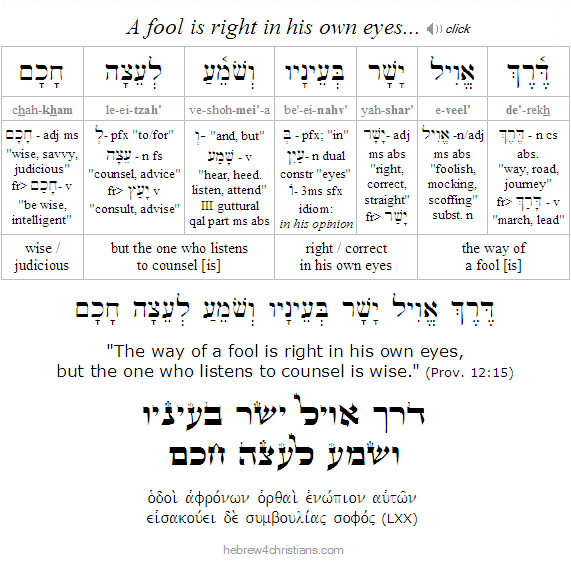 |
Yeshua, on the other hand, spoke plainly of man's hopeless condition and the need for spiritual regeneration, or "rebirth." The natural man is spiritually dead and without hope apart from a miracle imparted directly from God Himself. As Yeshua said, "Unless you are born again, it is impossible (οὐ δύναται) see the Kingdom of God" (John 3:3). Rebirth comes by means of the Holy Spirit and leads to a new order of creation for the soul (2 Cor. 5:17, Gal. 6:15). Yeshua did not come to extinguish our egos as much as He came to resurrect and recreate us in His image (Rom. 8:29). "For we all, with unveiled face, beholding the glory of the Lord, are being transformed into the same image from one degree of glory to another. For this comes from the Lord who is the Spirit (2 Cor. 3:18). Indeed, since the self is ultimately defined by relationship, it is only after we are reborn in the Spirit that we can be said to have a spiritually real "self" at all. God gives the gift of a true, resurrected self to those whom He regenerates.
But what about those who receive the message of the gospel? How do they please God? After coming to Yeshua for life, some people tragically revert to the concept of the law once again. They attempt to "try harder" to please God and saddle themselves with various religious obligations (prescribed prayers, church services, rituals, etc.). They seem to forget that the law is powerless to save. Their logic goes something like this. I was condemned by the law, but because of God's mercy revealed in Yeshua, I am now forgiven. Therefore I am enabled by God's Spirit to keep the law, and therefore I should strive to be kosher, to observe various rituals, etc. This reasoning assumes that the law (i.e., the legal aspects of the covenant made at Sinai) with its verdict against us was not really done away with at the Cross of Yeshua (Col. 2:13-15). The "New Covenant," in other words, is not really all that new, and should be regarded as a "renewed covenant" instead. The upshot of this thinking is that Yeshua died on the cross so that we could all become followers of Moses!
I have written about this subject before, but I'll say it again here. There is indeed a "Torah" for followers of Yeshua, but this is His teaching... Indeed, the word Torah (תּוֹרָה) simply means teaching. But what did Yeshua teach about doing the "works of God?" Here's his explicit answer: "This is the work of God, that you believe in him whom he has sent" (John 6:29). Without faith it is impossible to please God (Heb. 11:6) since we are literally saved by hope, not by works of righteousness (Rom. 8:24, Titus 3:5). What God requires is authentic faith in His Son (אֱמוּנַת יֵשׁוּעַ). The single most important mitzvah is trusting in Yeshua for life... This is THE central commandment of Scripture. Legalism attempts to find the "key" to open the door into the Presence of God through various forms of self effort ("don't touch this," "don't eat that," etc. Col. 2:20-23). It's underlying hope is that if I do such and such (or abstain from such and so), God will be propitiated and I will be accepted. It is therefore a mode of relating to God based on His conditional acceptance and approval.... But faith is the key that opens the door to true freedom. It is the miracle that makes blind eyes see. When we truly "live in the Presence of the LORD" by faith, we are set free from the trap of legalism. We receive the love of God; we accept that we are accepted; and then we walk in God's zeal and care for our souls (in that order). We do not relate to God as Judge but as our Heavenly Father, our Abba, our loving Savior.
Guilt, shame, and spiritual death come from relating to God on the basis of our own zeal and supposed merits, but forgiveness, justification, and spiritual life come from trusting in God's zeal and passion for you.... Again, it's not so much a matter of finding the zeal within your heart, but rather receiving the zeal that comes from the LORD. We are sanctified by faith alone, just as we are justified by faith alone (Eph. 2:8-9; 1 Cor. 6:11). There is no "catch" in the contract, no loophole, and no exception to the "Torah of the Spirit of Life" (תּוֹרַת רוּחַ הַחַיִּים). If the Son sets you free, you are free indeed. This is the scandal of grace. Trying to please God through self-effort leads to exhaustion and frustration. Accepting that you are accepted and loved leads to peace and joy. God's love for you is the end of the law for righteousness (Rom. 10:4). In all things Yeshua is preeminent.
"In those who rest on their unshakable faith, pharisaism and fanaticism are the unmistakable symptoms of doubt which has been repressed. Doubt is not overcome by repression but by courage. Courage does not deny that there is doubt, but it takes the doubt into itself as an expression of its own finitude and affirms the content of an ultimate concern. Courage does not need the safety of an unquestionable conviction. It includes the risk without which no creative life is possible." - Paul Tillich
'Education is the process of turning cocksure ignorance into thoughtful uncertainty.'
- K. G. Johnson
In closing, there is man's zeal, and there is God's zeal. The zeal of the LORD (קִנְאַת יהוה) represents His passion and eagerness to help those who are trusting in Him. Man's zeal is always insufficient, since self-justification - of any sort - invariably leads to the "Torah of sin and death" (תּוֹרַת הַחֵטְא וְהַמָּוֶת). This is precisely why legalism leads us to shame. As long as you think you can merit eternal life by means of your own efforts, you are relating to God as Judge (אֱלהִים) rather than as compassionate Savior (יהוה). You have yet to experience inner brokenness and therefore believe you can "justify yourself." It is the Spirit that gives us life - though always at the price of the death and resurrection of the ego. As Yeshua said, "Truly, truly, I say to you, unless a grain of wheat falls into the earth and dies, it remains alone; but if it dies, it bears much fruit" (John 12:24).
None of what I've shared here implies that we are to be passive in our affections and in the exercise of our will. No, but the principle that governs our passion is to be derived from the "Torah of the Spirit of Life" and no longer from the "Torah of Law and Death." Because of Yeshua, we are free to trust in the zealous, passionate, and irrepressible love of God for our lives. The same passion that led Yeshua to die upon the cross is present to you today, if you have faith enough to receive it... God is the beginning and the end of our salvation: Kinat Adonai Tzeva'ot ta'aseh zot: "The zeal of the LORD of hosts will do this" (Isa. 9:7).
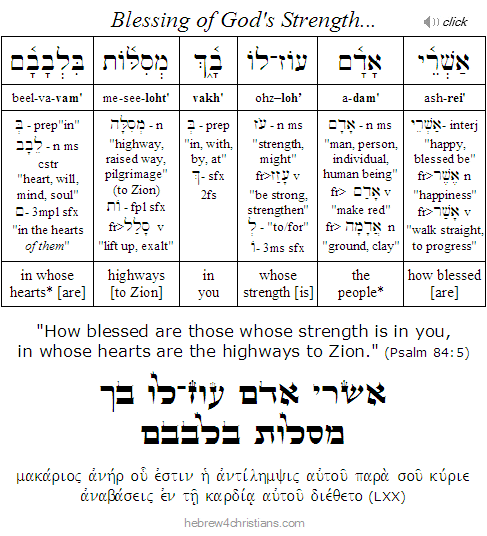 |
For more thoughts about this vital subject, please see God's Greater Zeal.
Reaffirming the Appointed Times...

[ The following entry concerns this week's Torah reading, parashat Pinchas... ]
07.23.19 (Tammuz 20, 5779) Our Torah portion this week (i.e., Pinchas) lists eight of the main mo'edim (מוֹעֲדִים), or the "appointed times" of the LORD, given in the Jewish Scriptures. Note that this is the second time that the Torah provides a description of the festivals of the year, including the following special times: 1) The daily offering of the Lamb of God (Num. 28:1-8); 2) the weekly Sabbath offering (Num. 28:9-10, Lev. 23:1-3); 3) the monthly or Rosh Chodesh offering (Num. 28:11-15); 4) the Passover and Unleavened Bread offering, including Shavuot (Num. 28:16-25; Lev 23:15-21); 5) the Firstfruits offering (Num. 28:26-31; Lev. 9:14); 6) the Yom Teru'ah or "Trumpets" offering (Num. 29:1-6; Lev. 23:23-25); 7) the Yom Kippur offering (Num. 29:7-11; Lev 23:26-32); and 8) the Sukkot (Tabernacles) offering (Num. 29:12-38; Lev. 23:33-43). These appointed times were given by God to help us turn away from the omnipresent urge within the human heart to embrace vanity, as it is written: "Every one of you shall revere his mother and his father and guard (שָׁמַר) my Sabbaths (שַׁבְּתתַי)... Do not turn to worthlessness (i.e., אֱלִיל) or make for yourselves any molten gods" (Lev. 19:3-4).
Notice that the Torah teaches that the Biblical holidays - including Shabbat, Rosh Chodesh, and so on - were intended to help us to sanctify ("set apart," "make holy") the times and seasons in order to remind us of God's Presence (Psalm 104:19). Therefore they are called mikra'ei kodesh (מִקְרָאֵי קדֶשׁ), "times in which holiness is proclaimed" (Lev. 23:2). The Torah's declaration that these days are holy implies that they are set apart for special activities, such as commemorating God as our daily Savior (the tamid offering), our Creator (Shabbat), our Redeemer (Passover), our Resurrection (Firstfruits), our Law Giver (Shavuot), our King (Rosh Hashanah), our High Priest (Yom Kippur), and so on. In this connection it should be noted that it is a mistake to assume that the divine calendar was somehow abrogated with the cross of Yeshua, since all of the Jewish holidays center on Him, and indeed the advent of the Ruach Ha-Kodesh (Holy Spirit) occurred after the resurrection and prescribed 49 day countdown to Shavuot (Acts 1:8; 2:1-4). This is signifcant because it proves that Yeshua intended his followers to observe the holidays after the institution of the new covenant.
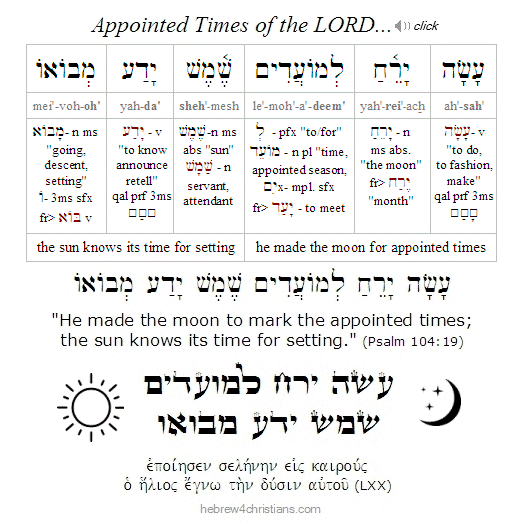 |
Note: Someone asked me if there is a connection between the observance of the moedim and the instruction not to "forsake assembling together" in Hebrews 10:25. The Greek word in Heb. 10:25 is ἐπισυναγωγή (epi-synagoge), which generally means "gathering together," indicating that we need one another for fellowship and encouragment to keep walking our faith, as the rest of the verse indicates (i.e., "but encourage each other [παρακαλέω, "parakaleo" came aside one another] ... because you see the day drawing near.
Accepting His Crucified Life...

07.22.19 (Tammuz 19, 5779) Some people seem to think that to be "crucified with Messiah" means that we must totally surrender our lives to God by denying ourselves and mortifying every passion apart from the Spirit of Messiah living within us (Gal. 2:20). However, if we could do this - if we really could crucify ourselves, deny ourselves, and completely yield our hearts to God in absolute surrender, we wouldn't need the miracle of salvation, would we? We'd be back at the religious game, attempting to please God through our own "best efforts," and endeavoring to affect spirituality by means of our own merit. On the contrary, Yeshua said that no one is able to come (οὐδεὶς δύναται ἐλθεῖν) to him for life unless God Himself "drags him" (John 6:44). The flesh is scandalized by this, of course, since the ego plays no part. Eternal life is found in the righteousness of Yeshua, and self-denial means to quit thinking about yourself (from α-, "not," + ῥέω, "to speak") by accepting what he has done for you. We have been (already) crucified with Messiah (the verb συνεσταύρωμαι is a perfect passive form), and just as we are identified with him in his death, so we are identified with him in his resurrected life. This is a matter of faith, trusting that God's love for your soul overcomes the law's powerlessness and your own inability to save yourself...
The first duty of the heart is to believe in the miracle of God's love for your soul. Surrender of the heart is deeper than outward obedience, since it is possible to obey God for the wrong reasons. Our motivation must be grounded in God's love first of all (1 John 4:19). This is what it means to "die to yourself" or to be "crucified" with Messiah: you let go; you relinquish control; you trust God to accept you, sustain you, and bless you -- even in your weakest and worst moments. That is the nature of trusting in God's love for you.
The moral law of God is a perfect mirror, revealing the truth about our inward condition. The reality of our sin leads to brokenness and the confession of our need for God's power to change our hearts. But we can only get to that place by means of the cross: We first die to all hope in ourselves and our religious aspirations, and then God does the miracle. The cross demonstrates that any attempt of the flesh to please God (i.e., "religion") is useless and needs to be laid to rest. True obedience, then, means surrendering to the LORD who heals your heart (forgives your sin) and sets you free to know Him. This is the "end of the law," after all - to walk as God's free child who pleases Him out of a relationship of love, trust, and blessing. We can obey God, in other words, only if we first surrender our hearts to his love.
All who surrender obey, but not all who obey surrender... While we are not saved by obeying rules of conduct but solely by trusting in God's love (Eph. 2:9; 2 Tim. 1:9, Titus 3:5, Rom. 11:6, etc.), we will find ourselves willing to obey God from the heart only if we are really convinced that he loves and accepts us, despite our sins... The love of God is not without discipline, structure, and order, after all. Love is polite; it listens; it seeks to serve and worship with reverence and gratitude. So, after unconditionally surrendering our hearts to God, we will desire to do his will, that is, we will want to know and to do his Torah (Psalm 1:2), and the Holy Spirit will therefore lead us to a place of order, faithfulness, and peace - not to disorder and confusion (1 Cor. 14:33,40). There are disciplines to the life of faith that are instilled within our hearts to help us "work out" the inner transformation of God's love into our daily lives. And that is part of the rationale for liturgy, ritual, observing the moedim (biblical holidays), reading the weekly Torah portions, giving tzedakah, performing acts of chesed, and so on. Ideally such things are meant to provide "form" to the inner content of the heart. May the LORD our God teach us the path of his peace....
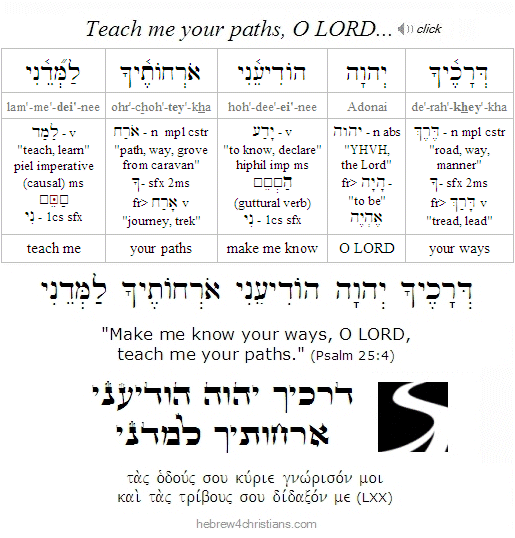 |
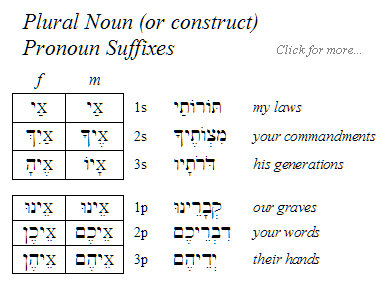 |
 |
Finding Purity of Heart...

07.22.19 (Tammuz 19, 5779) "Who shall ascend to the hill of the LORD? or who shall stand in his holy place? The one who has clean hands and a pure heart, who does not lift up his soul to vanity (לא־נָשָׂא לַשָּׁוְא) and who does not swear deceitfully" (Psalm 24:3-4). Yeshua expounded: "Blessed are the pure in heart, for they shall see God'" (Matt. 5:8). The Greek word translated "pure" is katharos (καθαρός), sometimes used describe the cleansing of a wound (catharsis), or to describe the unalloyed quality of a substance revealed through refining fire (the corresponding Hebrew word for the "pure of heart" (בַּר־לֵבָב), used in Psalm 24:4, comes from a root (בָּרַר) that likewise means to purify by fire). Metaphorically, then, purity of heart refers to separation from the profane - singleness of vision, wholeheartedness, passion, and focused desire for the sacred. As the Beatitudes reveal (Matt. 5:3-8), only those who are impoverished in spirit, who mourn over themselves and hunger for God's mercy, are refined by their struggle to see God (the Greek text implies these will see God now – with inward vision – and in the world to come). Because the pure in heart use ayin tovah, the good eye, they walk "in the light, as He is in the light" (Matt. 6:22). When we are undivided in heart, the Spirit imparts to us a hidden wisdom (1 Cor. 2:6-7) and we are able to discern hidden realities that others do not see (1 Cor. 2:14). As we center our affections on Yeshua, we become unified, made whole, and healed of our inner fragmentation. We see the Lord both in this world, through his effects, and then panim el panim (פָּנִים אֶל־פָּנִים), "face to face," in the world to come. Our hope purifies us for that coming great day of full disclosure (1 John 3:2-3; Heb. 12:14).
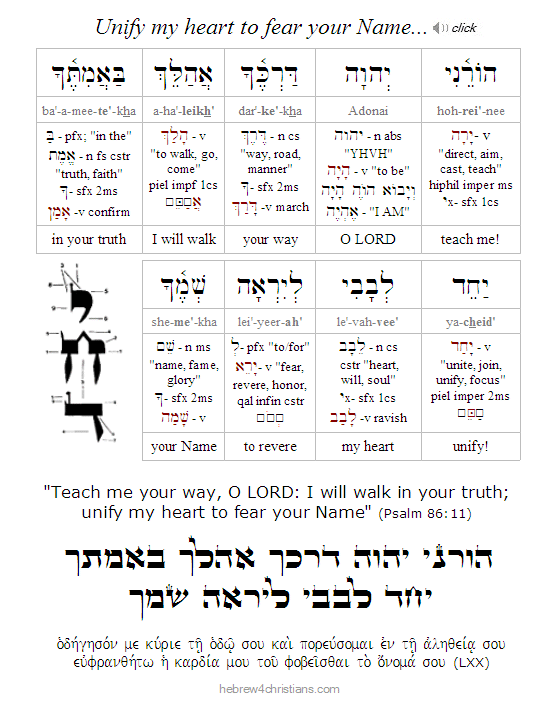 |
The heart is a miracle, an "engine" that distributes life, and the heartbeat is a great mystery, inexplicably pulsing with energy, contracting the muscles, pumping blood.. The pulse of the heart, then, is the "center of the center" of a person's physical life... If we are impure of heart, we will be inwardly divided, unfocused, fragmented, filled with destabilizing anxiety, envy, anger, and so on. More tragically, because we seek to escape ourselves, we will be devoid of a true center, without a focal point or abiding purpose, and therefore we will be lost to ourselves, wandering and without rest....
Some people tend to think of "purity of heart" in moral terms, such as not looking with lust on others, not coveting, etc., though these are symptoms of disordered love... Genuine purity is a matter of focus, of finding the "good portion" and the "one thing necessary" (Luke 10:42). Such purity heals you of ambivalence, settling the heart's inner decision. Purity of heart realizes that all that you've ever longed for is found in God alone. It is a great, great gift from heaven to know God as your heart's true desire - to fully understand that your relationship with Him is the ultimate concern and treasure of your existence.
As below, so above. It is the Spirit that gives life (John 6:63). The Holy Spirit imparts the "pulse" of the Divine Life, and we gain newness of life when we trust God for purification from our sins through Yeshua our LORD. As King David further attested: Lev tahor bara li Elohim – "Create for me a clean heart, O God" and renew a willing spirit within me (Psalm 51:10). Only the new heart (lev chadash) created by power of God's Spirit can possibly yield the life of the Spirit within us. The creation of a new heart represents the transformation of your whole inner nature - with the impartation of new appetites, new passions, new desires, and the rebirth of your will. If you struggle with being inwardly divided, fervently ask the LORD to give you the blessing of purity of heart...
Feeding God's Heart...
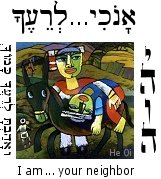
[ The following entry concerns this week's Torah reading, parashat Pinchas... ]
07.22.19 (Tammuz 19, 5779) As I've discussed elsewhere on the site over the years, the climax of the revelation at Sinai was not the giving of the Ten Commandments (עשרת הדיברות) to Israel but was instead the vision of the Altar of the sanctuary (מזבח המשכן). However -- as our Torah portion this week makes clear -- the central sacrifice upon this altar was the daily sacrifice (i.e., korban tamid: קרבן תמיד) of a defect-free male lamb with unleavened bread and wine. The LORD calls this "my offering" (קרבני) and "my bread" (לחמי) [Num. 28:1-8]. In other words, the service and ministry of the Mishkan (i.e., Tabernacle) constantly foretold the coming of the great Lamb of God (שה האלהים) who would be offered upon the altar of the cross to secure our eternal redemption (John 1:29; Heb. 9:11-12).
The sacrifice of the lamb represents "God's food," a pleasing aroma (ריח ניחחי), for it most satisfied the hunger of God's heart (Eph. 5:2). Indeed, Yeshua's offering upon the cross represents God's hunger for our atonement, our healing from the sickness of death, since it restored what was lost to Him through sin, namely, communion with his children. God could never be satisfied until He was able to let truth and love meet (Psalm 85:10).
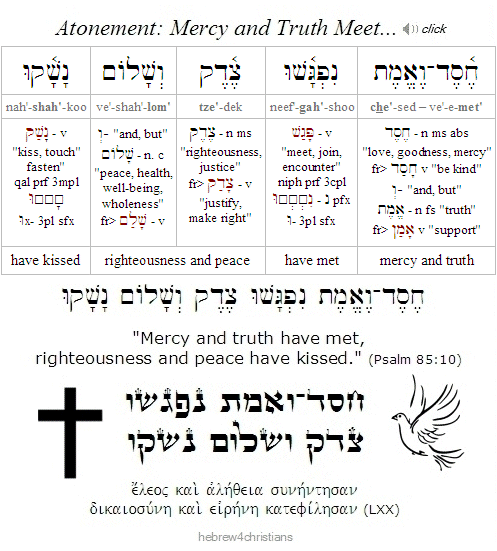 |
Sometimes we say that we "hunger for God," but it is vital to remember that it is God who first hungers for us. God desires our love and fellowship. He comes to seek fruit among the trees - but does He find any? He walks in the cool of the day, calling out to us, but are we attuned to hear His voice? Do we accept the invitation to be in His Presence? When God "knocks on the door of your heart" to commune with you, what "food" will you be serving? (Rev. 3:20). Every day we are given an opportunity to "feed God" through expressing faith, hope, and love. Ultimately it is our obedience to the truth is what "feeds" Him: "Behold, to obey is better than sacrifice, and to hearken than the fat of rams" (1 Sam. 15:22).
For more on this subject, see "The Hunger of God's Heart."
Parashat Pinchas - פינחס
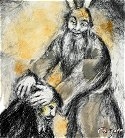
07.21.19 (Tammuz 18, 5779) Last week's Torah portion (i.e., parashat Balak) first introduced us to Phinehas (i.e., Pinchas), the son of Eleazar the priest (and grandson of Aaron), who, during the tragic rebellion at Baal Peor, zealously removed evil from Israel by driving a spear through a tribal prince who was brazenly cavorting with a Midianite princess in defiance of God's law. On account of Pinchas' zeal for the truth of Torah, God stopped the plague and Israel was delivered from destruction... This week's Torah portion (i.e., parashat Pinchas) begins with the LORD rewarding Pinchas by granting him a "covenant of peace" (בְּרִית כְּהֻנַּת עוֹלָם) and officially promising to incorporate him into the priestly line of Israel. As I hope you will see, Pinchas pictures the Messiah Yeshua, and the covenant of priesthood given to him is a picture of the greater priesthood after the order of Malki-Tzedek.
Jewish tradition says that when Aaron and his sons were commissioned as the exclusive priests of Israel (Exod. 40:12-15), the office applied only to themselves and their future descendants. Since Aaron's grandson Pinchas had already been born at the time the promise was given, however, he did not automatically receive this honor, especially since his father Eleazar (the son of Aaron) was married to an "outsider" -- namely, the daughter of Yitro (also called Putiel, Exod. 6:25). This explains Rashi's statement that the other tribes mocked Pinchas. How dare this "son of an outsider" kill a nassi (prince) of Israel (i.e., Zimri), especially since Pinchas' mother was regarded as an idol worshipper! The LORD honored Pinchas' zeal, however, and overruled the tribalism of the Israelites, and he was therefore elevated to be a priest with special honor before the LORD.
God looks at the heart, chaverim, and is able to make those who have zeal for Him true priests of the LORD! You don't have to be born Jewish to impress the LORD God of Israel, since He's "no respecter of persons" (Rom. 2:11). Not only can He create spiritual children of Abraham from the stones of the ground (Matt. 3:9; Luke 3:8), but He can turn someone considered a non-Jew (by the rabbis, anyway) into a highly honored priest of Israel (1 Pet. 2:9-10). Indeed, many descendants of Pinchas later became the most faithful of the High Priests of Israel during the First Temple period.
Note that according to one midrash, when Zimri and Cozbi (the Midianite princess) were cavorting, they actually ran inside the Tabernacle compound itself, directly past Moses and the people who were weeping at its entrance (Num. 25:6)! Pinchas then took a spear from the Tabernacle guards and followed after them. When he caught up with them within the Tent of Meeting itself, he pierced them through (Num. 25:7-8). After this, thousands of men from the tribe of Simeon ran in after him, seeking to kill him. Pinchas was in such a state of terror that "his soul left him" and the souls of Nadav and Abihu (Aaron's deceased sons) entered his body -- and by this means he became a Kohen.
Parashat Pinchas (like parashat Emor in Leviticus) also mentions of all of the (sacrifices of the) mo'edim (holidays) given to the people Israel (Num. 28). These include the daily (tamid), weekly (Shabbat), monthly (Rosh Chodesh) sacrifices, as well as the sacrifices assigned to the special holidays: Passover, Shavuot, Rosh Hoshannah (Terumah), Yom Kippur, Sukkot and Shemini Atzeret. The sages said that remembering the joys of the Temple and the special celebrations of the Jewish people promote the call to do teshuvah during the otherwise somber time of the Three Weeks of Sorrow.
Pinchas Audio Broadcast...
The audio broadcast for parashat Pinchas provides and overview of the Torah reading as well as a discussion of the meaning of faith, the importance of the gospel message, and how Yeshua is revealed in the life of Pinchas... I also discuss the "Three Weeks of Sorrow" leading up to the somber holiday of Tishah B'Av as well as the significance of the Jewish holidays (mo'edim) in general. For more see the link below. Shavuah tov chaverim.
The Just Shall live by Faith...

07.19.19 (Tammuz 16, 5779) Abraham is called the "father of faith" (אָב לְכָל הַמַּאֲמִינִים) because he resolutely believed in the promise of God even when there was no physical evidence for his confidence. Abraham had to close his eyes to this world and walk in the "darkness of faith" to see the divine light that transcends the atmosphere of this fallen realm. "He did not look to his own body, which was as good as dead (since he was about a hundred years old), nor the barrenness of Sarah's womb; he did not waver in unbelief about the promise of God but was strengthened by faith, giving glory to God... and therefore God regarded it as righteousness" (Rom. 4:19-22, Gen. 15:6). Like Job who said, "Though he slay me I will trust in him" (Job 13:15), so Abraham chose to trust God despite the crucifixion of his world in the sacrifice of his son Isaac. Likewise we must come to the end of our hope in this world - surrendering the loss of all things as we stare into the abyss of nothingness and there affirm that God will shine forth his light (Psalm 18:28). The life of faith leads us to the midst of the "dark cloud," alone with God, and there we turn to him in hope, surrendering to his will, trusting in his promise that he will somehow bring life from the dead...
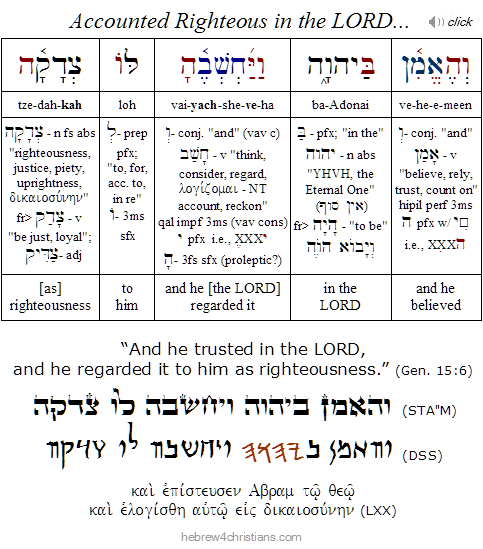 |
We are made right with God (i.e., "justified") by trusting in the sufficiency of what God does for us, and not by means of our own "good deeds" or supposed virtue (Titus 3:5; 2 Tim. 1:9; Eph. 2:8-9). This is the essence of the unconditional "covenant of promise" that Abraham was given when he was asked to count the stars as God promised that he and Sarah would bear a son in their old age (see Gen. 15:1-18). Note that the apostle Paul referred to this covenant to explain the message of the gospel -- not to the covenant the LORD "made with the fathers when they left Egypt" (Jer. 31:32) -- even though Abraham himself obeyed all of God's commandments 400 years before the giving of Torah at Sinai (Gen. 26:5; Gal. 3:17).
I once read from a Christian devotional book that said that in order to be made right with God and receive divine salvation you must: 1) believe in Yeshua's substitutionary death and resurrection; 2) turn away from your sins, and 3) ask him to be the Lord and Savior of your life. The author then went on to explain that "this means you have to renounce and turn away from everything in your life that is contrary to what God wants: you must give up your sinful self-centeredness and turn to God." Now while at first glance this approach sounds Biblical, it implicitly assumes that your own goodness and self-effort will save you. After all, if you could turn away from your sins and from "everything in your life that is contrary to what God wants," and if you could simply "give up your sinful self-centeredness," then there really would be no need for the miracle of spiritual rebirth, no need for the power of God to impart a new nature to you, and therefore no need for the cross of Messiah to save you from the verdict of the moral law. Contrary to the false gospel that God helps those who help themselves, we must emphasize that God helps precisely those who cannot help themselves... Indeed the teaching of the New Covenant is clear: God will perform a miracle by putting his Torah within your will, writing it on your heart, and making you into his child (Jer. 31:33; Ezek. 36:26; John 3:3; 2 Pet. 1:4). All this comes from the power of God alone, however, not by human aspiration or resolution or good works (John 1:12-13; 6:44; Rom. 10:9-12; Titus 3:5). Like father Abraham, we are "made right" with God by believing in his power, relying on his Spirit, and trusting in his promise of love (Hab. 2:4; Rom. 4:13-25). Yeshua did not come to make a new religion but to give life to the dead. Therefore it is no longer "I" who live but Messiah in me, which is to say that we do not possess the miracle but the miracle possesses us... You are made into a new creation (בְּרִיָּה חֲדָשָׁה); your former life is passed and now all things become new (2 Cor. 5:17). But again you are not saved by reforming your character or making oaths of faith, but trusting in God's power and character. This is the way to receive the blessing. You come to God just as you are - acknowledging the truth of your need for healing and deliverance from your sinful condition, pressing past the verdict of the law in your desire for God's compassion (Psalm 85:10; Rom. 4:25). That's the heart of the gospel, after all. All you can do is bring is your brokenness and need to God for healing and then to respond to God's love by receiving it with humility and gratitude. Being made right with God is the faith of accepting that you are accepted despite your unacceptability because of God's great mercy for your life.
We need the power of God to save us from the hell of ourselves and from slavery to our sinful nature. True freedom comes by Messiah's achievement, not our own. The blessing of being rightly related to God is received by the person who abandons his own way and trusts in the One who "justifies the ungodly" (Rom. 4:5). This is called the "righteousness of God" manifested "outside the Law" (χωρὶς νόμου), though the Law and the Prophets bear witness to its reality (Rom. 3:21). There are two aspects to your deliverance by God's grace (Rom. 3:24). First, you trust that the death of Messiah entirely deals with your sin -- you identify with Yeshua as your sin bearer at the cross (semikhah) -- and you accept God's verdict that you are "not guilty." You are "justified" by faith (i.e., "just-if-I'd" never sinned; "just-if-I'd" always obeyed). Sin is taken out of the way, and you "die to the terlaw" so that you may be in new covenant (relationship) with God (Gal. 2:19; Rom. 7:4), Second, you learn to live in the power of Yeshua's resurrection life; you learn to "be who you are" in Messiah: "Christ in you, the hope of glory" (Col. 1:27). The Torah of the Spirit of life (תּוֹרַת רוּחַ הַחַיִּים) imparts power for you to bear fruit for God (Rom. 8:2). Salvation means not only freedom from the guilt of your sin, but freedom from sin's power over you: "For one who has died has been set free from sin" (Rom. 6:7). You are forgiven by trusting in Messiah's death in your place, and you are made holy by trusting in his victorious life, but the miracle is made real by the agency of God's power, not your own. יְשׁוּעָתָה לַיהוָה - Salvation is of the Lord!
Note: We must be careful to "rightly divide" (ὀρθοτομέω, lit. "cut straight") the word of truth, lest we find ourselves confusing the great covenants of God and how they are to be "walked out" in our lives (2 Tim. 2:15). There is "Torah" (תּוֹרָה) and there is "covenant" (בְּרִית). Torah is a general word that means "instruction" and is always a function of the underlying covenant of which it is part. Torah is therefore our response to the covenantal actions of the LORD God of Israel. Followers of Yeshua are therefore not "anti-Torah" even if they understand this word in relation to the new and better covenant of God (Heb. 8:6). There is indeed a Torah of the New Covenant, just as there is Torah of the older one. Understood in this way, Messianic believers are called to be "Torah Observant," since that simply means adhering to the instruction of King Yeshua who is the embodiment of all genuine truth from God.
For more on this topic see: "Do we die to the Law?"
Inner to Outer Reality...

07.19.19 (Tammuz 16, 5779) In the Shema we recite: "these words that I command you this day shall be 'on your heart (עַל־לְבָבֶךָ),' and you shall repeat them diligently to your children (וְשִׁנַּנְתָּם לְבָנֶיךָ)," which reveals the necessary order: When the words of Torah are made a part of your heart, your children will be taught in the truth. The same approach must be used regarding the message of the Messiah, too: "Go into all the world and preach the gospel, and then use words." Notice that the phrase, "And you shall repeat them" i.e., וְשִׁנַּנְתָּם comes from שָׁנָה, meaning "repeat," do again, and from which the Hebrew word shanah, "year" also derives.. As we live our faith, observing the mo'edim (i.e., holy days or "appointed times") year after year, the word is made more and more a part of our hearts.
Finding True Riches...

07.19.19 (Tammuz 16, 5779) The Torah appeals, in the Name of the Lord, that we should be charitable people, reflecting his heart of kindness. Indeed giving to others imparts the blessing of God: "Take for Me an offering" (וְיִקְחוּ־לִי תְּרוּמָה), the Scripture states, rather than "Give for Me an offering," since we receive more than we give through acts of charity (Exod. 25:1-2). The early sages explained that when we give tzedakah (charity), it may seem like we giving something from our own substance for the sake of another, but in truth we are actually taking, since we are spiritually receiving back much more than we give (both in this life and especially in the world to come). The reward we get in return for our giving is always far greater than whatever we originally gave (Mal. 3:10), and this implies that giving is really a kind of "taking..." This agrees with Yeshua's teaching: "Give, and it will be given to you. Good measure, pressed down, shaken together, running over, will be put into your lap. For with the measure you use it will be measured back to you" (Luke 6:38). Likewise he said, "Truly, I say to you, as you did it to one of the least of these my brothers, you did it to me" (Matt. 25:40). "Whoever is generous to the poor lends to the LORD, and he will repay him for his deed" (Prov. 19:17). The sages consider the act of giving to others as one of the greatest of the commandments, since it is the essence of God to give to His creation, and it is through analogous giving that we are enabled to see the Divine Presence, as it is written in the Scripture, אֲנִי בְּצֶדֶק אֶחֱזֶה פָנֶיך - "I will see your face in tzedakah" (Psalm 17:15).
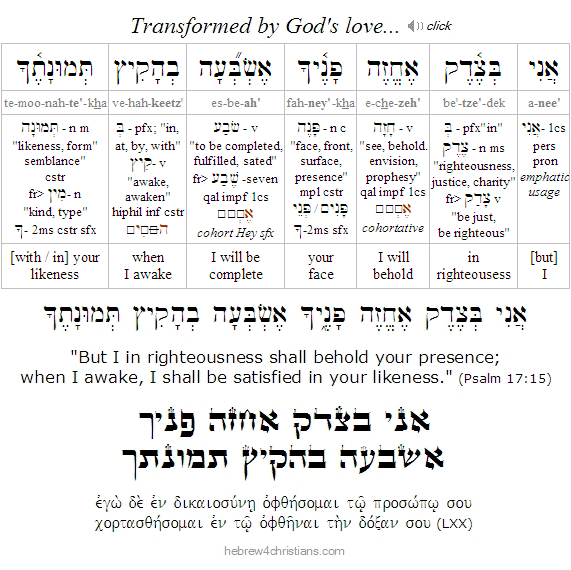 |
It is written that "God loves a compassionate (ἵλεως) giver" (2 Cor. 9:7). Followers of the Messiah Yeshua are to be marked by goodness (טוֹבָה) expressed in generosity (נְדִיבוּת). The fruit of the Spirit (פְּרִי הָרוּחַ) listed in Galatians 5:22-23 fulfills the requirements of the Law, but they constitute the supernatural outgrowth of the grace and love of God in the heart of one who trusts in Yeshua as Messiah (see John 15:1-8). Our lives are sanctified in the manner in which they were initially justified: wholly by faith in the love and grace of God.
לא־יוֹעִילוּ אוֹצְרוֹת רֶשַׁע
וּצְדָקָה תַּצִּיל מִמָּוֶת
loh-yoh·ee·loo · ohtz·roht · re·sha'
oo-tze·de·kah · ta·tzeel · mee·mah·vet

"Treasures gained by wickedness do not profit,
but tzedakah delivers from death."
(Prov. 10:2)

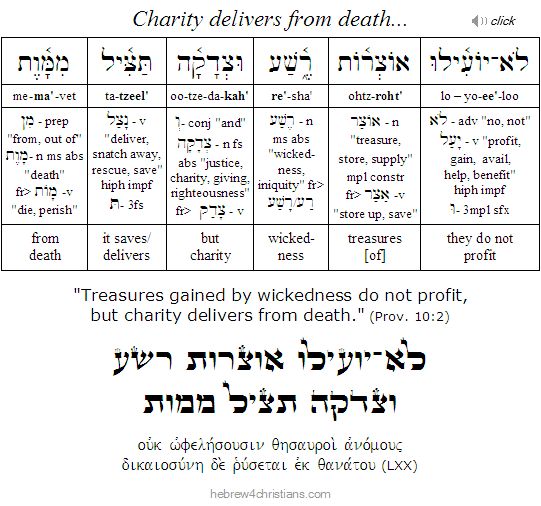 |
One of the middot ha-lev (qualities of heart) of the righteous soul is to be giving to others. This is simply part of the ethos of the Jewish soul. Rabbi Asi says, "Charity equals in importance to all other mitzvot combined." And Rabbi Yehudah likewise says, "Ten hard things have been created in the world. The rock is hard, but iron shatters it. Iron is hard, but fire softens it. Fire is powerful, but water extinguishes it. Water is heavy, but clouds carry it. Clouds are thick, but wind scatters them. Wind is strong, but a body resists it. The body is strong, but fear crushes it. Fear is powerful, but wine banishes it. Wine is strong, but sleep works it off. Death is stronger than all, yet tzedakah (charity) delivers from death, as is written, צְדָקָה תַּצִּיל מִמָּוֶת - "charity delivers from death" (Prov. 10:2). Most importantly, when we give to others, we emulate the Lord and are enabled to sense his Presence, as it is says in the Scripture, אֲנִי בְּצֶדֶק אֶחֱזֶה פָנֶיך - "I will see your face in tzedakah" (Psalm 17:15).
 |
The Struggle of Faith...

07.19.19 (Tammuz 16, 5779) I know many of you are in pain, struggling to hang on to hope, waiting for the fulfillment of the promise of your salvation in Yeshua. Keep the fire of your heart burning, friend... Rabbi Nachman once told a person who was struggling with his faith: "It is written that all creation was brought into being because of people like you. God saw there would be people who would cling to our holy faith, suffering greatly because confusion and doubt would plague them. God perceived that such would overcome these doubts and troubles of heart and remain strong in their belief. It was because of this that God brought forth all creation." Good words... Never yield to despair, since that leads to further darkness and fear. Press on and keep fighting the "good fight" of faith (1 Tim. 6:12). Remember that you infinitely matter to heaven; your life has great value; you are significant and you are truly loved by our Heavenly Father. There is a "future and a hope" reserved for you; there is "a white stone, and on that stone will be written a new name that no one can understand except the one who receives it" (Rev. 2:17). May "the trial of your faith, being much more precious than of gold that perishes, though it be tested with fire, be found to result in praise and glory and honor at the revelation of Yeshua the Messiah" (1 Pet. 1:7).
כִּי אָנכִי יָדַעְתִּי אֶת־הַמַּחֲשָׁבת
אֲשֶׁר אָנכִי חשֵׁב עֲלֵיכֶם נְאֻם־יְהוָה
מַחְשְׁבוֹת שָׁלוֹם וְלא לְרָעָה
לָתֵת לָכֶם אַחֲרִית וְתִקְוָה
kee · ah·no·khee · yah·da·tee · et · ha·ma·cha·shah·voht
a·sher · ah·no·khee · choh·shev · a·lei·khem · ne·oom · Adonai
mach·she·voht · shah·lohm · ve·loh · le·rah·ah
lah·teit · lah·khem · a·cha·reet · ve·teek·vah

"For I know the plans that I have for you, declares the LORD,
plans for blessing and not for evil, to give you a future and a hope."
(Jer. 29:11)

Hebrew Study Card
The heart of the cross of Messiah is that God regards you as personally worth dying for, and indeed, that your life is worth the exchange of His own... You are treasured; you are loved. This matter is of first importance (1 Cor. 15:3-5). "For God so loved the world, that he gave his only Son, that whoever believes in him should not perish but have eternal life" (John 3:16). We must begin here, first, always... Chazak chaverim.
Beware of False Prophets...

07.18.19 (Tammuz 15, 5779) "Beware of false prophets," Yeshua warned, "who come to you in sheep's clothing (literally, "the skins of sheep," ἐν ἐνδύμασι προβάτων), but who inwardly are ravenous wolves. You will recognize them by their fruits" (Matt. 7:15; cp. 2 Pet. 2:1). However, because they come in disguise, pretending to be "children of light," we must be all the more vigilant. On the one hand, we must beware of those who "wrap themselves in a tallit" (legalists) and teach that we should come under the yoke of the law (Matt. 23:15), and on the other, we must beware those who minimize words of the holy Torah, who falsely claim that the way to heaven is "broad," and that we therefore are "free" to walk after the desires of our own hearts (antinomianists). We must use godly discernment, friends. Note this well: The LORD allows false teachers in our midst to test our hearts: "For there must be (δεῖ) factions among you so that those who are genuine among you may be recognized" (1 Cor. 11:19). Therefore "test the spirits" to see if they are "of God," that is, whether they focus on the righteousness of God given exclusively through Yeshua, the "narrow way that leads to life" - or whether they focus on something else. The Holy Spirit always centers the heart on the glory of God revealed in Yeshua (John 16:14; 1 Cor. 2:2, etc.).
It is written in our Scriptures, "Watch out, friends, lest there be in any of you an evil, unbelieving heart (לֵב מְרֻשָּׁע וַחֲסַר אֱמוּנָה), leading you to fall away from the living God, but exhort one another every day, as long as it is called "today," that none of you may be hardened by sin's deception" (Heb. 3:12-13). Note that the Greek word translated "exhort" here (i.e., parakaleo: παρακαλέω) comes from the same root used to describe the work of the Holy Spirit to strengthen God's people: As Yeshua said: "But the Parakletos (῾ο παράκλητος), the Holy Spirit, whom the Father will send in my Name, will teach you all things and bring to your remembrance all that I have said to you" (John 14:26). Each and every day, then, we need exhortation from one another to remind us of what is real to encourage us to turn toward the Living God (אֱלהִים חַיִּים). As we do this we serve as vessels of God's Spirit, empowering us to remain steadfast and constant in our devotion, and guarding our hearts from the temptation to despair....
 |
Healing and Affliction...

07.18.19 (Tammuz 15, 5779) How do we suffer gracefully, without becoming hardhearted and bitter? How do we cope with the disappointment of unanswered prayer? How do we bear with the inevitable grief and loss of those whom we love? How do we understand some of the promises of God such as "ask whatever you will and I will do it" in relation to life in this world? Does God really listen to our prayers? Does he really care what happens to us?
Our options are somewhat limited regarding the existential question of why we suffer. We can either ignore the question altogether or face it directly. If we seek to earnestly answer the question, however, we again only have a couple of "live" theological options. First, if we affirm that God is both all-powerful and all loving but will not remove our personal suffering on the basis of some sort of "principle" (for example, because he will not overrule the consequences of our free will), then he may seem indifferent to our pathos, since this would seem to imply that God values the ideals of justice more than those of mercy and compassion. It should be clear that this option is not viable for believers in our Lord Yeshua, who clearly taught us that God desires "mercy and not sacrifice" and taught us to show compassion to all people (Matt. 9:13; 12:7; Matt. 6:15, etc.). Another approach is to affirm that God is indeed all-loving but not all-powerful. God simply can't intervene to end our suffering because he is unable to do so. God wants to bless us and take away our pain, but he's limited in his means to do so. In other words, evil exists independently of God's control as a powerful force that contends with and undermines creation. It should also be clear that this option is also not viable for believers in our Lord, since God is repeatedly affirmed to be "omnipotent" or all-powerful throughout the Scriptures (e.g., Job 42:1-2; Isa. 14:27, 43:13; Jer. 32:27; Dan. 4:35; Matt. 19:26; Psalm 147:5, etc.). This leaves us with the option that indeed God is all-loving, all-powerful, and therefore pain and suffering are "tools" in his hands, intended or permitted to work for his glory and for our ultimate good (Rom. 8:28). In other words, God uses suffering as a means of transformation of the soul (soul-building theodicy). In short, if we have trouble accepting God as our "Heavenly Father" who may use trouble in our lives to transform us in love, then we run the tragic risk of becoming bitter and resentful people. More can be said on this subject, of course, but this must suffice for now.
In light of such profound questions that so intimately affect our lives, it is important that we are "real" and honest with God... From our Torah we read: "You were not willing to go up but rebelled at the word of the LORD your God. And you murmured in your tents and said, 'Because the LORD hates us he has brought us out of the land of Egypt...'" (Deut. 1:26-27). We may decry the childish insolence of the people, we lament their lack of faith, and yet God was still speaking through Moses to Israel... The sages ask whether we can ever be justifiably angry at God, and answer that yes we can, because otherwise we could never love Him "bekhol levavkha," with all our heart (Deut. 6:5). Indeed, how can we claim to love God if we withhold the truth, lie to ourselves, and attempt to hide who we really are from Him? If you are angry at God, he already knows, so why the pretense? Being angry with God is part of being a real person in a real relationship with Him, and allowing yourself to express the truth of your heart to him is a sign of trust. God can "handle" the darker storms of your heart: trust Him to heal you this hour.
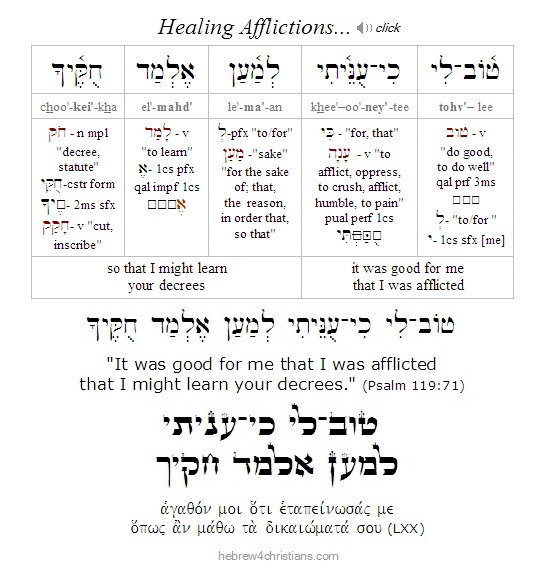 |
 |
The Way of Balaam...

[ This week's Torah portion centers around a strange character named Balaam (בִּלְעָם) who attempted to manipulate the LORD for his own twisted purposes. ]
07.17.19 (Tammuz 14, 5779) The Talmud mentions that Moses wrote a separate book called the "Book of Balaam" (Sota 5), a work that presumably tells the story of Balaam in greater detail than the Torah portion provides (Bava Basra 14b-15a). This non-canonical book did not survive over the centuries, much like other works mentioned in the Tanakh (such as the Book of Yashar (Josh. 10:13, 2 Sam. 1:18), the Book of the Acts of Solomon (1 Kings 11:41), the Book of the Chronicles of the Kings of Israel (1 Kings 14:19, 14:29), the Book of Nathan the prophet (1 Chron. 29:29), etc). But notice that this implies that not everything Moses wrote was considered Scripture (since the book was rejected from inclusion in the Jewish canon).
Jewish tradition considers Balaam to be a prophet with the true gift of nevuah (נְבוּאָה, prophecy), although (paradoxically) he was an adversary of the LORD and an enemy of the children of Israel. The midrash (Bamidbar Rabbah 20) maintains that Balaam was "one who was [potentially] as great as Moses himself," but since he abused his spiritual gifts, he was judged and came to ultimate ruin. Instead of submitting himself to the truth and willingly blessing Israel, Balaam turned away from his true purpose, and "the portion of the Book he was meant to write (i.e., the "Book of Balaam") was decreed to be written by Moses instead." The tale of Balaam, then, is a sober warning to us all.
We must be vigilant. Balaam's legacy is with us today. The New Testament Scriptures speak of "the way of Balaam, the son of Beor, who loved gain from wrongdoing" (2 Pet. 2:15), "Balaam's error" (Jude 1:11), and "the teaching of Balaam, who taught Balak to put a stumbling block before the sons of Israel" (Rev. 2:14). Note that the doctrine of Balaam is associated with the licentious "doctrine of the Nicolatians" who "conquered the people" [νικος + λαος] in order to pursue their own ecclesiological/spiritual lusts (Rev. 2:6,14-15).
What is the "way of Balaam" or Balaam's error? Well, though Balaam appeared to follow God's instructions, his inner attitude was actually one of covetousness that resulted in a subversive hostility to God's expressed desire and plan. Balaam was therefore double minded, antagonistic to the way of truth, and therefore quite literally insane (see 2 Pet. 2:16). When Balaam told Balak's emissaries that he could "only speak what God put in his mouth," he was being literal, not moral... This is revealed in the fact that he was willing to try three times to curse God's purpose, but every time God thwarted his evil intent (Josh. 24:9-10). Despite God's dramatic intervention in his life, Balaam was unrepentant and defiant, and later succeeded in corrupting Israel by devising a scheme to tempt the men of Israel to commit fornication (Num. 31:16, Rev. 2:14-15).
Balaam was a hireling, a spiritual prostitute who wanted to sell his services. He was in possession of charisma which he used to seduce others into disobedience. He was paid for exercising his gifts without regard for the truth (Num. 22:7, Deut. 23:4-5, 2 Pet. 2:15). As Yeshua said, "You cannot serve God and mammon" (Matt. 6:24).
The tragic story of Balaam warns us to check (and re-check) our motives. By itself, the study of Scripture is not enough -- even if we take great pains to properly understand its meaning. Our heart attitude is definitive. Our will to serve God in the truth determines our way in this life. "If anyone wills to do His will he will know of the teaching..." (John 7:17). We cannot rightfully use the Scriptures to justify our ideas about God or own pet theological doctrines. We cannot manipulate God in order to serve our own theological visions... We must humble ourselves; we must make the effort to honestly listen; and we must be willing to surrender to the truth. It is the love of the truth that brings salvation to us (2 Thess. 2:10-12), not gaining power through religious knowledge or passing ourselves off as religious authorities....
When we rebel against God's will in our lives, we invite disaster. If we get into "vain repetitions" before the LORD, He might take us down a path that reveals why His will is best, despite our personal "vision" or preferences. Inevitably, coming up against God like this is dangerous and leads to various forms of madness. Making a pretense of "hearing from God" only what you want to hear leads to self-deceptive delusional thinking, hardening of the heart, perversity of the will, and indeed, eventual self-destruction.... God will never allow us to use His Word to justify our own lusts. May God help each of us to honestly love the truth....
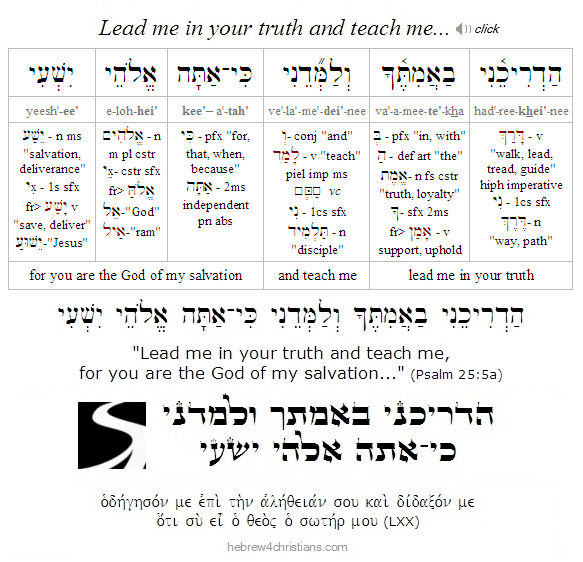 |
 |
The Enigma of Balaam...
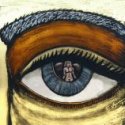
[ The following entry concerns this week's Torah reading, parashat Balak... ]
07.17.19 (Tammuz 14, 5779) What are we to make of the enigmatic character of Balaam (i.e., בִּלְעָם בֶּן־בְּעוֹר)? Was he a prophet or a puppet of God? Nehama Leibowitz (1906-1997) notes two essential differences between Balaam and the Hebrew prophets. First, Balaam sought "special visitations and visions," building altars and performing rituals to "force" the prophetic spirit. The Hebrew prophets, on the other hand, never engaged in these sorts of activities to hear from the LORD, and many were reluctant messengers, convinced of their own unworthiness and nothingness. Second, the Hebrew prophets cautiously spoke in the name of the LORD ("thus saith the LORD...") to authenticate their message, but Balaam took credit for his visions, flamboyantly describing himself as a great "seer" with special powers. Based on Joshua 13:22 (which describes him as a sorcerer), it is likely that Balaam was given a temporary gift of prophecy, perhaps like the "witch of Endor" was allowed to temporarily communicate with the dead (1 Sam. 28:7-20). In other words, God raised up Balaam to demonstrate his authority over the powers of darkness and to reassure Israel of God's ongoing protection of his people.... Ein od milvado.
In the New Testament, Balaam is regarded as one who sought to corrupt others for his own personal gain. The Apostle Peter does not call him the "son of Beor" but "son of Bosor" (τοῦ Βοσόρ), apparently a play on the Hebrew word basar (בָּשָׂר), meaning "flesh," implying that he was a "son of carnality" who enticed of Israel to sin at Baal Pe'or (see 2 Pet. 2:15; Num. 31:16). Peter further described him as a spiritual hireling who loved the "wages of unrighteousness" (μισθὸν ἀδικίας ἠγάπησεν), and who (like the Sophists of ancient Greece) was willing to sell his spiritual "services" without regard for the truth (Num. 22:7, Deut. 23:4-5). He knew he should not prophecy about Israel, but he so loved the prospect of reward and the flattery of men that he justified his venture into darkness. "An evil eye, a haughty spirit, and a lusting soul - these are signs of disciples of the wicked Balaam" (Avot 5:22). For more on this topic, see "The Way of Balaam" in the parashah summary links.
Note: The Hebrew word melekh (מֶלֶךְ) means "king" and shares the same letter value as the word lemech (לֶמֶךְ), a name that means "powerful," but can also mean "fool." The sages reasoned that since the letter Mem represents the brain (מוֹחַ) or thought (מַחֲשָׁבָה), and the letters Lamed-Kaf refers to the kidneys (כליות), a king is one who uses right thinking to rule the heart (מ-לך), but a fool reverses the order and makes thinking a servant of the passions and the lower nature... Therefore Balaam was properly regarded as a fool.
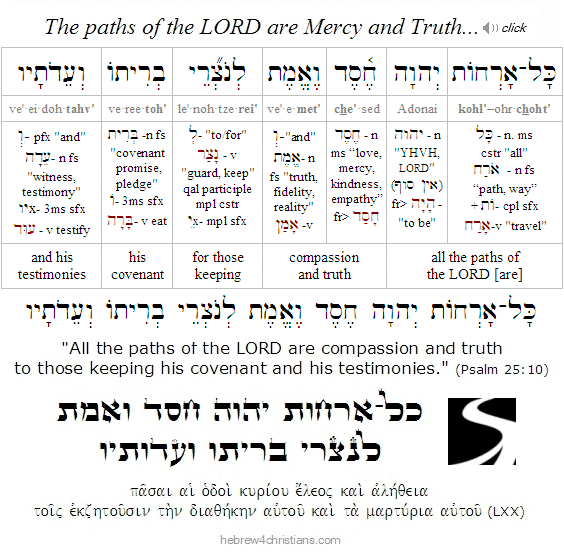 |
 |
Curses turned to Blessings...

[ In our Torah portion this week (Balak), we read how Balaam intended to curse the Israelites, but God "took hold of his tongue" and made him bless the people instead... ]
07.16.19 (Tammuz 13, 5779) God can (and does) turn curses into blessings (see Neh. 13:2). For example, Joseph was blessed despite the ill-will of his brothers: "You devised evil against me, but God devised it for good" (Gen. 50:20). Note that the same verb for "devised" (i.e., chashav: חשׁב) is used to describe both the evil intent of the brothers and the good intent of the Lord. This teaches us that God overrules the malice of men to effect his own good purposes, and therefore we can rightfully affirm gam zu l'tovah (גַּם זוּ לְטוֹבָה), "this too is for good" (Rom. 8:28). Underlying the surface appearance of life (chayei sha'ah) is a deeper reality (chayei olam) that is ultimately real, abiding, and designed for God's redemptive love to be fully expressed. Resist the temptation, therefore, to judge by mere appearances. Forbid your troubles (or the troubles of this world) to darken the eye of faith. Do not unjustly judge God's purposes or try to understand His ways. As the story of Balaam shows, God makes even the wrath of man praise Him (see Psalm 76:10). "Then God opened Balaam's eyes, and he saw the Angel of the LORD (מַלְאַךְ יְהוָה) standing in the way, with his drawn sword in his hand. And he bowed down..." (Num. 22:31). Indeed, every knee will bow to the LORD our God and Savior (Isa. 45:22-23; Phil. 2:10-11).
We find comfort that the schemes of the wicked are ultimately subject to the sovereign purposes of the LORD our God. Ein od milvado (אֵין עוֹד מִלְבַדּו) - there is no power that can be exercised apart from God's consent and overarching will... Indeed all authority on heaven and earth belongs to Yeshua, the "the Ruler of the Kings of the earth" (עֶלְיוֹן לְמַלְכֵי־אָרֶץ). As it is written, "All the nations you have made shall come and worship before you, O Lord, and shall glorify your name" (Psalm 86:9). Amen. Hashevenu, Adonai...
 |
The Doctrine of Balaam...

[ The following entry concerns this week's Torah reading, parashat Balak... ]
07.16.19 (Tammuz 13, 5779) The "doctrine of Balaam" (ἡ διδαχή Βαλαάμ) is the wicked strategy of enticing others to sin by encouraging them to "eat food offered to idols" and to engage in sexual immorality (Rev. 2:14). This was how Balaam was able finally to curse the Israelites at Baal Peor, after all (see Num. 25:1-10; 31:16). In short, Balaam's doctrine was one of "syncretism," advocating a mindless "tolerance" that arrogantly claimed that all religions are equally true, and therefore all are equally false... Such "tolerance" is a charade for moral and spiritual nihilism that creates weakened people easily controlled by political fascism. In ancient Rome, official "tolerance" led to the brutal intolerance of the "Imperial Cult" where the power of the State (represented by the Emperor) was worshiped. In our age, the doctrine of Balaam first entices people to "eat food offered to idols," that is, to partake in the irrational dogma of "absolute tolerance" and unthinking universalism. After opening the heart to accept such idolatry, sexual immorality is the natural expression, a consequence of self-deception. We must remain vigilant: God sets us free from the slavery of surrounding culture to become a witness of the truth. Assimilating with this world and its political ideals and cultural idols is a form of spiritual adultery. Do not fool yourself: Whoever makes himself a friend of the world is an enemy of God (James 4:4).
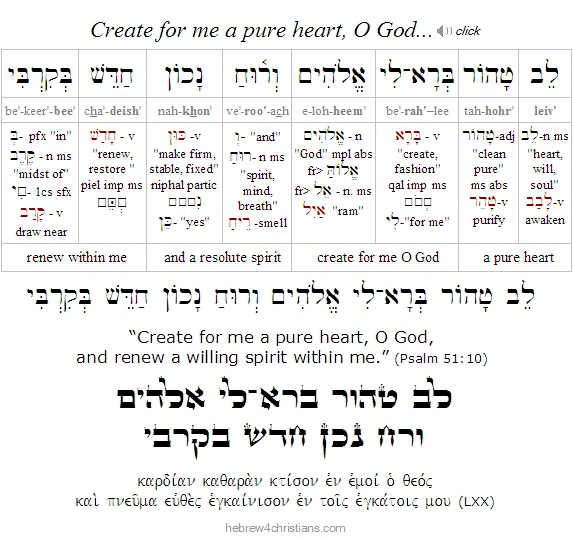 |
 |
The Star Still Shines...

[ The following entry concerns this week's Torah reading, parashat Balak... ]
07.16.19 (Tammuz 13, 5779) Darakh kokhav mi'Ya'akov: "A star shall come out of Jacob..." Amazingly, the prophet Balaam – who may have been the forebear of the "magi of the east" (Matt. 2:1-2) – actually foresaw the coming of the Messiah: "I see him, but not now; I behold him, but not near: a star shall come out of Jacob (כוכב מיעקב), and a scepter shall rise out of Israel" (Num. 24:17). Balaam's prophecy described the coming of the Messiah and his reign in two distinct aspects: "A star from Jacob shall come" (literally, "shall lead the way," i.e., דרך), refers to Messiah's first coming as the way of life (i.e., הדרך החיים, John 14:6), "and a scepter shall arise (i.e., וקם שׁבט) from Israel," refers to Messiah's second coming to establish the kingdom of Zion upon the final redemption.
דרך כוכב מיעקב
וקם שׁבט מישׂראל
da·rakh · ko·khav · mee·ya·a·kov
ve·kam · she'·vet · mee·yees·ra·el

"A Star shall lead from Jacob,
and a Scepter shall arise from Israel"
(Num. 24:17)

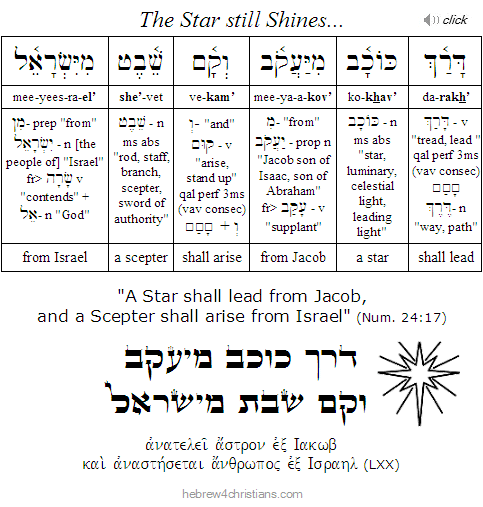
He is Faithful and True...
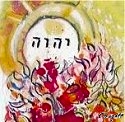
[ In our Torah portion this week (Balak), we read how Balaam intended to curse the Israelites, but God "took hold of his tongue" and made him bless the people instead... ]
07.15.19 (Tammuz 12, 5779) It is encouraging to understand that despite the repeated failures of the Israelites in the desert, the LORD never let go of his people... Indeed, as the story of Balaam reveals, if a spiritual enemy should secretly arise to curse Israel, God would take the sorcerer "by the tongue" to evoke God's blessing instead (Deut. 23:4-5). As Balaam himself later confessed: "there is no sorcery (i.e., nachash: נַחַשׁ) against Jacob; there is no divination (i.e, kesem: קֶסֶם) against Israel" (Num. 23:23). Unlike scheming Balaam, who was willing to say whatever people wanted to gain temporal reward, God is "not a man that he should lie, nor a son of man, that he should change his mind" (Num. 23:19, 1 Sam. 15:29). Whatever the LORD has promised he will invincibly perform: His word is full of integrity and truth: "The grass withers, the flower fades, but the word of our God will stand forever" (Isa. 40:8). Amen. The God of Israel is forever faithful in his love, and no one can overrule his desire (Num. 23:20; Rom. 11:29; Isa. 40:13). You can trust in your promised future, friend. As it is written: "No weapon fashioned against you shall succeed, and you shall refute every tongue that rises against you in judgment. This is the heritage of the servants of the LORD (זֹאת נַחֲלַת עַבְדֵי יְהוָה) and their vindication from me, declares the LORD" (Isa. 54:17).
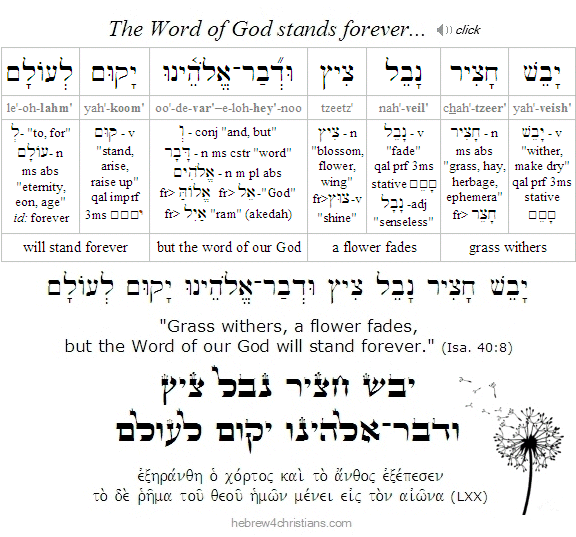 |
 |
Three Weeks of Sorrow...

07.14.19 (Tammuz 11, 5779) According to Jewish tradition Moses shattered the tablets on the 17th day of the 4th month, after he came down from Mount Sinai and found the people worshipping the Golden Calf. Today, this tragic date is commemorated as a fast day (i.e., the "Fast of Tammuz"), which marks the beginning of a three week period of mourning that culminates on the 9th of Av (i.e., "Tishah B'Av"), the date the Israelites were sent into exile from the promised land because they believed the evil report of the spies (Num. 14:20-35).
During this three week period of national mourning, the weekly readings from the prophets are all "Haftarahs of Rebuke" that warn the people about imminent judgment from heaven, and therefore the theme of most Jewish religious services is teshuvah (repentance). In addition, weddings or other joyous events are usually not held during this time of year. Indeed, among the very Orthodox, the last nine days of the three weeks are the most rigorous and solemn. Beginning on the first day of the month of Av, traditional mourning customs are practiced in anticipation of the most solemn fast day of Tishah B'Av, when the Book of Lamentations (Megillat Eichah) is plaintively recited during the evening service.
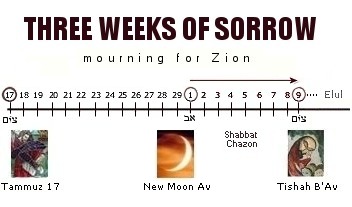 |
Dates During the Three Weeks of Sorrow:
The Folly of the Wicked (פרשת בלק)

07.14.19 (Tammuz 11, 5779) Our Torah reading for this week is named after an ancient Moabite king entitled "Balak" (i.e., בָּלָק, "the destroyer") who sought to curse Israel by hiring the services of a wicked Midianite "prophet" named "Balaam" (i.e., בִּלְעָם, "one set above the people"). It begins this way: "And Balak the son of Zippor saw all that Israel had done to Amalek (e.g., אֱמרִי, the "big talkers") and grew fearful. King Balak's plan was to employ Balaam's sorcery (i.e., kashafut: כַּשָׁפוּת) against the Israelites to prevent them from entering the Promised Land. Similar to the delicious irony that befell the villain Haman in the Book of Esther, however, King Balak's scheme was upended, and the curse he sought to put on the Jewish people was repeatedly pronounced as a blessing by Balaam instead. After several foiled attempts, Balak fretfully dismissed the prophet, but before departing from the dejected king, Balaam ironically prophesied the destruction of the Moabites and the victorious establishment of Israel. Some peoples lives, it seems, are meant to serve as warning of the dangers of self-destruction.... The shameful story of Balaam reveals that "there is no enchantment against Jacob, no divination against Israel" (Num. 23:23). Ein od milvado (אֵין עוֹד מִלְבַדּו) - no weapon or scheme devised against God will ever prosper (Isa. 54:15-17).
But who was this mysterious prophet named Balaam? According to Jewish tradition, Jacob's wicked uncle Laban had a son named Beor (בְּעוֹר), who became the father of Balaam. In other words, the "cursing prophet" Balaam was none other than the grandson of Laban:
 |
Note that the name "Beor" first appears in connection with a king of Edom (Gen. 36:32), which suggests that Balaam might have once been a king of the Edomites (i.e., the descendants of Esau). Further note the phonetic similarity to Peor. If Beor and Peor are the same, then Balaam was actually a prophet of Baal Peor, a local Semitic god.
Balaam was regarded as a great seer, magician and an adept in the occult. He had an "evil eye" and drew the spirit of demons to anything he gazed upon (Avot 5:22). His notoriety made him famous, and powerful people asked him to invoke curses on their enemies. The Talmud (Sanhedrin 106a) states that Balaam became so famous as a magician that he later became a chief advisor to Pharaoh. It was Balaam who advised the new Pharaoh to enslave the Israelites and to afflict them with brutal taskmasters (Exod. 1:8-11). For more information about the identity of Balaam, see the entry entitled, "The Curses of Balaam."
No Good without God...

07.12.19 (Tammuz 9, 5779) As believers in the LORD we must learn to see beyond the temporal to behold the eternal; we must look past the shadows to see the substance. In a sense we have to close our eyes and walk in the darkness of faith to see the supernal light which transcends the atmosphere of this world (2 Cor. 5:7). Faith separates us from the visible and temporal realm (i.e., chayei sha'ah: חיי שעה) before the invisible and eternal realm (i.e., chayei olam: חַיֵּי עוֹלָם); it hears (shema) the "yes" of the LORD in the midst of worldly dissipation and despair. Faith is the heartache, the groaning, and the yearning for undying love. "Whom have I in heaven but you? And there is nothing on earth that I desire besides you. My flesh and my heart may be consumed, but God is the strength of my heart and my portion forever" (Psalm 73:25-26). This world appears to the eye of faith a strange place, and here we are no more than sojourners as we look for our heavenly habitation whose builder and maker is God (Heb. 11:10; John 14:1-3). Our hearts yearn for the unseen good, healing beyond death to life, the realm of promise and blessing and unending grace.
The Torah begins: "In the beginning (בְּרֵאשִׁית) God created the heavens and the earth, and the earth was "tohu va'vohu v'choshekh" (תהוּ וָבהוּ וְחשֶׁךְ) - confusion and emptiness and darkness - which the sages interpret to mean that when we truly understand that God created the heavens and the earth, we will realize our earthy desires to be barren, empty and unreal. In their despair, Plato and the early Greek philosophers sought "timeless universals" which they believed disclosed the reality of an "upper world," a heavenly realm of unchanging goodness, beauty, and truth. The world we experience with our senses is a shadowy place of change and decay; but the real world, discerned by clear thinking, is a place of permanence, goodness and illumination. Likewise the righteous soul trusts that despite this fleeting world that turns to dust, there is an eternal realm, a place of abiding love, and a heavenly home. "For here we have no lasting city, but we seek the city that is to come" (Heb. 13:14). Therefore "we look not to the things that are seen but to the things that are unseen; for the things that are seen are transient (πρόσκαιρος), but the things that are unseen are eternal. For we know that if the tent that is our earthly home is destroyed, we have a building from God, a house not made with hands, eternal in the heavens" (2 Cor. 4:18-5:1). In this world we suffer exile, groaning to be with our Savior, the Source of all blessing: "I say to the LORD, "You are my Lord; I have no good apart from you" (Psalm 16:2).
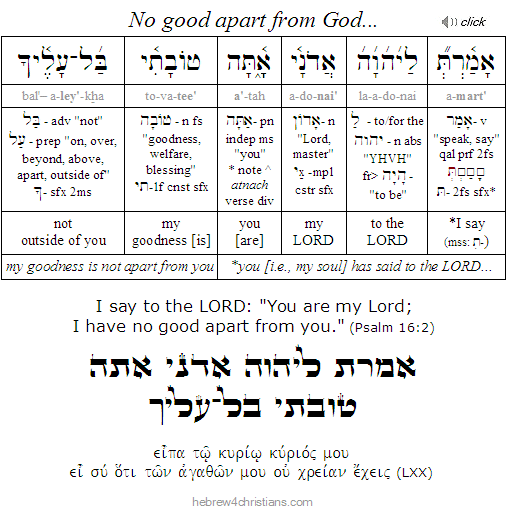 |
Faith (i.e., emunah) is a "double movement" of the heart. It both "sees what is invisible" (2 Cor. 4:18) and understands (i.e., accepts) that the "present form of this world is passing away" (1 Cor. 7:31). Faith rests in God's providential hand over the chaos and flux of creation. The eye of faith beholds the Presence of God and His reign over all the mundane affairs of this world. Indeed, it is only by fixing our hope upon the eternal that we are enabled to rightly apprehend the nature of the temporal world itself. In fact, the word emunah (אֱמוּנָה) shares the same root as the Hebrew word for truth (אֱמֶת). In that sense, "seeing what is invisible" (τὰ μὴ βλεπόμενα) is a more fundamental type of "seeing," since the truth of hope ultimately interprets all other ways of seeing...
Postmodern Religiosity...

[ I wrote the following over a decade ago while thinking about the "postmodern turn..." ]
07.12.19 (Tammuz 9, 5779) Religious sentiment is very often driven by the need to justify one's existence in the universe. After all, the universe itself appears as a brute fact, a seemingly radical contingency. It's just "there," this unapologetic looming monstrosity in which we "live and move and have our being." We see the innumerable stars above us; we experience the sweep of the ocean's expanse; we encounter the "numinous" wonder that accompanies the accidental, the non-necessary, the sheer gratuity of existence itself.
This world. We find ourselves embedded within it, victims of our genetics, collaborators of our own social/economic history, and generally subject to the affairs of the technocratic and political world around us. It is a given. It is immense.
"Why is there something rather than nothing?" asked Heidegger, which is perhaps one of the most fundamental questions we can ask ourselves. After all, unless we are prepared to abandon ourselves to irrationalism (sadly, many of us do), our sanity compels us seek a rational account of the origin of the universe itself... Everyone is a philosopher of sorts; the only difference is that some are clear in their thinking whereas others are muddled...
Some people grow cynical of the haunting questions that beset life in this world and devise affected attitudes of superiority regarding the "stories we tell ourselves." These sorts of "intellectuals" flatter themselves by believing they are able to transcend the overarching questions that arise in response to the "is-ness" of life. Jaded, tired, and yet magically exempted from the frailties that beset us all, they tell us that they are privy to the "inner working" of narrative. Some of these self-styled "chosen" ones will even pretend to be able to see beyond the pathetic periphery of our normal lives to foretell us our future. Sadly enough, their future is entirely bereft of any abiding hope.
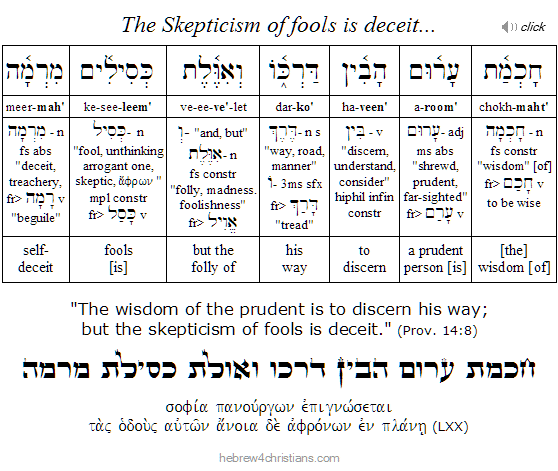 |
Such intellectuals of today (for example, Foucault, Baudrillard, Lyotard, Derrida, Rorty, etc.) are really anti-intellectuals, absurdists, akeptical clowns.... Like charismatic churches steeped in the (unconscious) despair of postmodern thinking, they speak "glossolalia" that only few will be attuned. Despairing of reason and the ability to think clearly about life, these "anti-thinkers" and self-styled anarchists of the hour, have chosen to opt-out of the game, gaining precious little solace by their shared pretense. They are condemned to themselves and, unless they repent, will inherit their own empty souls for eternity.
Unlike those who have abandoned themselves to despair, the religious sentiment seeks some form of self-justification in the world. Rituals, cermonies, mummeries, chants, formulas, etc., are all meant to put a facade on the moral reach within each soul. For the religionist, the law is not only prescriptive, but descriptive. There are "insiders" and "outsiders." There are those who are "righteous" and those who are not.
Perhaps this explains something of the scandal of the gospel. "Those who are well have no need of a physician, but those who are sick. I came not to call the righteous, but sinners" (Mark 2:17). Yeshua was given the epithet "the friend of sinners" by his enemies -- which only proves the greatness of his character. The soferim (scribes) and the perushim (pharisees) were consistently among Yeshua's most ardent opponents. It was bad enough to suggest that their doctoring was suspect ("you can't give away what you don't have"), but it was even more of an affront to suggest that they themselves were spiritual sick...
Look, anyone who believes he or she has the "answer," who is healthy, who "has it together" or is otherwise smug or complacent regarding their inward condition will find themseves in opposition to the truth of Messiah. As Paul said it, "if anyone thinks he is something, when he is nothing, he deceives himself" (Gal 6:3). Human pride must inevitably come to a catastrophic and tragic end. God is patient, but the hands of the clock are always moving... You are now one moment closer to the day of your death.
There is the cross of Yeshua which provides both the verdict and the deliverance, or there is the end of futile imagination - that parasite that feeds on the true language of hope and arrogates it for itself. You can't have it both ways.
 |
Echoes from the Future (הדים מן העתיד)
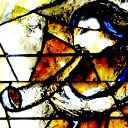
07.12.19 (Tammuz 9, 5779) Yeshua forewarned of the alienation and moral sickness that would pervade mankind just before the time of his return: "Because lawlessness (i.e., ἀνομία, from -α ('not') + νομος, 'torah') will be increased," he said, "the love of many will grow cold (i.e., ψύχομαι, 'be extinguished')" (Matt. 24:12). Note the link between Torah and love: true love requires respect for God's authority, for without that the divine image is disfigured and desecrated. Likewise the Apostle Paul foresaw that the "End of Days" (אַחֲרִית הַיָּמִים) would be a time of peril (καιροὶ χαλεποί) because people would become increasingly narcissistic, self-absorbed, infatuated with their own sense of self-importance, abusive toward others, disrespectful to elders, ungrateful, heartless, unforgiving, without self-control, brutal, treacherous, and so on (2 Tim. 3:1-4). Therefore, in light of the spiritual war that rages all around us, it is vital that we remain firmly rooted in what is real by taking hold of our identity and provision as children of God. "God has not given us the spirit of fear, but of power (גְּבוּרָה / δύναμις) and of love (ἀγάπη), and of a "sound mind" (σωφρονισμός), i.e., a "delivered" mind -- centered and "healed" from inner chaos (2 Tim. 1:7). The name of the LORD (יהוה) means "Presence," and in Him "we live and move and have our being" (Acts 17:28). He is as close as our heart and our very breath (Rom. 10:8). We are not to be troubled like the world that lives in terror of man, nor are we to crave security from the vain devices of mere men. No - we must look to God Almighty, the Master of the Universe. He alone is our Refuge and Defense, the One who gives us steadfast love in the midst of these storms. "Let not your heart be troubled" - God is in control of the whirlwind, friends...
According to orthodox Jewish eschatological tradition, the period of time immediately before the Messiah's arrival is sometimes called ikvot meshicha (עִקְּבוֹת מְשִׁיחַ), the time when the "footsteps of the Messiah" can be heard. Some of the "signs" of this period include the rise of various false prophets, numerous wars and "rumors of wars" (including the rise of Magog: Iran), famines, earthquakes, worldwide apostasy from the faith, persecution, and a globalized sort of godlessness that is revealed in unbridled selfishness, greed, chutzpah (audacity), shamelessness, and a general lack of hakarat ha-tov (gratitude). The greatest sign, however, will be that Israel will exist once again as a sovereign nation, despite the prophesied exile among the nations (Deut. 4:27-31; Jer. 30:1-3). For more on this fascinating subect, see the article "Birthpangs of Messiah."
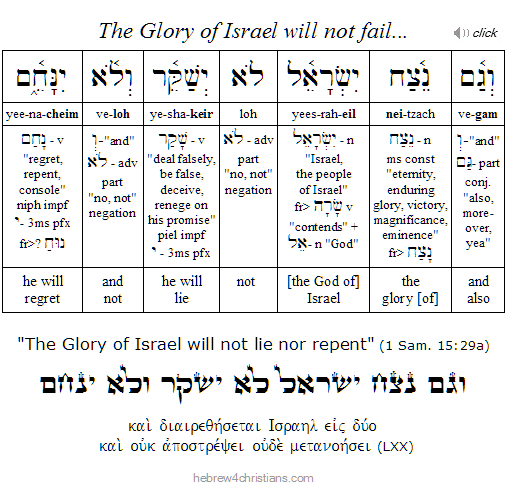 |
Personal Note: I've been sick the last couple days with eye problems (again). I went to an ophthalmologist last week and he saw no sign of infection or other issues, but intermittently my eyes swell and it becomes difficult to see... Thank you for your prayers, friends.
Healing a Divided Heart...

07.12.19 (Tammuz 9, 5779) The walk of faith involves kavanah (כַּוָנָה), or focus; we are to "press on" (διώκω) to hear the upward call of God (Phil. 3:14). The problem for many of us is that we are irresolute, indecisive, and therefore we hesitate... A divided heart is at war within itself, "two-souled" (δίψυχος) and unstable in all its ways (James 1:8). If "purity of heart is to will one thing," then impurity of heart is the result of simultaneously willing two things... It is therefore a state of inner contradiction, of having two separate "minds" or "wills" that hold contrary thoughts or desires. Yeshua said that "a divided house cannot stand." May it please God to heal us of such ambivalence by making our hearts whole, resolute, steadfast, full of conviction, and entirely awake to the glory of His Presence at our right hand (Psalm 16:8). The LORD is always near; he is not far from each one of us. "Draw near to God (ἐγγίσατε τῷ Θεῷ) and he will draw near to you; purify your hearts, you double-minded" (James 4:8). As it is written: "The LORD is near to all who call on Him, to all who call on Him in truth" (Psalm 145:18). May we be set free from lesser fears that divide the heart and rob the soul of shalom shelemah, God's perfect peace...
 |
"Above all, do not lose your desire to walk. Everyday, I walk myself into a state of well-being & walk away from every illness. I have walked myself into my best thoughts, and I know of no thought so burdensome that one cannot walk away from it. But by sitting still, & the more one sits still, the closer one comes to feeling ill. Thus if one just keeps on walking, everything will be all right." ― Søren Kierkegaard
Saved from Death's Sting...

[ The following concerns this week's Torah reading, parashat Chukat... ]
07.11.19 (Tammuz 8, 5779) "Everyone who is bitten, when he sees it, shall live" (Num. 21:8). The fiery serpent – the very sting of which brings death – is what must be looked upon, confronted, and confessed. We must look at that which kills us, and by seeing it, we can then see God's miracle (נֵּס) that delivers us... Therefore we look to the cross – the place where Yeshua clothed himself with our sickness and sin – to realize God's remedy for our eternal healing. As Yeshua explained to Nicodemus, "As Moses lifted up the serpent in the wilderness, so must the Son of Man be lifted up, that whoever believes in him may have eternal life" (John 3:14-15). Humanity as a whole has been "bitten by the snake" and needs to be delivered from its lethal venom. Just as the image made in the likeness of the destroying snake was lifted up for Israel's healing, so the One made in the likeness of sinful flesh (Rom. 8:3) was to be lifted up as the Healer of the world. In Yeshua the miraculous exchange takes place: "For our sake he made him to be sin who knew no sin, so that in him we might become the righteousness of God" (2 Cor. 5:21). Bless His holy name!
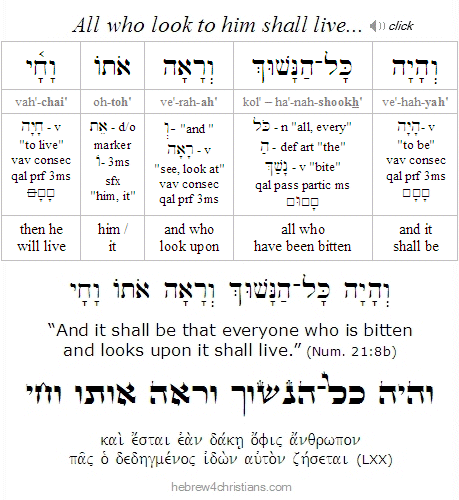 |
 |
Love's Confession...

07.10.19 (Tammuz 7, 5779) It is written in our Scriptures: "The word is very near you (כִּי־קָרוֹב אֵלֶיךָ הַדָּבָר מְאֹ֑ד); it is in your mouth and in your heart, so that you can do it" (Deut. 30:14). What "word" is this other than the confession of faith in the LORD? Faith is the key, since it responds to God's voice and receives the message of hope within the heart... Faith is a matter of the will: of choosing to receive the blessing, accepting that you are accepted, and trusting God's passion for your life. "Consider Abraham; he believed God and it was credited to him as righteousness" (Gal. 3:6). Faith itself is the obedience of Torah, the necessary precondition for all that follows. "I am the LORD your God" (אָנכִי יְהוָה אֱלהֶיךָ) is the very First Commandment. When we turn to the LORD, we esteem him as truthful, just, wise, compassionate, and worthy of our trust. "Faith makes God real to us and real in us; when we honor God, we give everything that a believing heart can give Him" (Luther).
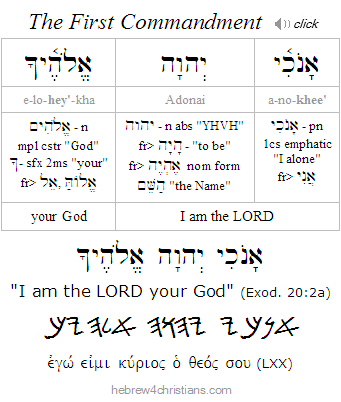 |
The students of the maggid of Zlotchov once asked him, "In the Torah we read that our father Abraham kept all the laws (Gen. 26:5), but how could this be, since they had not yet been given to him?" The maggid replied, "All that is needed is to love God. If you are about to do something and you think it might lessen your love, then you know it's a sin; but if you think it will increase your love, then you know it's in keeping with God's will. That's what Abraham did." Amen. Faith is the confession of God's love. Abraham was justified by faith because he trusted in God's love more than anything else, and that is the essence of Torah. "Now abide faith, hope, love, these three, but the greatest of these is love" (1 Cor. 13:13).
Shadows and Reality...

07.10.19 (Tammuz 7, 5779) Sometimes we lose sight of our true and abiding end... The ancient thinker Socrates argued that philosophy, when done correctly, was "practice for death," since the passing shadows of this world pointed to an unchanging good, our true end. Likewise Yeshua our Messiah taught us to take up the cross and die daily (Luke 9:23). It is difficult for us to die and "let go," however, often because we are deeply attached to this natural realm, and we often abide under the worldly illusion that we will live forever, that tomorrow will resemble today, and that heaven can wait... History is littered with crumbling monuments offered to the idols of this world. The Scriptures are clear, however: "The present form (τὸ σχῆμα) of this world is passing away" (1 Cor. 7:31), and the heart of faith seeks a city whose Designer and Builder is God Himself (Heb. 11:10). "So we do not lose heart. Though our outer self is wasting away, our inner self is being renewed day by day... For the things that are seen are turning to dust, but the things that are unseen endure forever (2 Cor. 4:16-18). Because of our sin, creation was made "subject to vanity," though God has overcome the dust of death by giving us an unshakable hope (Rom. 8:20).
אָדָם לַהֶבֶל דָּמָה
יָמָיו כְּצֵל עוֹבֵר
a·dam · la·he·vel · da·mah
ya·mav · ke·tzel · o·veir

"Man is like a breath;
his days are like a passing shadow."
(Psalm 144:4)
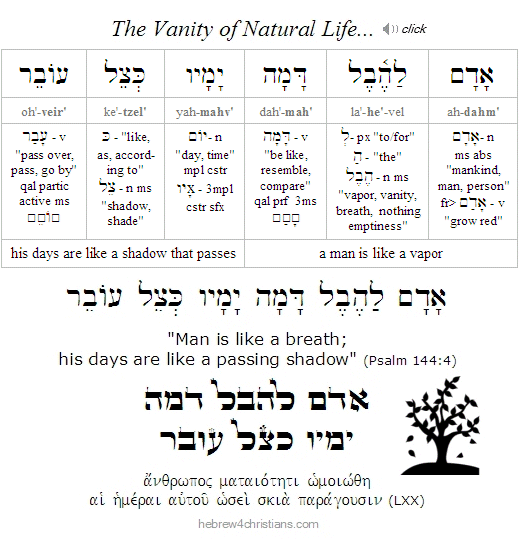
The truth that ha'kol oveir (הַכּל עוֹבֵר), "everything passes" like a shadow, should help us keep our perspective regarding the various moments of testing we all face in this life. As Nachman of Breslov once said, "The whole earth is a very narrow bridge, and the important thing is never to be afraid" (כָּל־הָעוֹלָם כֻּלּוֹ גֶּשֶׁר צַר מְאד וְהָעִקָּר לא לְפַחֵד כְּלָל). Yeshua is the Bridge to the Father, the narrow way of passage that leads to life. He has overcome the meretricious world and its vanities. He calls out to us in the storm saying, "Take heart. It is I; be not afraid" (Matt. 14:27). When Peter answered the call and attempted to walk across the stormy waters, he lost courage and began to sink, but Yeshua immediately took hold of him, saying, "O you of little faith, why did you doubt (lit., think twice)?"
Mother of the Golden Calf...

[ The following concerns this week's Torah reading, parashat Chukat... ]
07.10.19 (Tammuz 7, 5779) Some of the sages, such as Rashi, have said that the ritual of the Red Heifer (פָרָה אֲדֻמָּה) was intended to atone for the sin of the Golden Calf (egel ha-zahav). The Golden Calf represents seeking for life in this finite world, losing sight of the invisible, unnamable, and mysterious Creator and Redeemer. Idolatry expresses our fear of being abandoned in the desert, and impels us to seek for security and comfort in the immediacy of the moment. The ritual of the Red Heifer brings us face to face with our contact with death and offers us purification and healing. The cow itself symbolizes our impulse to idolatry, which must be turned entirely to dust and ash in the fires of God's truth. To this are added cedar, representing our pride, and hyssop, representing our lowliness. A crimson string is added that symbolizes our blood connection and lower nature (דּם). All these are burned together and the ashes mixed with living water to create a holy admixture that heals us from the perversity of death. Ironically, we are cleansed from the "dust and ashes" of death by being sacrificially covered with God's "dust and ashes" given in our place.
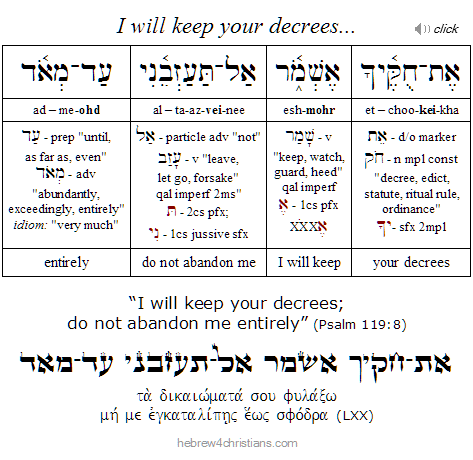 |
 |
Deliverance from Anxiety...

07.09.19 (Tammuz 6, 5779) "Do not be anxious about anything, but in everything by prayer and supplication with thanksgiving let your requests be made known to God" (Phil. 4:6). Note that the verb translated "be anxious" here (i.e.,μεριμνάω) comes from a root word (μερίζω) that means to be fragmented or divided into parts and pieces. Being anxious is therefore the uneasy state of being distracted, unfocused and divided within yourself. When we worry we heed voices of fear and begin to feel 'double-minded,' (i.e., δίψυχος), unstable, and unable to think clearly; we get restless and find it difficult to deeply breathe. We start to feel out of control, fearful that something bad will happen despite all our efforts or wishes to the contrary; we sense doom; we lose heart; we go dark... The Scripture here admonishes us to pray when we are tempted us to be anxious by focusing on something for which we are grateful. Doing so will bring the "peace of God" (שלום יהוה) that rises above all worldly thinking to keep watch over your heart and your thoughts through Yeshua the Messiah (Phil. 4:7). We gain the "light of life," that is, inner illumination from God, so that we can remain steadfast and unmovable in our faith, despite the temptation to look for remedy apart from God for some relief from our struggles.
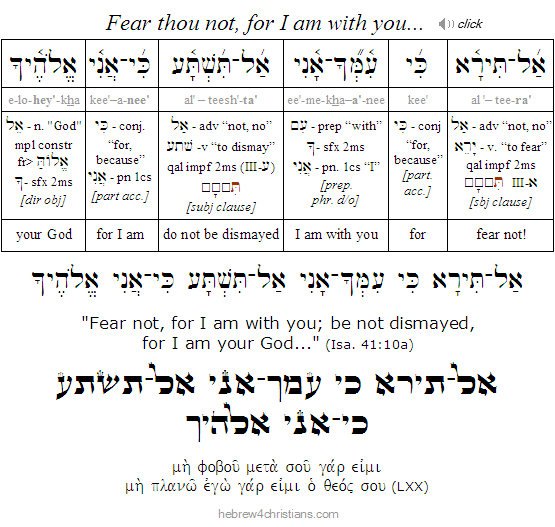 |
 |
Trees of Righteousness (אֵילֵי הַצֶּדֶק)...
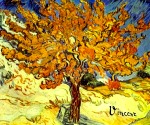
[ The following entry also concerns this week's Torah reading, parashat Chukat... ]
07.08.19 (Tammuz 5, 5779) The ashes of the red heifer represented the death and sacrifice of something extremely rare, valuable, and precious. The ashes were mixed with "living water" (מַיִם חַיִּים) to reveal the truth that though the end of all flesh is but dust and ashes, the Spirit gives cleansing and life. Indeed the word ashes (אֵפֶר) may be rearranged to spell both cure (רַפֵא) and beauty (פְאֵר). The author of the book of Hebrews argues kal va'chomer (i.e., קַל וְחמר, "light and weighty"), that is, "from the lesser case to the greater." If the sprinkling of water mixed with the ashes of a red heifer purified the flesh from contamination with physical death, how much more does the blood of Messiah purify the soul from that which causes spiritual death? (Heb. 9:13-14). Indeed, because of Yeshua's sacrifice we are given "beauty for ashes, the oil of joy for mourning, the garment of praise for the spirit of heaviness," that we may be called "trees of righteousness (אֵילֵי הַצֶּדֶק), the planting of the LORD, that He may be glorified" (Isa. 61:3). Amen. Yehi shem Adonai mevorakh!
 |
The Scarlet Thread (חוּט הַשָּׁנִי)...
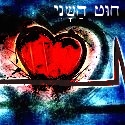
[ The following entry concerns this week's Torah reading, parashat Chukat (Num. 19:1-22:1). Please read the Torah portion to "find your place" here. ]
07.08.19 (Tammuz 5, 5779) It is noteworthy that cedarwood, hyssop, and scarlet thread were used not only for cleansing the leper (Lev. 14) and for cleansing from contact with death (Num. 19), but also during the ratification of the covenant at Sinai (Exod. 24:8; Heb. 9:19-20) and indeed during the crucifixion of our Lord. Of course hyssop (אֵזוֹב) is first mentioned regarding the application of the blood of the lamb upon the doorposts during the Passover (Exod. 12:22), and King David later appealed to God for cleansing saying, "purge me with hyssop, and I shall be clean" (Psalm 51:7). A hyssop branch was also used to offer vinegar to Messiah during the time of his crucifixion (John 19:29). Likewise the wood from a cedar tree (עֵץ אֶרֶז) was used to purify both the leper and those contaminated with death, and it is likely the type of wood used for the cross of Messiah. Finally, scarlet (שָׁנִי) thread symbolizes both blood and royalty, and appears in the birth of Judah's children Zerach and Peretz (Gen. 38:28), in the coverings of the Tabernacle, as a sign of Rahab's faith (Josh 2:8,21), and as the color of the robe of Messiah during his crucifixion (Matt. 27:28).
תְּחַטְּאֵנִי בְאֵזוֹב וְאֶטְהָר
תְּכַבְּסֵנִי וּמִשֶּׁלֶג אַלְבִּין
te·cha·te·ei·nee · ve·e·zohv · ve·et·har
te·kha·be·sei·nee · oo·meei·she·leg · al·been

"Purge me with hyssop, and I shall be clean;
wash me, and I shall be whiter than snow."
(Psalm 51:7)

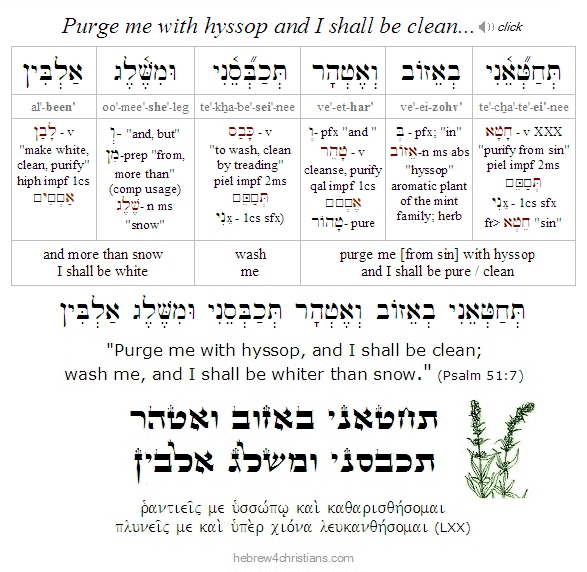
We find cleansing and healing from the LORD: "Come, let us reason together," says the LORD. "Though your sins have stained you like scarlet, you can become white like snow; even though they are red as crimson, they will be like wool" (Isa. 1:18). As our Torah portion this week explains, scarlet (i.e., shani: שָּׁנִי) was one element added to the fire of the red heifer sacrifice to create the purifying waters that were applied by hyssop branches. The Hebrew word for "scarlet" (שני) means "double-dyed," from shanah (שנה), to repeat or double, suggesting the deep stain of sin within the human heart... Scarlet was also added to the running water when the metzora ("leper") was cleansed.
You can follow the "scarlet thread" throughout the Scriptures, from the very first sacrifice of the Lamb in Eden, to the cross of Messiah, to the glory of the "Lamb who was slain" in the book of Revelation (Gen. 3:21; Matt. 27:35; Col. 1:20; Rev. 5:12). In connection with our Torah portion, it is noteworthy that scarlet was the color of Yeshua's robe when bearing our sins (Matt. 27:28), and Yeshua indeed is the perfect fulfillment of the red heifer, the Substance of all its symbolism (Heb. 9:13-14). Like the heifer, Yeshua was completely without sin or defect (2 Cor 5:21; John 8:46); he was sacrificed outside the camp (Heb 13:13); he made Himself sin for us (2 Cor 5:21); his sprinkling makes us clean (1 Pet 1:2; Heb 12:24; Rev 1:5); and the "water of separation" that His sacrifice created is the means by which we are made clean from the impurity of sin (Eph 5:25-6; Heb 10:22). Thank the LORD God of Israel for the eternal cleansing we have in Yeshua our Messiah!
Note: When we consider the symbolism and relevance of the red heifer sacrifice, it is important to clarify our terms... It is overly simplistic for Christians to regard the Torah (תּוֹרָה) using the general term "law." The writings of Moses include a wide range of material, including sacred history, poetry, songs, prophecies, traditions, rituals, commandments, and covenants. In general, the ancient sages divide the Torah into aggadah (stories) and halakhah (legal material), though the legal material is subdivided into chukkim (חֻקִּים), that is, "divine decrees" given without a specified reason, and mishpatim (מִשְׁפָּטִים), or "moral laws" given for a clearly specified reason (an example of the former is the decree of the Red Cow; of the latter, the commandment against stealing). In addition, the Torah includes eidot (עֵדוֹת) or "testimonials" (from the root word, 'ed, "witness") that commemorate events in redemptive history, such as Shabbat, the Passover seder, and the other holidays of the Torah's calendar (i.e., the mo'edim [מוֹעֲדִים], lit. "the appointed witnesses"). For more on this fascinating subject, see "Taryag Mitzvot: A List of the 613 Commandments."
 |
Believe to Understand...
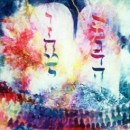
[ The following concerns the foundations of the Torah (yesodei haTorah) and parashat Chukat... ]
07.07.19 (Tammuz 4, 5779) The commandments of God are usually divided between the rational laws (i.e., mishpatim) and the divine decrees (i.e., chukkim), though this distinction is somewhat artificial, since all of the commandments of Torah (and that includes the Torah of the New Covenant) are grounded in the mystery of God's will, which is to say that we are to obey them simply because they derive from the Divine Authority itself... When the people gathered before Moses to receive the covenant at Mount Sinai, they said: "All the LORD has spoken we will do and we will hear" (na'aseh ve'nishmah: נַעֲשֶׂה וְנִשְׁמָע). Note the order: first comes faith in God expressed in the decision to act (na'aseh), and then comes understanding (ve'nishmah). As Yeshua said, "If anyone's will is to do God's will, he will understand" (John 7:17). The heart of faith is willing to do what God asks before hearing (or understanding) what is required. Many people operate the other way round, sitting in judgment of God's word, demanding to understand why they should obey. You cannot understand apart from faith, however, and that is categorically true of all forms of knowledge, which is usually defined as "justified true belief." We are to be "doers of the word and not hearers only, deceiving ourselves" (James 1:22). The Greek verb used in this verse is emphatic: "Be doers!" (γίνεσθε) means "be born!" "Come alive!" "Do, live, and exist before God!" This is a call to creative action, to newness of life...
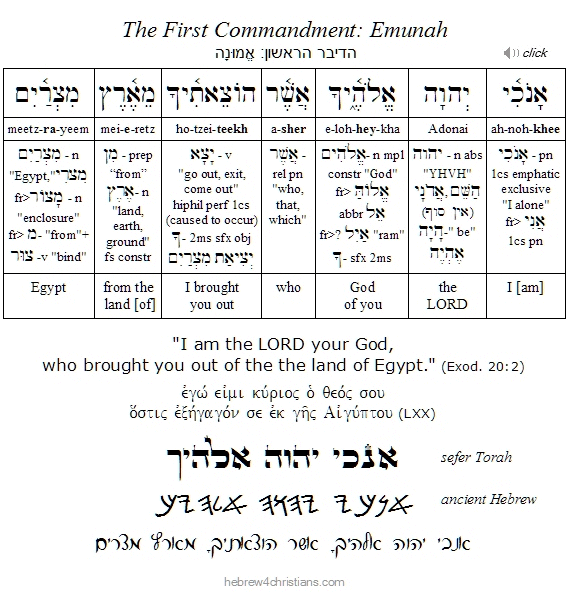 |
The Scriptures state that "if anyone is a hearer of the word and not a doer, he is like a man who looks intently at his natural face in a mirror. For he looks at himself and goes away and at once forgets what he was like" (James 1:23-24). If we just hear the truth but do not act upon it, we are comically likened to someone who carefully looks at his face in a mirror but then promptly forgets what he looks like after he steps away... Likewise those who only hear the word but do not "bring it to life" in their deeds forget who they are and why they were created (Eph. 2:10; Titus 2:14; Col. 1:10). When we look into the mirror of truth we see our need for teshuvah and turn to God for the healing miracle he provides (Heb. 4:12). It's not about doing but being, though being is revealed in doing... If your actions do not align with your values, then back up and recover who you really are in Messiah, understand what your new nature truly is. That is what it means to "take up the yoke" of Messiah, for his yoke is easy (kal) and burden is light, and the task is to repeatedly practice allowing Him to carry your pain, shame, and sin far, far away from your heart.
There is a deeper law, however, a "mirror" that reveals something beyond our passing image. When we look intently into the "perfect law of liberty" (תּוֹרַת הַחֵרוּת וּמַחֲזִיק) - the law of faith, hope, and love for our Savior - we find blessing in our deeds (James 1:25). Note that the verb translated "look into" the law of liberty is the same used when John stooped down to "look inside" the empty tomb of Yeshua (John 20:5). The deeper law reveals the resurrection power of God's invincible love. The Torah of the New Covenant also has many mitzvot, though these are based on the love God gives to us in Yeshua: "This is my Torah: that you love one another as I have loved you" (John 13:34).
 |
The Decree of Torah (חֻקַּת הַתּוֹרָה)

[ The following entry concerns our Torah reading for this week, parashat Chukat... Please note that I have added another "Shavuah Tov" audio for this week as well. Shalom chaverim! ]
07.07.19 (Tammuz 4, 5779) Our Torah portion this week (i.e., parashat Chukat) begins,with the words: zot chukat ha-Torah (זאת חֻקַּת הַתּוֹרָה), "this is the decree of Torah" (Num. 19:2). The language here is both striking and unique, suggesting that what follows, namely, the ritual of the parah adumah or "red heifer," is nothing less than "the seminal decree" of the entire Torah... If we think about the meaning of the mysterious decree of the red heifer, however, we will realize that its ashes were used to create the "waters of separation" (i.e., mei niddah: מֵי נִדָּה) to cleanse people from contact with death (i.e., separation). To fulfill God's vital decree, however, required sacrificial love, since the priest who offered this service would become defiled (separated) for the sake of the healing of others... The Hebrew word for love is ahavah (אַהֲבָה), from a root verb (יָהַב) that means "to give." Love means giving of yourself to benefit another person (John 15:13). The central decree of Torah, then, beyond our ability to rationally understand, is that God's love is so great that it is willing to become dust and ashes on our behalf so that we might find blessing and life. The traditional Jewish interpretation of the meaning of the Red Heifer is a shadow of the Substance in Messiah:
The mitzvah of parah adamah (i.e., the red heifer) represents the suspension of logic in deference to the Divine Will. This attitude is not restricted to this mitzvah. Scripture introduces the mitzvah of the parah adamah with the words "this is the law of the Torah." Surrendering one's own reasoning and accepting the superior reasoning of Hashem is the law of the entire Torah... To the extent that we let go of our own will, we can understand the Divine will. Our ancestors at Sinai understood this ideal when they proclaimed, "we will do and then we will understand." Torah is not beyond our understanding, but we must be willing to make the sacrifices that true Torah understanding demands. - Living Each Day, Rabbi Abraham Twerski
Yeshua willingly became unclean on our behalf - through contact with our sin and death - so that we could become clean (Isa. 53:4, 2 Cor. 5:21, Gal. 3:3, Eph. 5:2, Titus 2:14). The pure became impure through His sacrificial offering. Because of Him, we have been cleansed from our sins "by a better sprinkling" than that which the Tabernacle of Moses could afford (Matt. 26:28, Heb. 9:14, 12:24, Eph. 1:7, 1 Pet. 1:2,18-19, Rom. 5:9; Col. 1:14, 1 John 1:7, etc.).
NEW Shavuah Tov Audio Broadcasts!
In the "Shavuah Tov" audio broadcast for this week I discuss the content of the Torah portion (i.e., Chukat), and particularly consider: 1) the significance of the mysterious Red Heifer (פרה אדומה) sacrifice, 2) the gospel message of the nachash nachoshet (the "bronze serpent"), and 3) the sin of Moses... In last year's audio I go into some discussion regarding the meaning of the mitzvot (commandments) of the written Torah, including the subcategories of chukkim (decrees), mishpatim (rules or judgments), eidot (testimonials, holidays) with a discussion of the oral tradition's corresponding categories of halakhah (oral law) and its subcategories of gezeirot ("fences"), takkanot (case laws), and minhagim (customs). Throughout special attention is given to how Yeshua the Messiah is the Substance and Inner Meaning of all true Torah. It is best to listen to these broadcasts in order:
In connection with our Torah reading for this week, note that the Hebrew word "chok" means a "divine decree," related to a verb meaning "to engrave" (חָקַק). The sages say that the word is directed to a desire to do God's will that is "engraved" upon the heart rather than simply understood with the intellect (2 Cor. 3:3). Indeed the very first time "chok" (חוֹק) appears in the Torah concerns Abraham's obedience of faith as demonstrated by the sacrifice of his beloved son (Gen. 26:5), and the second time concerns the sacrifice of the Passover Lamb of God: "This day shall be for you a memorial day, and you shall keep it as a feast to the LORD; throughout your generations, as an eternal decree (חֻקַּת עוֹלָם), you shall keep it as a feast (Exod. 12:12-13). Because both the Akedah and the sacrifice of the Passover lamb reveal God's yeshuah, his salvation, we are to engrave the significance of our deliverance by the Lamb of God within our hearts forever... Amen, just as God Himself has so engraved us upon his own heart, it is written, "behold, I have engraved you on the palms of my hands" (הֵן עַל־כַּפַּיִם חַקּתִיךְ; Isa. 49:16). Shavuah Tov chaverim!
 |
Why we Delight in Torah...
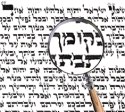
[ "Moses wrote about me..." - Yeshua (John 5:46) ]
07.05.19 (Tammuz 2, 5779) God is not the "author of confusion," and that means that rational intelligibility is foundational to divine revelation. "The Torah was written in the language of men," which is to say, it expresses ideas people can understand. The Scriptures declare: "Blessed is the man who ... delights in the Torah of the LORD (בְּתוֹרַת יְהוָה); all that he does shall prosper" (Psalm 1:1-3). And while it is true that we are no longer 'under' the terms of the covenant given at Sinai (Rom. 3:23), we still delight 'in' the Torah and meditate on its precepts day and night (Psalm 1:2; 19:8; 119:15, 47, 97; Neh. 8:12, etc.). After all, Torah "written upon the heart" is a mark of the New Covenant believer (Jer. 31:31-33). As it is written in Proverbs: "If you seek it [i.e., the wisdom revealed in the Torah] like silver and search for it as for hidden treasures, then you will understand the fear of the LORD and find the knowledge of God" (Prov. 2:4-5).
Furthermore, where it is written, "all Scripture is breathed out by God (θεόπνευστος) and is profitable for teaching, for reproof, for correction, and for training in righteousness, that the man of God may be complete, equipped for every good work" (2 Tim 3:16-17), it is evident that the Scriptures referred to here are the Jewish Scriptures (i.e., the Torah, the Prophets, and the Writings), since they are the foundation, the context, and the overarching matrix for the later New Covenant revelation. These were the Scriptures Yeshua used to contextualize and explain his ministry to his followers: "And beginning with Moses and all the Prophets, he interpreted to them in all the Scriptures the things concerning himself" (Luke 24:27; John 1:45). In other words, the Torah has both a logical, a linguistic, and a theological priority regarding our understanding of the New Testament, and the failure to read in context invariably leads to faulty interpretations and doctrinal errors of various kinds. "To the Jew first, and [then] to the Greek" (Rom. 1:16) is a principle not only of how the gospel message would transcend ethnic Israel to be offered to all the nations, but also about how we should approach the subject of Biblical "hermeneutics." God "breathed out" his revelation in order, and the message itself must be understood in light of that order (John 4:22).
וְהָיָה כְּעֵץ שָׁתוּל עַל־פַּלְגֵי מָיִם
אֲשֶׁר פִּרְיוֹ יִתֵּן בְּעִתּוֹ וְעָלֵהוּ לא־יִבּוֹל
וְכל אֲשֶׁר־יַעֲשֶׂה יַצְלִיחַ
ve·hah·yah · ke·eitz · shah·tool · al-pal·gei · mah·yeem
a·sher · peer·yo · yee·ten · be·ee·toh · ve·a·lei·hu · loh · yee·bohl
ve·khol · a·sher · ya·a·seh · yatz·lee·akh

"The one who delights in Torah is like a tree planted by streams of water
that yields its fruit in its season, and its leaf does not wither.
And all that he or she does shall prosper."
(Psalm 1:3)

Since Yeshua the Messiah is Torah Ha'Emet - the True Torah - we should likewise celebrate the "Joy of Torah" in our lives. He is the Living Torah, the Living Word, written upon our hearts so that we can truly dance and embrace the Truth given from God. Indeed, Yeshua did not come to destroy the Torah but rather to fulfill it in our lives (Matt. 5:17-20).
Matters of Ultimate Concern...

[ The following entry concerns this week's Torah reading, parashat Korach. Please read the Torah portion to "find your place" here. ]
07.05.19 (Tammuz 2, 5779) We read in our Torah portion the terrible fate of Korah and his co-conspirators: "And the earth opened its mouth and swallowed them up" (Num. 16:32), which the sages say metaphorically refers to being consumed by this world and its desires. Life is a serious business, an irrepeatable opportunity. Many trifle their way to the grave, fully unprepared for the shock of the world to come... How few make it the great business of life to prepare themselves "until their change comes" (Job 14:14); how few consciously number their days to obtain a heart of wisdom (Psalm 90:12)? We mustn't fool ourselves by thinking we have a long road ahead before we face who we are at the time of our death (Luke 12:19-21). "No one knows the day or hour," yet it is certain to come, and wisdom bids us be prepared. All must die; there is no escape (Heb. 9:27; Eccl. 8:8). In light of this somber truth, do you reflect on its significance? Have you taken time to see how it will be for you at your death? Allow such thoughts to awaken you from your careless and unwatchful state, and admonish you to lay up treasure in heaven (Matt. 6:20). Considering the vastness of eternity, human life is likened to a mere vapor that quickly passes away (Psalm 103:15-16). It is madness to put off that which is of ultimate concern until the last moment.
אֵין אָדָם שַׁלִּיט בָּרוּחַ לִכְלוֹא אֶת־הָרוּחַ
וְאֵין שִׁלְטוֹן בְּיוֹם הַמָּוֶת
וְאֵין מִשְׁלַחַת בַּמִּלְחָמָה
וְלא־יְמַלֵּט רֶשַׁע אֶת־בְּעָלָיו
ein · ah·dahm · sha·leet · bah·roo·ach · leekh·loh · et · ha·roo·ach
ve·ein · sheel·tohn · be·yohm · ha·mah·vet
ve·ein · meesh·la·chat · ba·meel·chah·mah
ve·lo · ye·ma·leit · re·sha · et · be·ah·lahv

"No man has power to retain the spirit,
or power over the day of death.
There is no discharge from this war,
nor will wickedness deliver those who are given over to it."
(Eccl. 8:8)

Of course dying in the LORD assumes you are really "in Him," that is, that you are a person whose heart is known by Him (1 Cor. 8:3). You can't die in him if you have never lived in him. In this world we learn to die, and as we die in Him, so we will live in him. Resolve this within your heart: "Blessed are the dead who die in the Lord" (Rev. 14:15).
Concerning the prospect of death we are not without hope, of course, since Yeshua has overcome death for us and secured our place in heaven (John 11:25; Heb. 2:9-10). "We must all die; we are like water spilled on the ground, which cannot be gathered up again. But God will not take away life, and he devises means so that the banished one will not remain an outcast" (2 Sam. 14:14). Though physical life inevitably returns us to dust (Heb. 9:27), death does not have the final word, since God wonderfully "devises the means by which the banished are brought back home." If you belong to the Lord, your death is the day of precious homecoming to be with your beloved Savior: "For me to live is Messiah, and to die is gain" (Phil. 1:21). As it is written, "just as we have borne the image of the man of dust, we shall also bear the image of the man of heaven" (1 Cor. 15:49).
Abraham Heschel once wrote, "God is of no importance unless he is of supreme importance." Stated differently, it is impossible to be indifferent toward God. Today we are on the way to face our destiny, even if we suppress this truth through busyness and other distractions. Again, life is a vapor; no one knows the day or hour of death; so we must endeavor to make our peace with God, to serve him in readiness, and so be prepared for whatever may come. Should we deny the reality of our death, we risk wasting our days, being seduced into the mere semblance of life. After all, what is life apart from life in Jesus?
Blaise Pascal once wrote: "I can feel nothing but compassion for those who sincerely lament their doubt, who regard it as the ultimate misfortune, and who, sparing no effort to escape from it, make their search their principal and most serious business. But as for those who spend their lives without a thought for this final end, I view differently. This negligence in the matter where they themselves, their eternity, their all are at stake, fills me more with irritation than pity: yea, it astounds and appalls me... (Pensees, 427). Regarding such need for spiritual sobriety, Kierkegaard comments: "Listen to the cry of a woman in labor at the hour of giving birth - look at the dying man's struggle at his last extremity, and then tell me whether something that begins and ends thus could be intended for enjoyment."
The sages advise: "Repent one day before you die." But who knows the day of one's death in advance? Therefore live each day as if it were to be your last, and may God help you make the decision to "seek the LORD while He may be found; call upon Him while He is near" (Isa. 55:6). Amen. May the LORD quicken these matters to our hearts...
 |
The Gift of your Life...
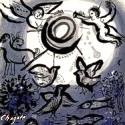
07.05.19 (Tammuz 2, 5779) "For the invisible things of him from the creation of the world are clearly discerned, being understood by the things that are made…" (Rom. 1:20). The very first kindness that God bestows upon you is the miracle of your existence itself, namely, that he "wove you together" in your mother's womb (תְּסֻכֵּנִי בְּבֶטֶן אִמִּי) and brought you into being from nonexistence (Psalm 139:13). This is the gift of life (מַתַּת הַחַיִּים מִן הַשָּׁמַיִם). In Him you "live and move and have your being" (Acts 17:28). You were created b'ahavat olam (בְּאַהֲבַת עוֹלָם), in everlasting love, and indeed God knew you before you were born (בְּטֶרֶם אֶצּוֹרְךָ בַבֶּטֶן יְדַעְתִּיךָ) (Jer. 1:5; 31:3). You are "fearfully and wonderfully made," a unique soul that bears the handiwork of heaven itself. God's love and mercy sustains your days; the LORD compasses you "behind and before" and lays his hand upon you; He knows all your ways (Psalm 139:1-5). Indeed, God prepares a place for you and calls you to join him at the celebration of his love given in Yeshua.
בְּטֶרֶם אֶצּוֹרְךָ בַבֶּטֶן יְדַעְתִּיךָ
וּבְטֶרֶם תֵּצֵא מֵרֶחֶם הִקְדַּשְׁתִּיךָ
be·te'·rem · e·tzohr·kha · va·be'·ten · ye·da·tee'·kha
oo·ve·te'·rem · tei·tzei · me·re'·chem · heek·dash·tee'·kha

"Before I formed you in the belly I knew you,
and before you were born I chose you.
(Jer. 1:5)

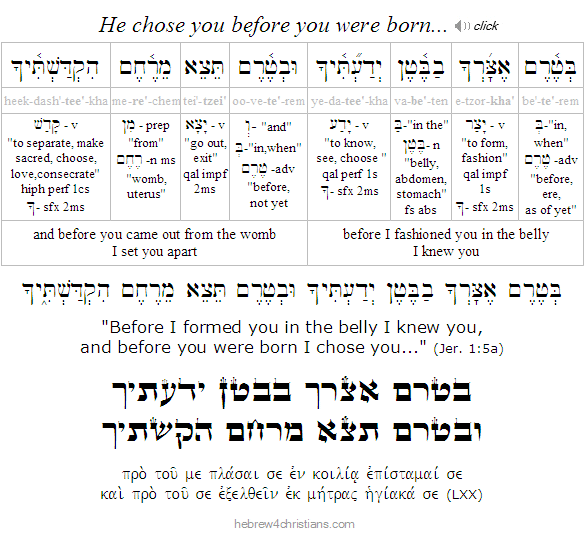
New Audio Podcast:
The Warning of Korach...

07.03.19 (Sivan 30, 5779) Our Torah portion this week (Korach) centers on the rebellion of Korah, a man who questioned God's authority and who arrogantly sought to "intrude" into the office of the priesthood. It is noteworthy that his rebellion is explicitly mentioned only once in the New Testament - in the Book of Jude - as an example of the fate that awaits those false teachers who likewise spurn God's law. False teachers within the church are likewise dangerous because they deny the truth of Torah and redefine our duties before God. Jude identifies them as spiritual impostors who "work from the inside" to confound or obscure the truth of what salvation means. Such a charlatan may appear to be a genuine believer, but he or she aims to sow confusion and sin among God's children; they are the proverbial "wolves in sheep's clothing" (Matt. 7:15). Jude's warning is especially important for us in this present hour because it is foretold that in the time immediately preceding the coming of the Messiah spiritual deception and unbridled godlessness would greatly increase (2 Tim. 3:1-5). At any rate, test the spriits and seek God's face always, dear friends. I sincerely hope this audio broadcast encourages you...
Please click the link(s) below to listen or download:
Freedom of Humility...

07.03.19 (Sivan 30, 5779) "Blessed are the meek, for they shall inherit the earth" (Matt. 5:5). Those conscious of their inner poverty, who mourn over their sinful condition, and who are afflicted with themselves, can let go of the need to "manage appearances," to be in control, or to seek validation from others, and therefore they are free to surrender their lives to God's care. They "flow" with the Father's will as a "gentle breeze," no longer resisting or striving, but simply trusting in God's care. When they are wronged, they seek neither revenge nor vindication, but only restoration (1 Pet. 2:23). Paradoxically, it takes strength to be genuinely "lowly of heart," but such is found in the Spirit of God (Zech. 4:6). Indeed, the Spirit leads us to our inheritance: "the meek shall inherit the land and delight themselves in abundant peace" (Psalm 37:11). The fruit of the Spirit is the outgrowth of God's miraculous life with us, and we partake of that life when we live in Yeshua (John 15:1-5; Gal. 5:22-23).
וַעֲנָוִים יִירְשׁוּ־אָרֶץ
וְהִתְעַנְּגוּ עַל־רב שָׁלוֹם
va·a·na·veem · yeer·shoo - a'·retz
ve·heet·a·ne·goo · al-rohv · sha·lom

"But the meek shall inherit the land
and shall delight themselves in abundant peace."
(Psalm 37:11)

Yeshua quoted this verse when he said, "Blessed are the meek, for they shall inherit the earth" (Matt. 5:5). The word translated "meek" is πραεις (or πραος), perhaps better rendered as humble or lowly. In the Hebrew text of Psalm 37, the word is anavim (עֲנָוִים), usually translated as "lowly ones" (anavah is the Hebrew word for humility). This word does not suggest weakness, but rather the recognition of one's proper place in the universe before God. It is not self-effacing but rather reality-focused. The meek inherit the earth because they are grounded in the truth of reality...
God "opposes the proud but gives grace to the humble" (James 4:6). The LORD our God dwells with those "of a contrite and lowly spirit, to revive the spirit of the lowly, and to revive the heart of the contrite" (Isa. 57:15). True greatness is found in outside of the self, beyond the instincts of the carnal ego. Those who seek to exalt themselves and to "gain the world" do not understand that the very reason for their life is to be sacrificed for the sake of love. Obeying God's call to love is not a burden, but rather sets the heart free. As Yeshua said, "Come to me, all who labor and are heavy laden, and I will give you rest. Take my yoke upon you, and learn from me, for I am gentle and lowly in heart, and you will find rest for your souls. For my yoke is easy, and my burden is light" (Matt. 11:28-30).
In the Jewish tradition, humility is among the greatest of the virtues, as its opposite, pride (i.e., ga'avah: גַּאֲוָה), is among the worst of the vices. God hates the proud of countenance (Prov. 6:16-17). Therefore Moses is described as the most humble of men: "Now the man Moses was very humble, above all the men that were on the face of the earth" (Num. 12:3), and likewise the great patriarch Abraham confessed to God: "Behold now, I have taken upon me to speak unto the Lord, who am but dust and ashes (עָפָר וָאֵפֶר)" (Gen. 18:27).
"He must increase, but I must decrease" (John 3:30). Our aim should not be personal greatness, but humility. Love personal obscurity; rejoice that you are unnoticed by the world and that you are "poor in spirit." Be happy that you are a stranger and sojourner in this world. How blessed are you when God alone is your chief concern!
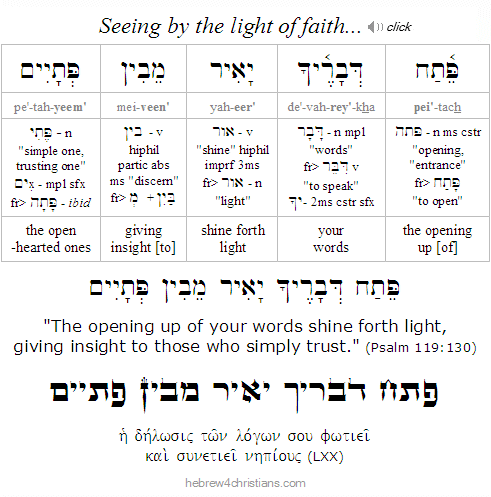 |
 |
The Madness of Envy...
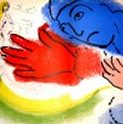
[ The following concerns this week's Torah reading, parashat Korach... ]
07.03.19 (Sivan 30, 5779) The sages asked how it was possible that Korah could have seriously questioned Moses' role as God's appointed leader, and they answered that he became jealous because his cousin was chosen to be the chief of the Levites instead of him. Korah's envy so possessed him that he impugned Moses' leadership, even though he directly witnessed how Moses had miraculously delivered the Israelites from Egypt by the power of the LORD. Such is the terrible, blinding power of envy, a force that is said to "remove a person from the world" (Avot 4:28) into a realm of grandiosity, delusional thinking, and even insanity. Envy derives from the secret fear that you are inadequate, invisible, and unworthy of love, and therefore it often "overcompensates" as preening grandiosity. This explains the psychological "need" to be better than others – making comparisons that alienate and cause suffering. Everyone wants to feel chosen, special, and unique, though God's love is never expressed at the expense of others... "By the grace of God I am what I am" (1 Cor. 15:10). When you begin to understand that God loves you with an everlasting love (אַהֲבַת עוֹלָם), you will no longer want to compare yourself to others...
Note: For more on this subject see, "The Madness of Korah."
 |
Finding the Heart of Life...

07.03.19 (Sivan 30, 5779) It is written in our Scriptures: "There is no fear in love, but perfect love (i.e. ha'ahavah ha'shelemah: הָאַהֲבָה הַשְּׁלֵמָה) casts out fear" (1 John 4:18), and therefore the Spirit of God encourages us to press forward in trust. When we are afraid, we are believing the lie there is something beyond God's control or reach, and therefore God is "not enough"... In times of testing you must remind yourself of what is real. God formed you in your mother's womb, breathed into you nishmat chayim, the breath of life, and numbers all your days... Every breath you take, every heartbeat in your chest is ordained from heaven, and indeed, there is not a moment of your life apart from God's sovereign and sustaining grace. So what, then, are you afraid of? Dying? Judgment in the world to come? Being left unloved, bereft of home, abandoned, consigned to outer darkness? King David said, "If I make my bed in Hell, behold, you are there" (Psalm 139:8). Look, the LORD God is not only present in your "happy moments," when you feel "put together" and respectable, but he is present in your desperate moments, in your hunger, your thirst, and in your secrets. May we never lose sight of God's love, especially in times of distress and trouble, since we trust that he is always working all things together for our ultimate good (Rom. 8:28). As it is written: "The one who finds [God's] heart loves his soul; the one who guards understanding finds blessing" (Prov. 19:8).
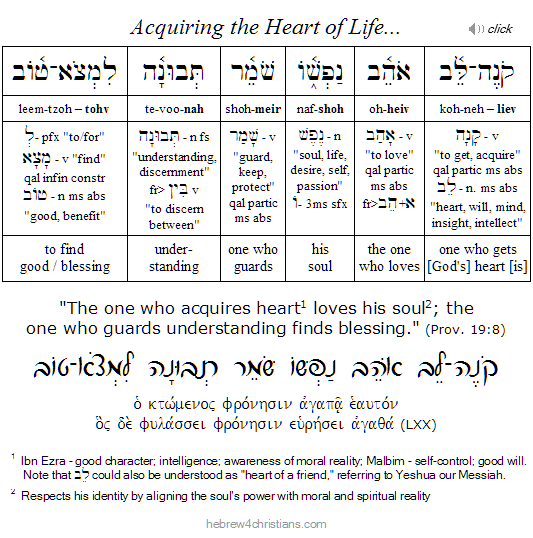 |
 |
The Projection of Korah...
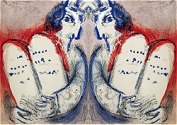
07.02.19 (Sivan 29, 5779) In our Torah reading this week (i.e., parashat Korach), Moses' cousin Korah accused Moses of self-aggrandizement and superiority by saying, "Why do you exalt yourself above the assembly of the LORD? ... Is it a small thing that you have brought us up out of a land flowing with milk and honey to kill us in the desert, that you also make yourself a prince over us?" (Num. 16:3,13). The Talmud comments: "One who seeks to disqualify another projects his own defects upon him." Korah's own self-exaltation and vanity led him to suppose that Moses was likewise proud and vain. His envy so twisted his perspective that he saw good as bad and bad as good. For him Egypt was the land "flowing with milk and honey" and Moses - not Pharaoh - was the real tyrant! In this connection the sages have said that other people serve as mirrors, and the defects we see in them reflect our own. Korah needed to see that his envy of Moses was rooted in fear, and that healing would come if he would let go and trust that God was in control of his life.
We can learn from the madness of Korah -- as well as his terrible end... "As you judge another you condemn yourself, for you that judge do the same things" (Rom. 2:1). How you react to another person reveals what is within your own heart, and this provides the opportunity to find healing by doing teshuvah and extending compassion to yourself. When you condemn another you are hurting yourself, after all. It is not a matter of factual truth as much as it is of the truth of hope and love. As we forgive others, so we find our own forgiveness (Luke 6:37), but if we insist on our rights, we find ourselves in hell... Fire offered falsely will be answered by the fire of God's judgment.
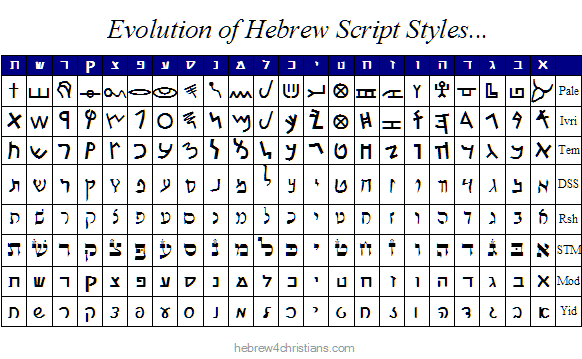 |
 |
The Narrow Door...

07.02.19 (Sivan 29, 5779) "Make every effort to enter through the narrow door, because many, I tell you, will seek to enter but will not be able" (Luke 13:24). The narrow door is the way of humility, assuming a low position, crawling, if you will, and making yourself small... It is the way of the cross of Messiah, confessing the truth of our condition and trusting in God alone for deliverance.. The narrow door is the way of faith - trusting God's compassion and righteousness given on your behalf. The large, wide-open door is designed for the crowd and its various idols. Beware of the world that seeks to assimilate the soul: beware of becoming part of the crowd! The individual is lost and overwhelmed in the midst of the crowd and its momentum. The crowd assimilates the soul, laughs at the notion of individual responsibility, and abandons itself to the gravity of purely natural forces... The life of faith, on the other hand, refuses to regard the individual human heart as a triviality. Faith is an individual struggle, a walk into unknowing; it is the way of the sojourner who feels uneasy in this world of shadows... God is always with us and helps us stay strong and resolute, even as we struggle through the darkness of this age. Press on, chaverim! Do not lose sight of your high calling in Yeshua. The day and the hour draw near!
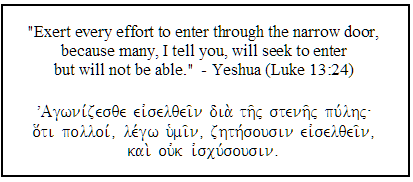 |
 |
Footsteps of the Messiah (עִקְּבוֹת מְשִׁיחַ)

07.02.19 (Sivan 29, 5779) Since our political age is marked more than ever by syncretism and politically correct forms of coercion (i.e., violence), we must understand and value the life of the authentic individual, that is, the person of faith who is marked by moral courage and integrity that transcends the indoctrination and stupor inculcated by mass media and its relentless propaganda.... It is as common as a coin of the realm to see the schemes of various "change agents" fabricating problems in order to move the social order according their agendas. Indeed this is the age of engineered terror, the antithesis of which is not some nebulous "freedom" as suggested from the princes of this world, but rather a new form of slavery unlike anything before seen on this earth. It behooves us not to look to the usual suspects -- and never to forget the role of the crowd in Nazi Germany...
Find comfort, friend of Yeshua. Of this evil world it is written, "Why do the people rage and the nations devise schemes that will fail? The kings of the earth set themselves, and the rulers take counsel together, against the LORD and against his Messiah saying, 'Let us tear off the shackles of their yoke, and throw off their ropes from us!' But the enthroned LORD laughs at their insolence and holds them in derision, until the appointed hour when He will speak to them in his wrath and terrify them in his fury" (Psalm 2:1-5). Amen, amen! καὶ αὕτη ἐστὶν ἡ νίκη ἡ νικήσασα τὸν κόσμον, ἡ πίστις ἡμῶν - "This is the victory that overcomes this world, even our faith" (1 John 5:4).
The LORD God Almighty will surely break the pride of the "kings of the earth" with a rod of iron and dash them in pieces like a potter's vessel, and the shattering will be so ruthless that among its fragments not a shard will be found with which to take fire from the hearth, or to dip up water out of the cistern (Psalm 2:9; Isa. 30:14). For from His mouth comes a sharp sword with which to strike down the nations, and He will rule them with a rod of iron. He will tread the winepress of the fury of the wrath of God the Almighty (Rev. 19:15). "As you looked, a stone was cut out by no human hand, and it struck the image on its feet of iron and clay, breaking them in pieces. Then the iron, the clay, the bronze, the silver, and the gold, all together were broken in pieces, and became like the chaff of the summer threshing floors; and the wind carried them away, so that not a trace of them could be found. But the stone that struck the image became a great mountain and filled the whole earth" (Dan. 2:34-35). "And the God of heaven will set up a kingdom that shall never be destroyed ... and it shall stand forever" (Dan. 2:44). One day the edifice of man's godless pride will come crashing down, and there will be no trace left of its rubble... The day and the hour draws near.
The prophet Isaiah foresaw the glory of the Coming Kingdom: "It shall come to pass in the latter days that the mountain of the house of the LORD shall be established as the highest of the mountains, and shall be lifted up above the hills; and all the nations shall flow to it, and many peoples shall come, and say: "Come, let us go up to the mountain of the LORD (הַר־יְהוָה), to the house of the God of Jacob (בֵּית אֱלהֵי יַעֲקב), that he may teach us his ways and that we may walk in his paths." For out of Zion shall go the law, and the word of the LORD from Jerusalem. He shall judge between the nations, and shall decide disputes for many peoples; and they shall beat their swords into plowshares, and their spears into pruning hooks; nation shall not lift up sword against nation, neither shall they learn war anymore" (Isa. 2:2-4; see also Jer. 3:17, Micah 4:1, etc.).
Before this glorious time of the Millennial Kingdom, however, the great "Day of the LORD" will come - a time of worldwide, catastrophic judgment that will befall the kings and princes of this world... "The great day of the LORD is near, it is near and hastening quickly; the sound of the day of the LORD is bitter; the mighty man will cry loud there" (Zeph. 1:14).
In light of all this, we must be be careful not to love this world or the things of this world (1 John 2:15). The kingdom of man is at war with the kingdom of God, and whoever wishes to be a "friend" of this evil world makes himself an enemy of God (James 4:4). Regarding this doomed world the LORD speaks thus to His children: "Come out of the midst of her and be ye separate, lest you take part in her sins, lest you share in her plagues." This call to be separate may be more difficult for those who live in the midst of present-day "Babylon" than in other places of the world, because in Babylon it is far too easy to coddle the flesh and to avoid taking a costly stand for the truth... However, the reign of Babylon is spreading like a cancer throughout the world, consolidating power, and soon it will demand complete allegiance of all who dwell upon the earth. During that time of tribulation, all the peoples of the world will be forced to chose whether to accept the "mark of the beast" (i.e., citizenship in world order) or to face persecution, etc. Adonai oz le'amo yiten (יְהוָה עז לְעַמּוֹ יִתֵּן) - May the LORD protect and strengthen His people.
יְהוָה עז לְעַמּוֹ יִתֵּן
יְהוָה יְבָרֵךְ אֶת־עַמּוֹ בַשָּׁלוֹם
Adonai · ohz · le·am·mo · yee·tein
Adonai · ye·va·rekih · et · am·mo · va·sha·lom

"The LORD will give strength to his people;
The LORD will bless his people with peace."
(Psalm 29:11)

Hebrew Study Card
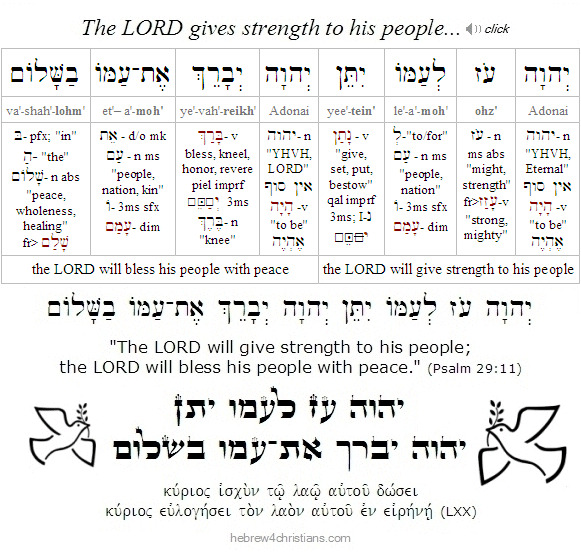
Hebrew Nouns Note: In Biblical Hebrew, the state of a noun may be either "absolute" or "construct." The absolute form of a noun is simply its standard lexical form, that is, the normal form of the noun (whether it is masculine, feminine, plural, dual, and so on), whereas the "construct state" concerns the spelling of the noun when it is used in a construct chain, that is, when it expresses a grammatically possessive relationship to one or more other nouns to which it is joined. Typically I will abbreviate the absolute state of a noun using "abs," and the construct state using "constr."
 |
In general Hebrew uses endings (sufformatives) to indicate these various properties of nouns. By learning the root of the noun and its endings, you will begin to understand the way nouns function in Hebrew sentences.
When first learning a Hebrew noun, I recommend writing out a flashcard with the gender, singular form, plural form, and the construct forms on the front, with the definition on the back. You might also want to include a sentence (or Bible verse) that uses the noun in your definition. For example:
The Torah of Korah...

[ The following entry concerns this week's Torah reading, parashat Korach... ]
07.02.19 (Sivan 29, 5779) The example of Korah is a severe warning for us not to transgress what God has ordained lest we incur severe judgment... In this connection let me remind you that the terms of the New Covenant (בְּרִית חֲדָשָׁה) are non-negotiable, and those who attempt to come to God apart from the cross - that is, apart from the shed blood of Messiah for atonement - likewise encroach upon the Divine Presence. Indeed, in the Book of Galatians, Paul invoked a divine curse on anyone who denied that the work of Yeshua is entirely sufficient for the trusting sinner to be justified and declared righteous by God (Gal. 1:8-9). Those who therefore claim that "something more" is needed than the finished work of Messiah (e.g., circumcision, law-keeping, religious observances, mystical experiences, etc.) remain under the curse (חֵרֶם) demanded by the law (Gal. 3:10; John 3:36). This is not a mere difference of opinion regarding how people are "justified" before God, since Paul goes on to make the case that those who teach otherwise are not truly saved -- even if they should profess that Yeshua is the true Messiah and Savior of Israel! Therefore Messianic teachers who falsely claim that Christians must "follow the law" to be made right with God are liable to the curse of the law. These people are not simply misinformed; according to Paul and the witness of the Holy Spirit, they are actually lost souls. "Beware of the leaven of the Pharisees," chaverim...
It's been wisely said that we must "unlearn" a lot during the days of our sojourn in this world, and that is especially true for people who still assume that they know something about life. "If anyone imagines that he knows something, he does not yet know as he needs to know" (1 Cor. 8:2). And it is also true, I'm afraid, for religious people, that is, for those who regard spirituality as a litany of "do's and don'ts" or a recipe of rituals rather than as receiving the miracle of new life given to us by the miracle of God.
"Anyone who has set aside the law of Moses (תּוֹרַת משֶׁה) dies without mercy on the evidence of two or three witnesses. How much worse punishment, do you think, will be deserved by the one who has trampled underfoot the Son of God, and has profaned the blood of the covenant (דַּם הַבְּרִית) by which he was sanctified, and has outraged the Spirit of grace?" - Heb. 10:28-29
The Faces of Life...
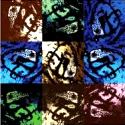
07.01.19 (Sivan 28, 5779) The Hebrew word for "face" is panim (פָּנִים), a term that is grammatically plural, which suggests that there is no single "face" or appearance that can fully define or express the essence of a person. Just as your soul (נְשָׁמָה) is a unity that contains a multiplicity of changes yet remains a distinct identity, so there is an "inward face" that abides the outer expressions. Indeed, the Hebrew word for "inside" is penim (פְּנִים), which is spelled exactly the same as the word for "face."
The word panim itself comes from panah (פָּנָה), a verb meaning "to turn." The Hebrew preposition "before" is lifnei (לִפְנֵי), from the same root, which literally means "turning toward" or "facing" something. This suggests that we have to consider different angles or perspectives and be careful not to jump to conclusions or to make superficial judgments about others. We have to turn in empathy toward others. The Torah says we are to judge be'tzedek (בְּצֶדֶק), that is, with righteousness, by using a "good eye," by giving the benefit of the doubt to others, and by exercising kindness (Lev. 19:15). As Yeshua said, "Do not judge by appearances, but judge righteous judgment" (John 7:24).
"Why do you see the speck in your brother's eye, but you don't notice the log in your own?" (Matt. 7:4). The Baal Shem Tov is reported to have said, "It is not good to be alone, for one cannot know one's own defects. Other people are mirrors, in which you can discover your own flaws by observing the acts you dislike in them. In fact, it is only because you share them yourself in some degree that you are able to see another person's flaws." May it be Thy will, Lord and God of our fathers, to remove all barriers between us, and endow us with the vision to see the good in all people, and overlook their defects. Amen.
In the great "three-in-one blessing" known as birkat kohanim (Num. 6:24-26), the LORD is asked to shine the light of His face upon us (פָּנָיו אֵלֶיךָ), and to lift up His face to behold us in love... The two "faces" here represent the loving countenance of the Divine Presence and our own face turned toward His loving gaze. Therefore the most intimate connection with the LORD is described as being panim el panim (פָּנִים אֶל־פָּנִים), being "face to face" with God. The LORD is the One who sees the "face beneath the face" in our hearts, and that face ultimately is that of Yeshua Himself: "And we all, with unveiled face, beholding the glory of the Lord, are being transformed into the same image from one degree of glory to another. For this comes from the Lord who is the Spirit" (2 Cor. 3:18). "For God, who said, "Let light shine out of darkness," has shone in our hearts to give the light of the knowledge of the glory of God in the face of Yeshua the Messiah" (2 Cor. 4:6). Let us therefore come boldly (i.e., without pretense) before the Throne of Grace, that we may obtain mercy and find grace to help in our time of need" (Heb. 4:16).
עֲנֵנִי יְהוָה כִּי־טוֹב חַסְדֶּךָ
כְּרב רַחֲמֶיךָ פְּנֵה אֵלָי
a·nei·nee · Adonai · kee-tohv · chas·de·kha
ke·rohv · ra·cha·me·kha · pe·neih · e·lai

"Answer me, O LORD, for precious is your love;
in the greatness of your compassion turn to me."
(Psalm 69:16)

Turning to the Light...

07.01.19 (Sivan 28, 5779) It is written in Kohelet: הֶחָכָם עֵינָיו בְּראשׁוֹ - "the wise person's eyes are in his head," וְהַכְּסִיל בַּחשֶׁךְ הוֹלֵךְ- "but the arrogant person walks in darkness" (Eccl. 2:14). The sages here comment that the wise one always looks to the Divine Presence, taking heed to "know what is above: a seeing eye, a listening ear, and all your deeds being inscribed in a book" (Avot 2:1). The wise person keeps God in his thoughts and the light of Truth illuminates his understanding. This is the way of teshuvah – turning our affections and thoughts heavenward at all times. The Scriptures speak to the heart of faith: "You are standing this day before the Lord your God" (Deut. 29:10), and therefore may we know before Whom we stand and may we be filled with the light of divine truth. Amen.
זָרַח בַּחשֶׁךְ אוֹר לַיְשָׁרִים
חַנּוּן וְרַחוּם וְצַדִּיק
zah·rach · ba·choh·shekh · ohr · la·ye·shah·reem
chan·noon · ve·ra·choom · ve·tzad·deek

"Light shines in the darkness for the upright;
He is gracious, merciful, and righteous."
(Psalm 112:4)

Hebrew Study Card
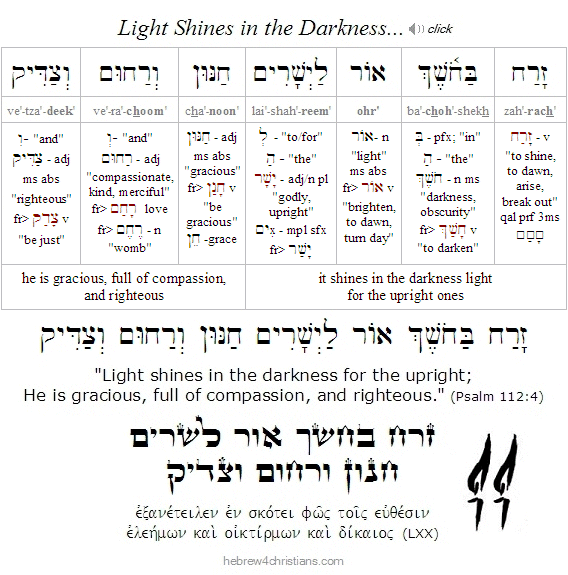
The Hebrew word for education is chinukh (חִנוּךְ), a word that shares the same root as the word for "dedication" (i.e., chanukah: חֲנוּכָּה). True education of the Scriptures is therefore foundational to being a student of the Messiah. All disciples of Yeshua are called "students," or talmidim (תּלמידים), a word that comes from lamad (למד) meaning "to learn" (the study of Scripture is called talmud Torah (תּלמוּד תּוֹרה) from the same root). Among other things, then, following Yeshua means becoming a dedicated student of the Scriptures that He loved and fulfilled (Matt. 5:17-18; Luke 24:44-45). Only after learning the truth of the Scriptures will you be equipped to "go to all the nations and teach" others (Matt. 28:19). This is accomplished not merely by explaining (propositional) doctrine but by kiddush HaShem -- sanctifying the LORD in our lives (1 Pet. 1:15-16). As the sages noted long ago: "Upon three things the world does stand: upon the Torah (truth), upon worship, and upon acts of lovingkindness" (Avot 1:2). We are called to be a "living letter" sent to the world to be "read" (2 Cor. 3:2-3).
Breath of All Flesh...

07.01.19 (Sivan 28, 5779) A verse from this week's Torah (i.e., Korach) reveals another great Name of God: Elohei ha-ruchot lekhol basar (אֱלהֵי הָרוּחת לְכָל־בָּשָׂר), which can be translated "the God of the breath of all flesh" (Num. 16:22). The LORD is the Source of your breath, the One who exhales to you nishmat chayim (נִשְׁמַת חַיִּים), the "breath of life" that enables you to live (Job 12:10). The sages use the analogy of a glassblower who creates a glass vessel. Just as the glassblower blows into a tube to form a vessel from molten glass, so the breath (i.e., neshamah: נְשָׁמָה) that comes from the LORD functions as spirit (i.e., ruach: רוּחַ) that forms and fills the human soul (i.e., nefesh: נֶפֶשׁ). Note that the Name YHVH (יהוה) first appears in this connection (Gen. 2:7), a Name that means "God is Present" (Exod. 3:14) and "God is Mercy" (Exod. 34:6-7). Note also that each letter of the Name YHVH represents a vowel sound (i.e., breath), suggesting that God's Spirit is as close as your very next breath. Like the wind that cannot be seen, so is the spirit the essential part of your identity. Yeshua breathed on his followers and said, "Receive the Holy Spirit" (John 20:22).
The special Name Elohei ha-ruchot lekhol basar appears only one other place in the Torah. After accepting the fact that he would soon die and therefore be unable to finally lead the people into the promised land, Moses prayed: "Let the LORD (יהוה), "the God of the spirits of all flesh" (אֱלהֵי הָרוּחת לְכָל־בָּשָׂר), appoint a man over the congregation who shall go out before them and come in before them, who shall lead them out and bring them in, that the congregation of the LORD may not be as sheep that have no shepherd." So the LORD said to Moses, "Take Joshua the son of Nun (יְהוֹשֻׁעַ בִּן־נוּן, lit. "son of life"), a man in whom is the Spirit (רוּח), and lay your hand on him" (Num. 27:16-18).
The Talmud notes that the word Nun (נוּן) means "fish," a symbol of activity and life. Joshua, the chosen one who succeeded Moses and led the people into the Promised Land, was the "Son of Life" - a clear picture of Yeshua our Messiah, the "spirit-filled good Shepherd" who would lay down His life for the sheep (John 10:11). The LORD is indeed the "God of the breath of all flesh." When Yeshua cried out, "It is finished" and breathed his last breath as He died for our sins upon the cross, the greatest exhalation of the Spirit occurred, the greatest sigh, the greatest utterance was ever declared. The sacrificial death of Yeshua for our deliverance was God's final word of love breathed out to those who are trusting in Him.
 |
|
































































